The rituals that have historically taken place for Inauguration Day — the Inaugural Address, the Inaugural Parade, the Inaugural Balls— are in some ways mostly pomp and circumstance. Many of the events marking the Inauguration of Joe Biden on Jan. 20, however, had to be reconfigured due to restrictions on large gatherings during the COVID-19 pandemic and amid security concerns following the Jan. 6 attack on the U.S. Capitol by a pro-Trump mob.
Inauguration Day is also a crucial moment in American democracy, a celebration of the peaceful transfer of power even in the most divided of times.
It has also been, over the years, the occasion for plenty else, from weather problems and missing Bibles to do-overs and not a few live animals. There were even some dead ones, too.
Get your history fix in one place: sign up for the weekly TIME History newsletter
Here’s a look back at something to know about every single Inauguration Day in American history, as well as a look at what each President said on that all-important event. (A good resource to find the full text of each inaugural address is the American Presidency Project at the University of California, Santa Barbara.)
The following nine swearing-in ceremonies are not included, as they were not regularly scheduled Inaugural festivities—and, in fact, were hardly festive at all, given the circumstances: John Tyler in April of 1841 following the death of William Henry Harrison, Millard Fillmore in July of 1850 following the death of Zachary Taylor, Andrew Johnson in April of 1865 following the assassination of Abraham Lincoln, Chester A. Arthur in September of 1881 following the assassination of James Garfield, Theodore Roosevelt in September of 1901 following the assassination of William McKinley, Calvin Coolidge in August of 1923 following the death of Warren Harding, Harry S. Truman in April of 1945 following the death of Franklin Roosevelt, Lyndon Johnson in November of 1963 following the assassination of John F. Kennedy and Gerald Ford in August of 1974 following the resignation of Richard Nixon.
1789
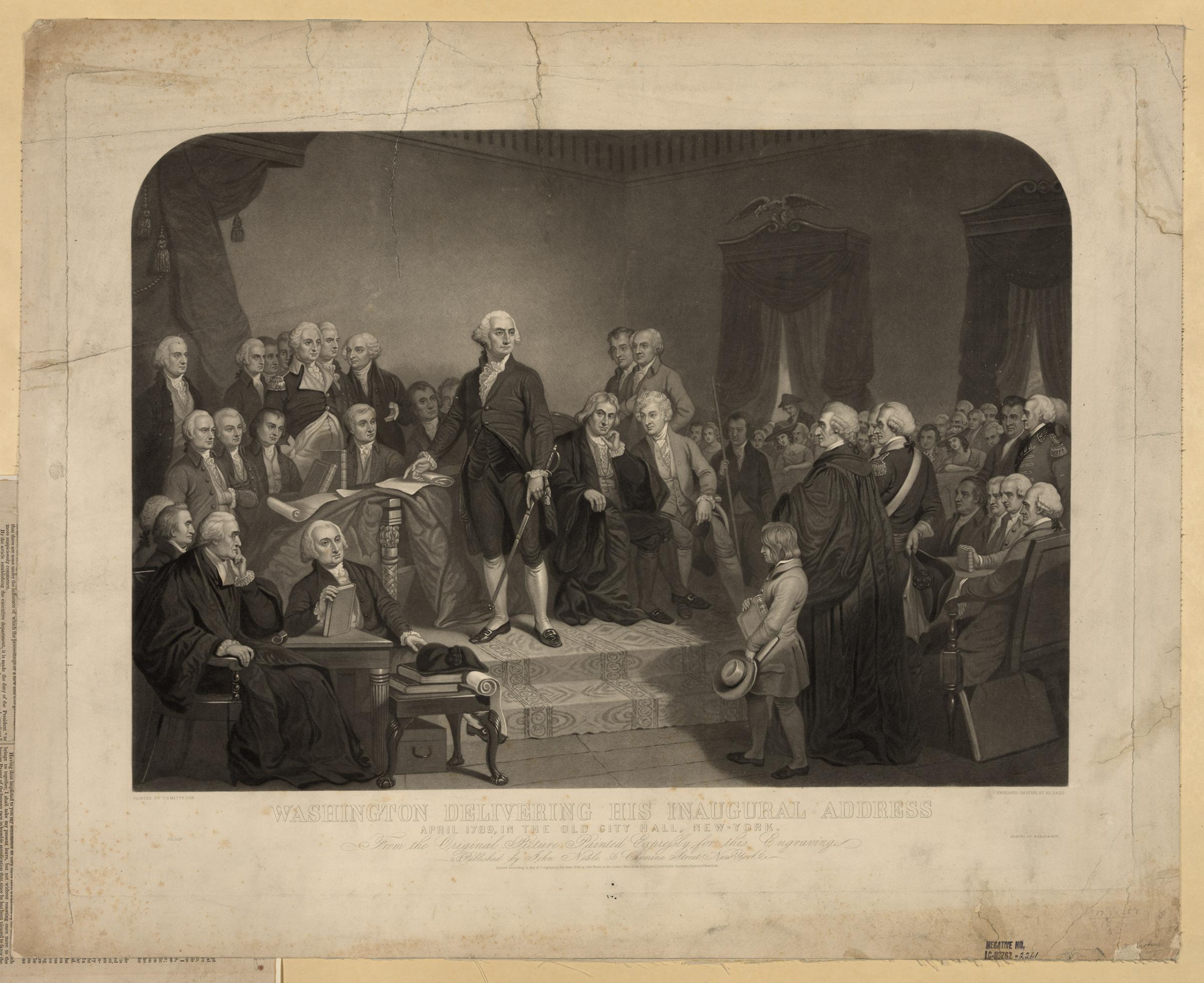
President: George Washington
Date: April 30, 1789
What happened: When organizers forgot to bring a Bible for the 1789 swearing-in, George Washington had to borrow one from a Masonic lodge.
What he said: “Among the vicissitudes incident to life no event could have filled me with greater anxieties than that of which the notification was transmitted by your order, and received on the 14th day of the present month. On the one hand, I was summoned by my country, whose voice I can never hear but with veneration and love, from a retreat which I had chosen with the fondest predilection… On the other hand, the magnitude and difficulty of the trust to which the voice of my country called me, being sufficient to awaken in the wisest and most experienced of her citizens a distrustful scrutiny into his qualifications, could not but overwhelm with despondence one who (inheriting inferior endowments from nature and unpracticed in the duties of civil administration) ought to be peculiarly conscious of his own deficiencies.”
1793
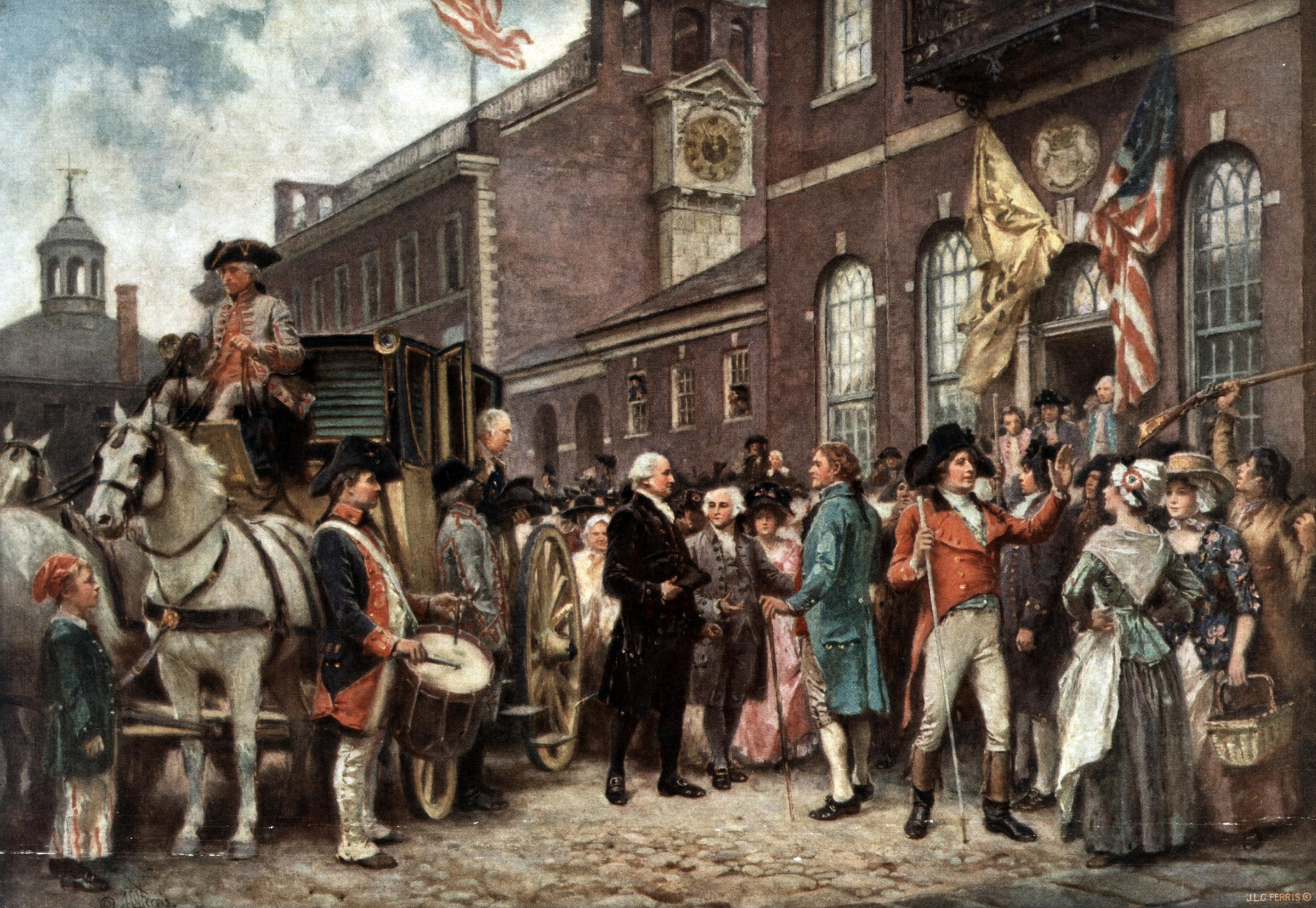
President: George Washington
Date: March 4, 1793
What happened: At 135 words, Washington’s second inaugural address remains the shortest on record.
What he said: “I am again called upon by the voice of my country to execute the functions of its Chief Magistrate. When the occasion proper for it shall arrive, I shall endeavor to express the high sense I entertain of this distinguished honor, and of the confidence which has been reposed in me by the people of united America.”
1797
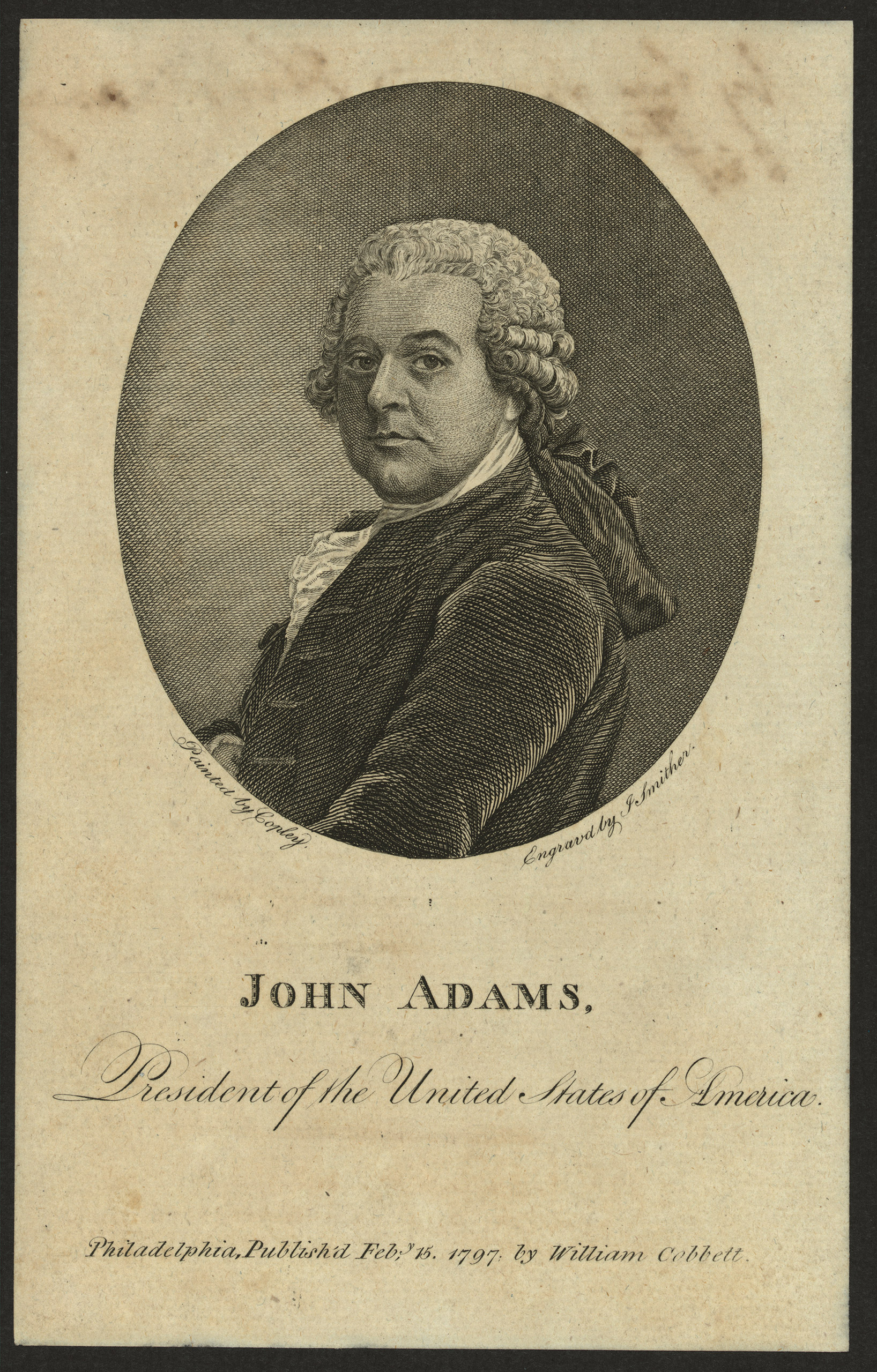
President: John Adams
Date: March 4, 1797
What happened: Adams was the first President to be sworn in by a Chief Justice of the Supreme Court.
What he said: “If national pride is ever justifiable or excusable it is when it springs, not from power or riches, grandeur or glory, but from conviction of national innocence, information, and benevolence. In the midst of these pleasing ideas we should be unfaithful to ourselves if we should ever lose sight of the danger to our liberties if anything partial or extraneous should infect the purity of our free, fair, virtuous, and independent elections.”
1801
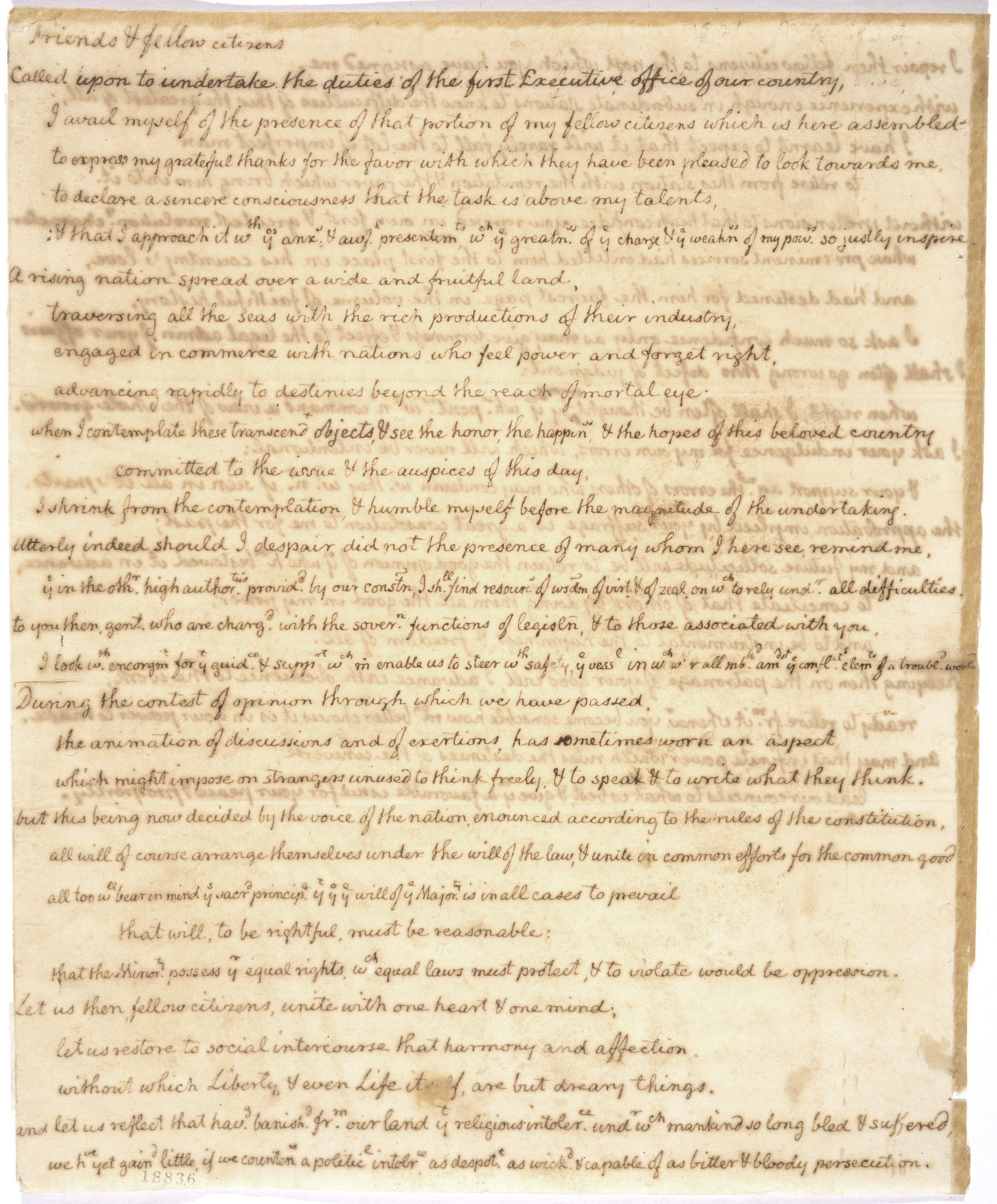
President: Thomas Jefferson
Date: March 4, 1801
What happened: After the first truly contentious election in American history, outgoing President John Adams skipped the ceremony entirely, even as Jefferson struck a conciliatory note in his speech.
What he said: “We have called by different names brethren of the same principle. We are all Republicans, we are all Federalists. If there be any among us who would wish to dissolve this Union or to change its republican form, let them stand undisturbed as monuments of the safety with which error of opinion may be tolerated where reason is left free to combat it.”
1805
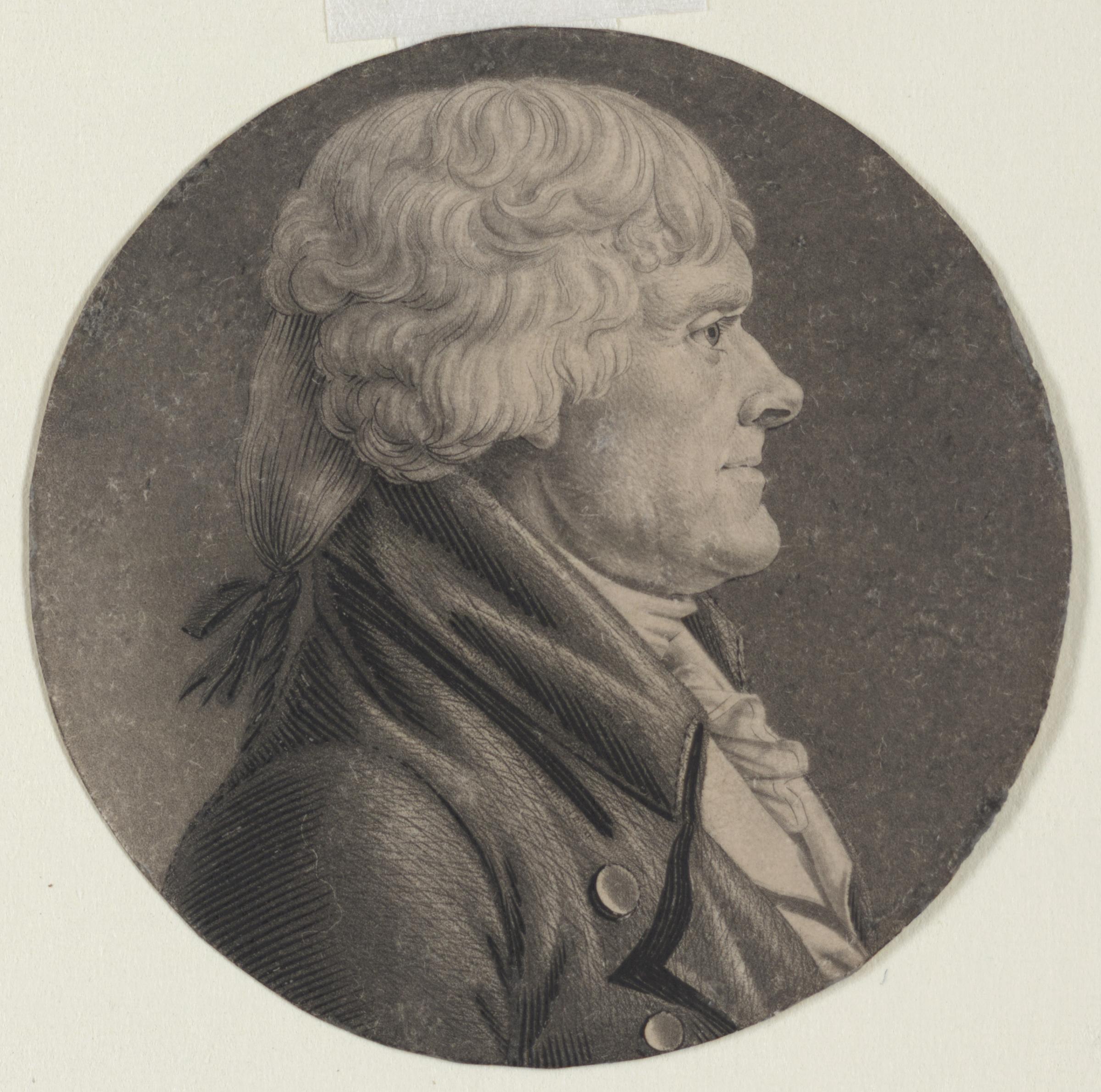
President: Thomas Jefferson
Date: March 5, 1805
What happened: Jefferson rode from the Capitol to the White House in an impromptu parade that included everyone from diplomats to local laborers.
What he said: “I know that the acquisition of Louisiana had been disapproved by some from a candid apprehension that the enlargement of our territory would endanger its union. But who can limit the extent to which the federative principle may operate effectively? The larger our association the less will it be shaken by local passions; and in any view is it not better that the opposite bank of the Mississippi should be settled by our own brethren and children than by strangers of another family?”
1809
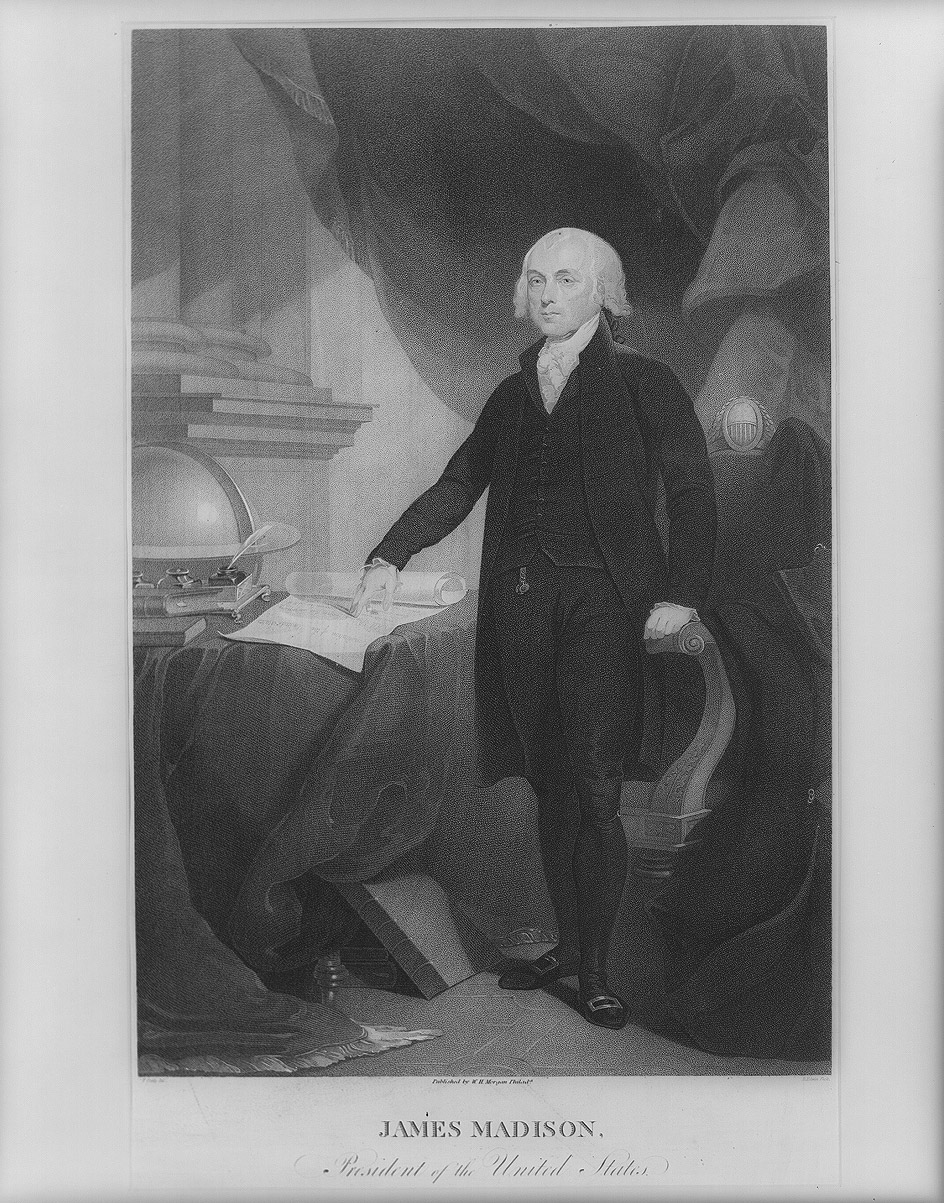
President: James Madison
Date: March 4, 1809
What happened: The first official Inaugural Ball was held for James Madison, but it was so crowded they had to break glass in some of the windows to get fresh air into the ballroom.
What he said: “The present situation of the world is indeed without a parallel, and that of our own country full of difficulties. The pressure of these, too, is the more severely felt because they have fallen upon us at a moment when the national prosperity being at a height not before attained, the contrast resulting from the change has been rendered the more striking.”
1813
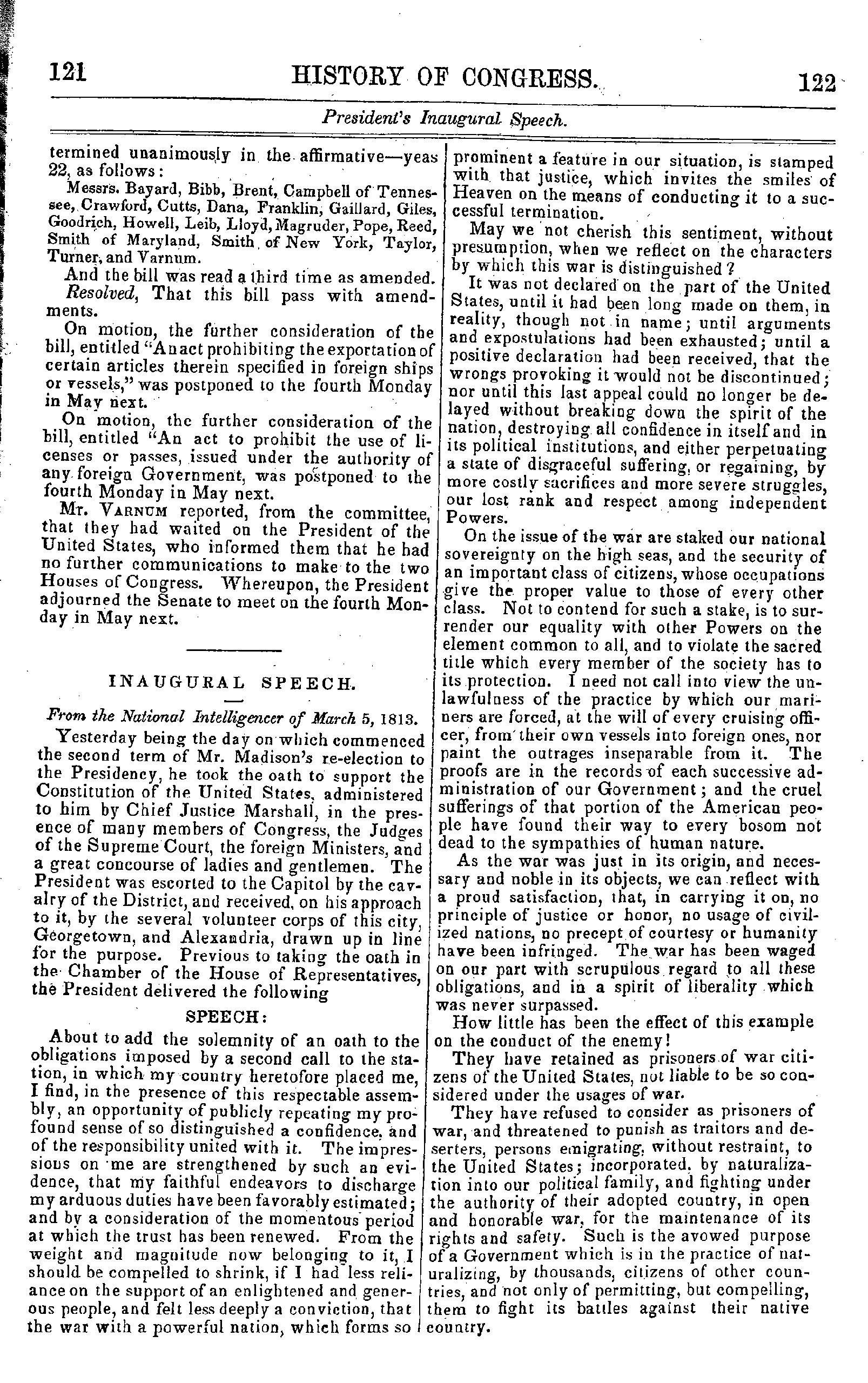
President: James Madison
Date: March 4, 1813
What happened: Madison’s second inauguration happened during the War of 1812, making it the first to take place during a war.
What he said: “From the weight and magnitude now belonging to it I should be compelled to shrink if I had less reliance on the support of an enlightened and generous people, and felt less deeply a conviction that the war with a powerful nation, which forms so prominent a feature in our situation, is stamped with that justice which invites the smiles of Heaven on the means of conducting it to a successful termination.”
1817
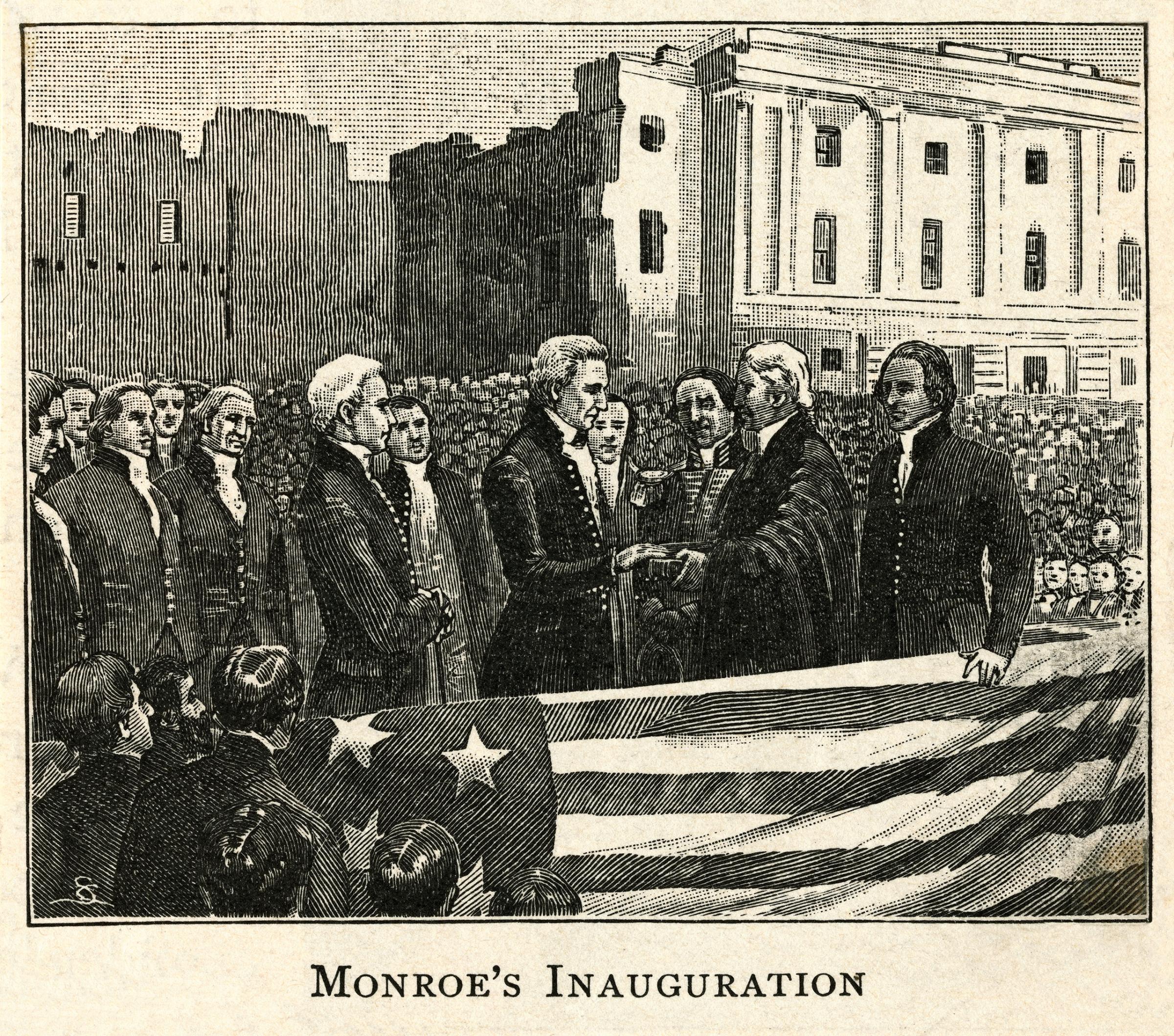
President: James Monroe
Date: March 5, 1817
What happened: The War of 1812 had caused great destruction in Washington, D.C, and the Capitol was still being rebuilt when Inauguration Day arrived. As a result, Monroe became the first President to be inaugurated out of doors.
What he said: “It is particularly gratifying to me to enter on the discharge of these duties at a time when the United States are blessed with peace. It is a state most consistent with their prosperity and happiness. It will be my sincere desire to preserve it, so far as depends on the Executive, on just principles with all nations, claiming nothing unreasonable of any and rendering to each what is its due.”
1821
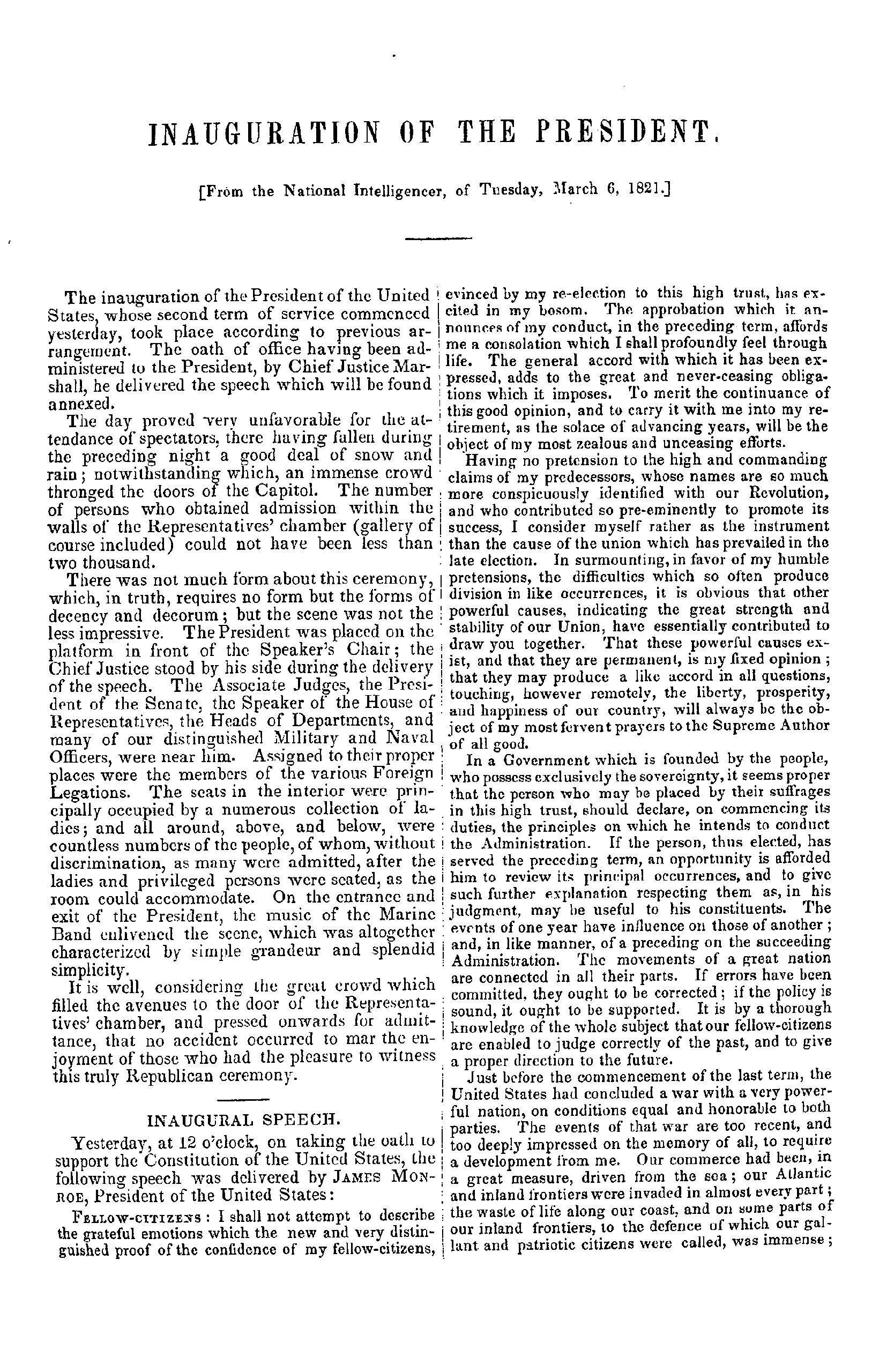
President: James Monroe
Date: March 4, 1821
What happened: Monroe delayed taking the oath of office until after Inauguration Day, so that he would not have to do so on a Sunday—meaning that, technically, the Senate President Pro Tem was President for one day.
What he said: “Having no pretensions to the high and commanding claims of my predecessors, whose names are so much more conspicuously identified with our Revolution, and who contributed so preeminently to promote its success, I consider myself rather as the instrument than the cause of the union which has prevailed in the late election.”
1825
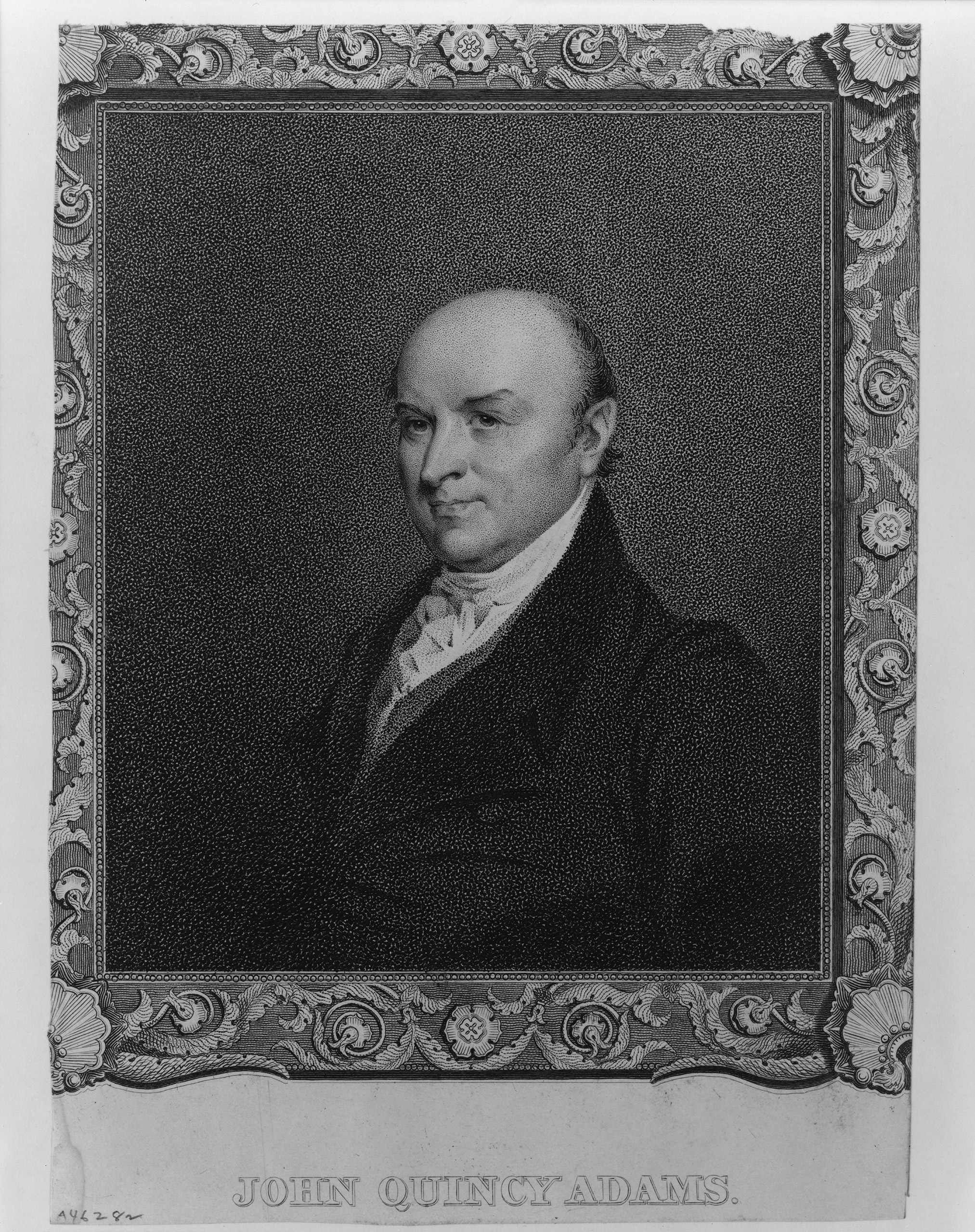
President: John Quincy Adams
Date: March 4, 1825
What happened: Although he was a devout Christian, John Quincy Adams chose to be sworn in on a legal book rather than a Bible.
What he said: “The year of jubilee since the first formation of our Union has just elapsed; that of the declaration of our independence is at hand. The consummation of both was effected by this Constitution. Since that period a population of four millions has multiplied to twelve. A territory bounded by the Mississippi has been extended from sea to sea. New States have been admitted to the Union in numbers nearly equal to those of the first Confederation.”
1829
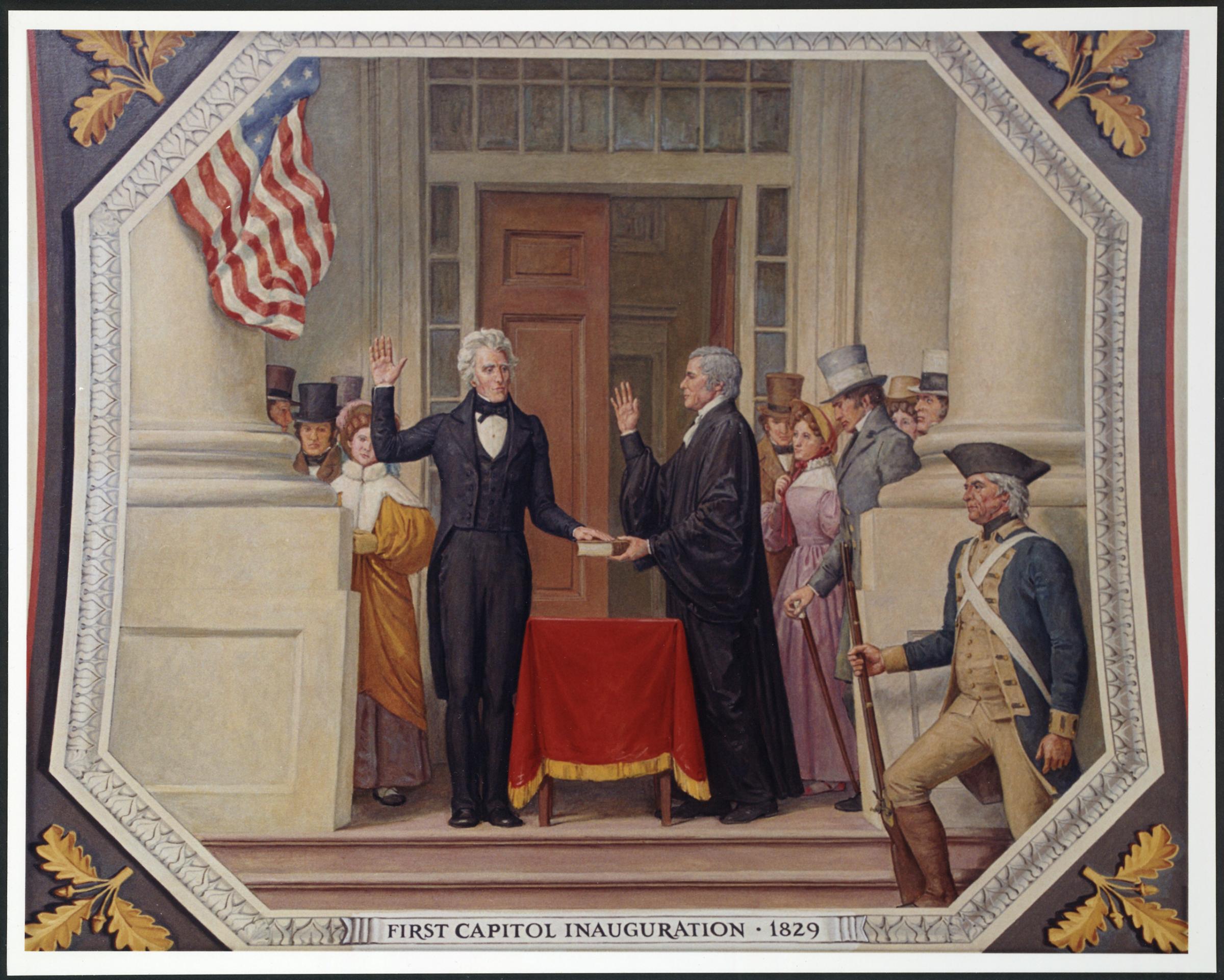
President: Andrew Jackson
Date: Mar. 4, 1829
What happened: Jackson walked to the Capitol for the ceremony accompanied by 15 veterans of the Revolutionary War; the subsequent party at the White House was so wild he had to “escape” out a window.
What he said: “As long as our Government is administered for the good of the people, and is regulated by their will; as long as it secures to us the rights of person and of property, liberty of conscience and of the press, it will be worth defending; and so long as it is worth defending a patriotic militia will cover it with an impenetrable aegis. Partial injuries and occasional mortifications we may be subjected to, but a million of armed freemen, possessed of the means of war, can never be conquered by a foreign foe.”
1833
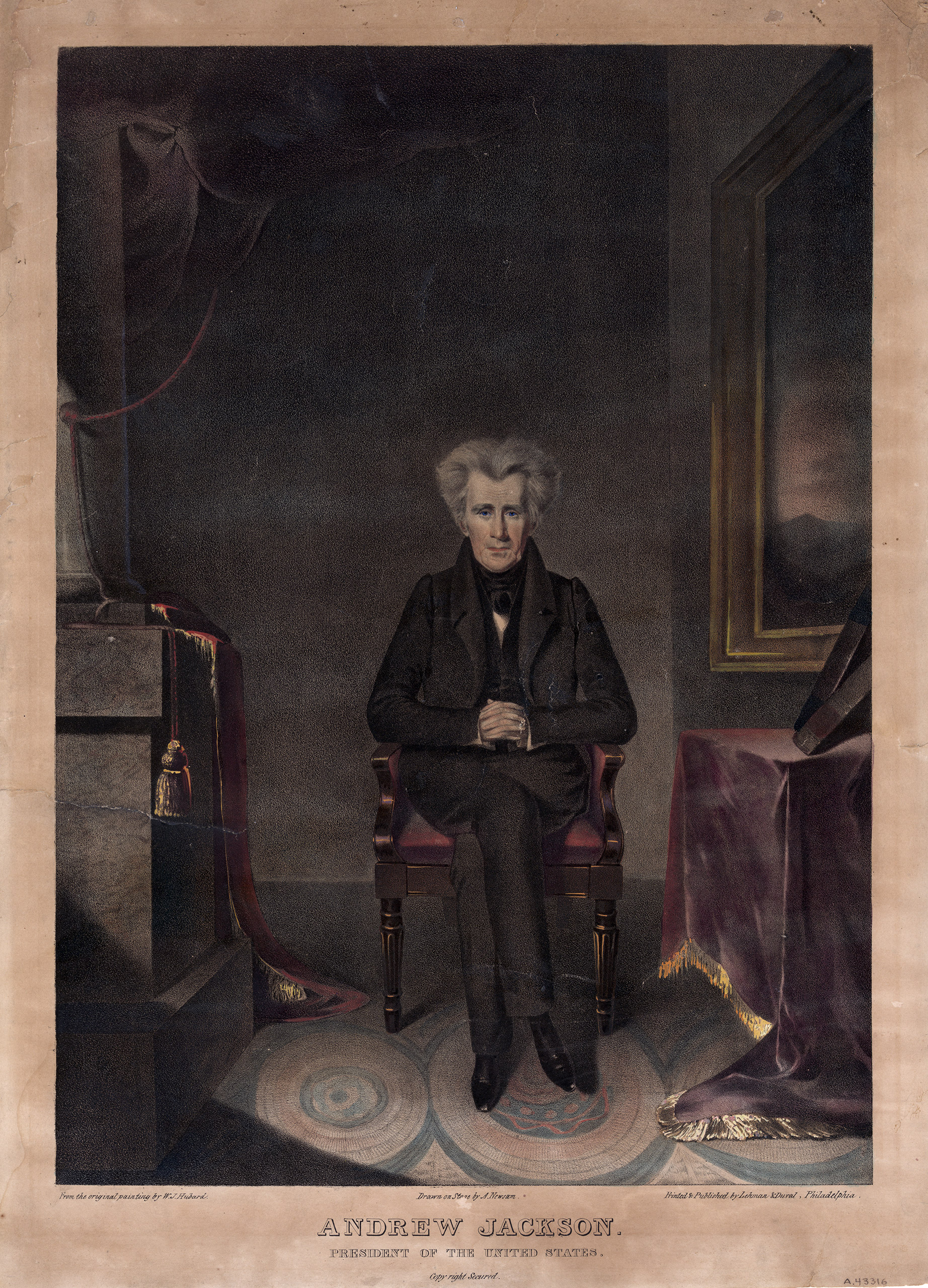
President: Andrew Jackson
Date: Mar. 4, 1833
What happened: For the first time, there were multiple official Inaugural balls.
What he said: “In the domestic policy of this Government there are two objects which especially deserve the attention of the people and their representatives, and which have been and will continue to be the subjects of my increasing solicitude. They are the preservation of the rights of the several States and the integrity of the Union.”
1837
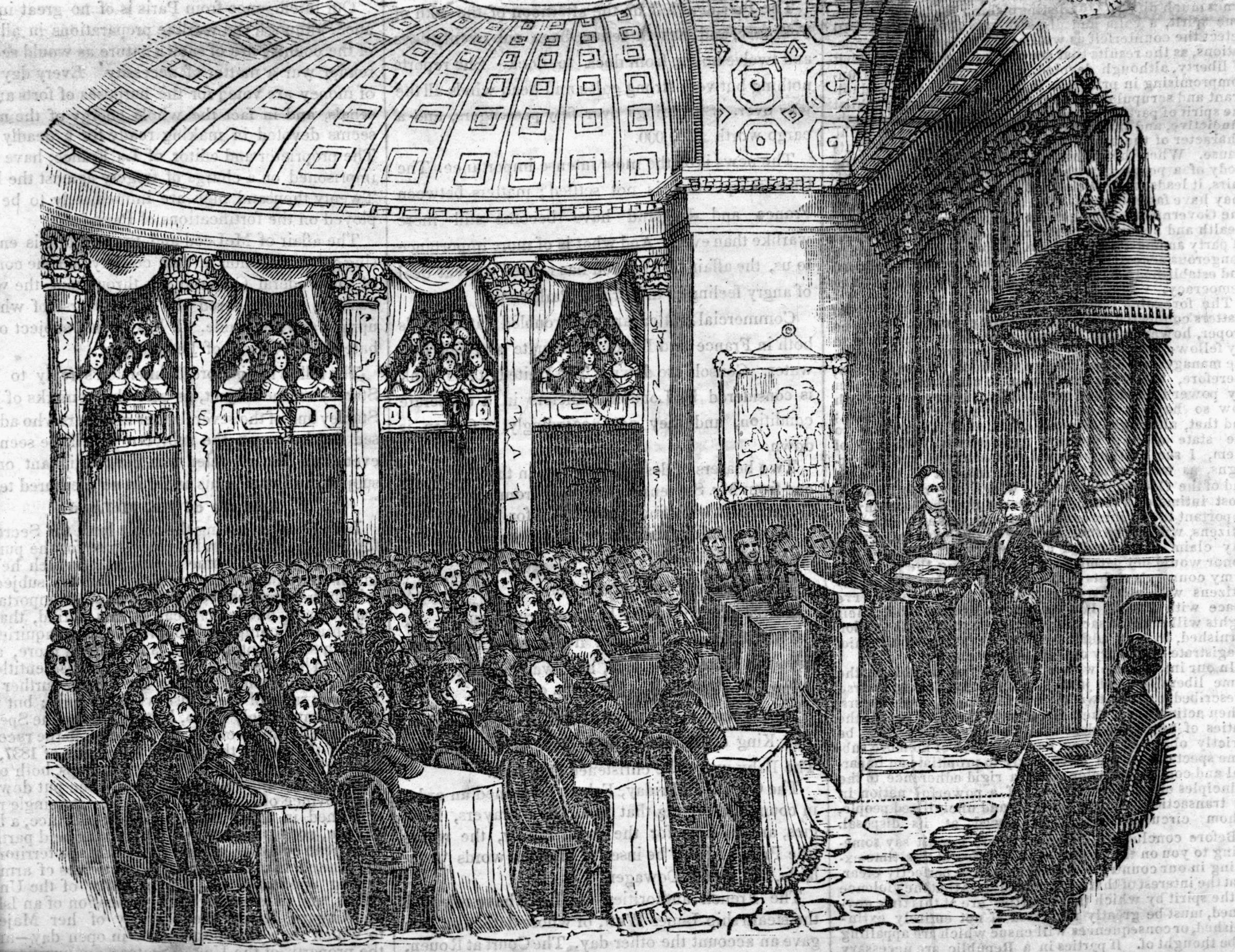
President: Martin Van Buren
Date: Mar. 4, 1837
What happened: Van Buren rode to the ceremony in a wagon built of wood from the USS Constitution.
What he said: “Though not altogether exempt from embarrassments that disturb our tranquillity at home and threaten it abroad, yet in all the attributes of a great, happy, and flourishing people we stand without a parallel in the world. Abroad we enjoy the respect and, with scarcely an exception, the friendship of every nation; at home, while our Government quietly but efficiently performs the sole legitimate end of political institutions–in doing the greatest good to the greatest number–we present an aggregate of human prosperity surely not elsewhere to be found.”
1841
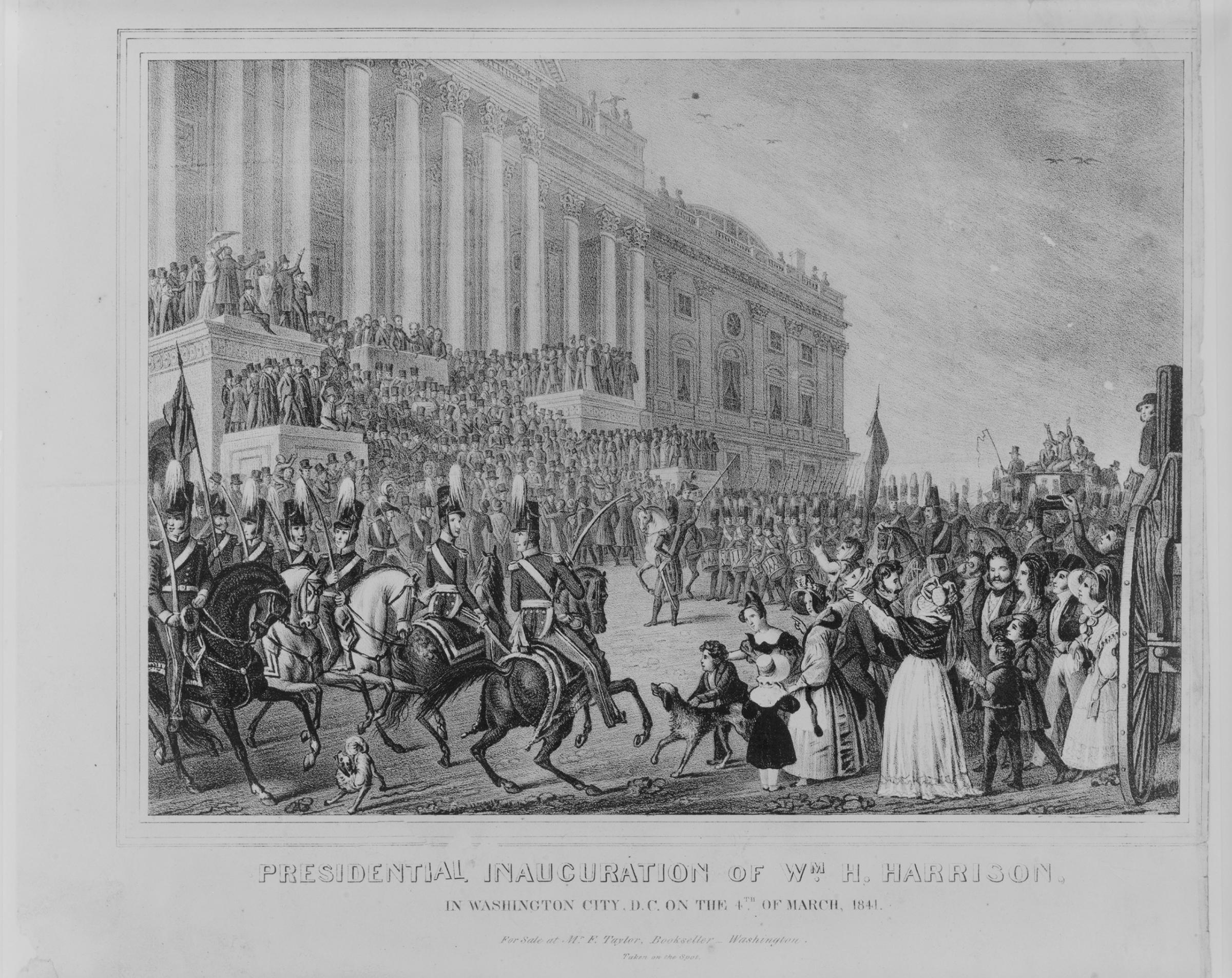
President: William Henry Harrison
Date: Mar. 4, 1841
What happened: After giving a lengthy address on a cold day, William Henry Harrison developed an illness that would lead to his death 32 days later. Though scientists now question whether there was a connection between the two events, the deadly speech remains one of the most infamous Inauguration Day legends in American history.
What he said: “Before concluding, fellow-citizens, I must say something to you on the subject of the parties at this time existing in our country. To me it appears perfectly clear that the interest of that country requires that the violence of the spirit by which those parties are at this time governed must be greatly mitigated, if not entirely extinguished, or consequences will ensue which are appalling to be thought of.”
1845
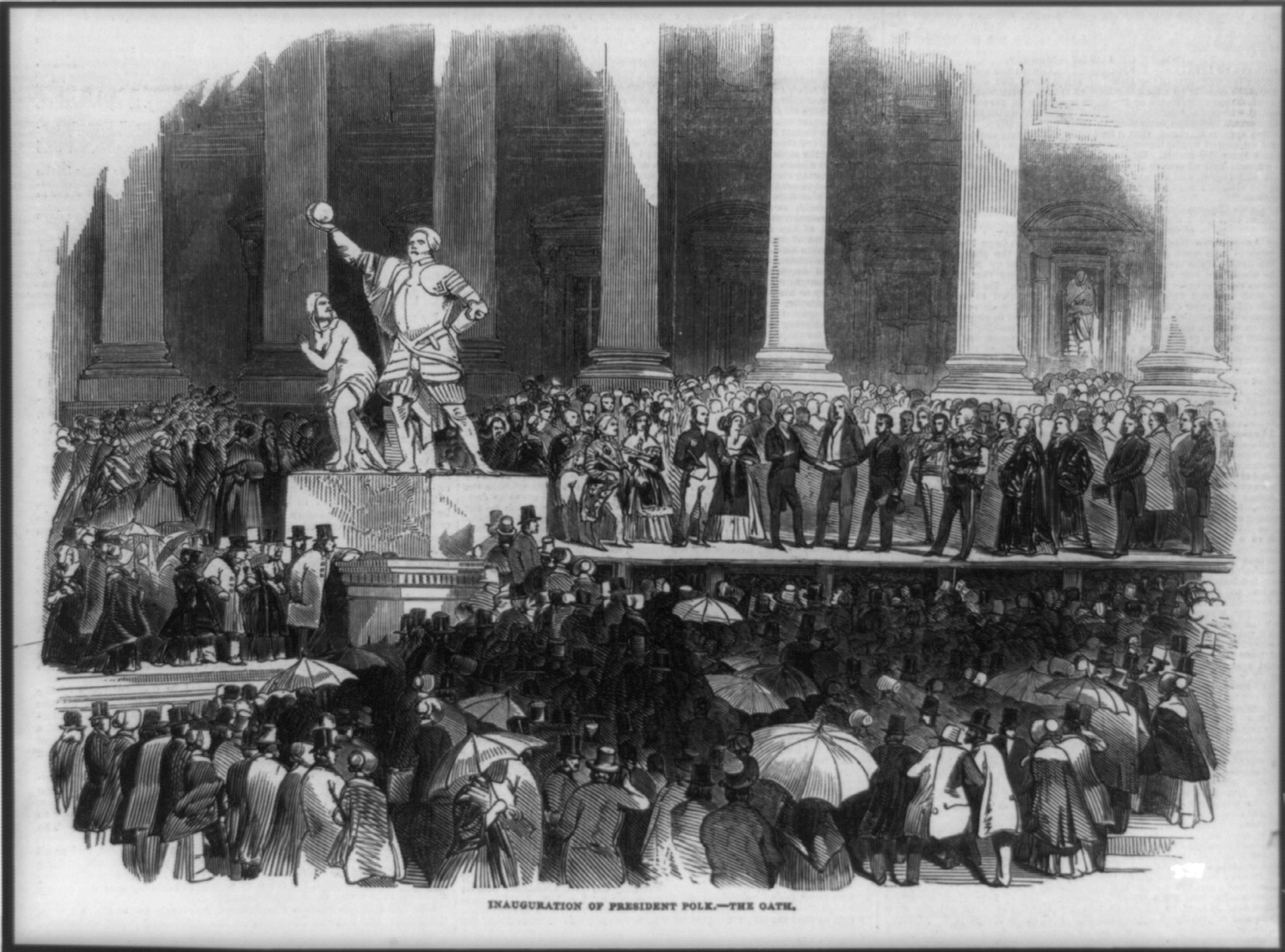
President: James K. Polk
Date: Mar. 4, 1845
What happened: Though it was not have the first time the song was used to welcome a President, Polk’s Inauguration involved the playing of “Hail to the Chief,” which he is credited with giving its association with the presidency.
What he said: “I shall on the broad principle which formed the basis and produced the adoption of our Constitution, and not in any narrow spirit of sectional policy, endeavor by all constitutional, honorable, and appropriate means to consummate the expressed will of the people and Government of the United States by the reannexation of Texas to our Union at the earliest practicable period. Nor will it become in a less degree my duty to assert and maintain by all constitutional means the right of the United States to that portion of our territory which lies beyond the Rocky Mountains. Our title to the country of the Oregon is “clear and unquestionable,” and already are our people preparing to perfect that title by occupying it with their wives and children.”
1849
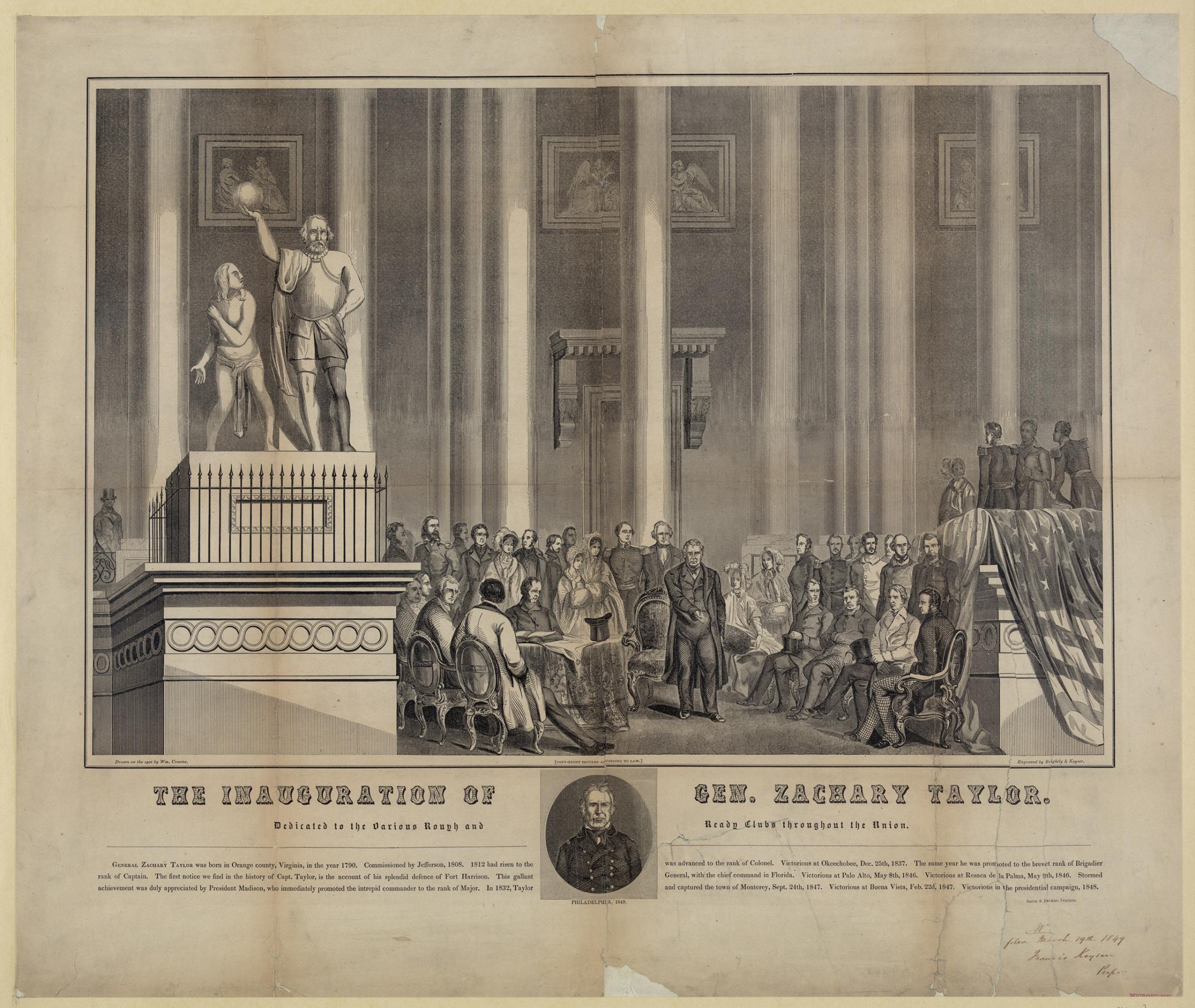
President: Zachary Taylor
Date: Mar. 5, 1849
What happened: The postponement of his inauguration, to avoid a Sunday, may once again have technically left the nation without a president for a day.
What he said: “It is to be hoped that no international question can now arise which a government confident in its own strength and resolved to protect its own just rights may not settle by wise negotiation; and it eminently becomes a government like our own, founded on the morality and intelligence of its citizens and upheld by their affections, to exhaust every resort of honorable diplomacy before appealing to arms.”
1853
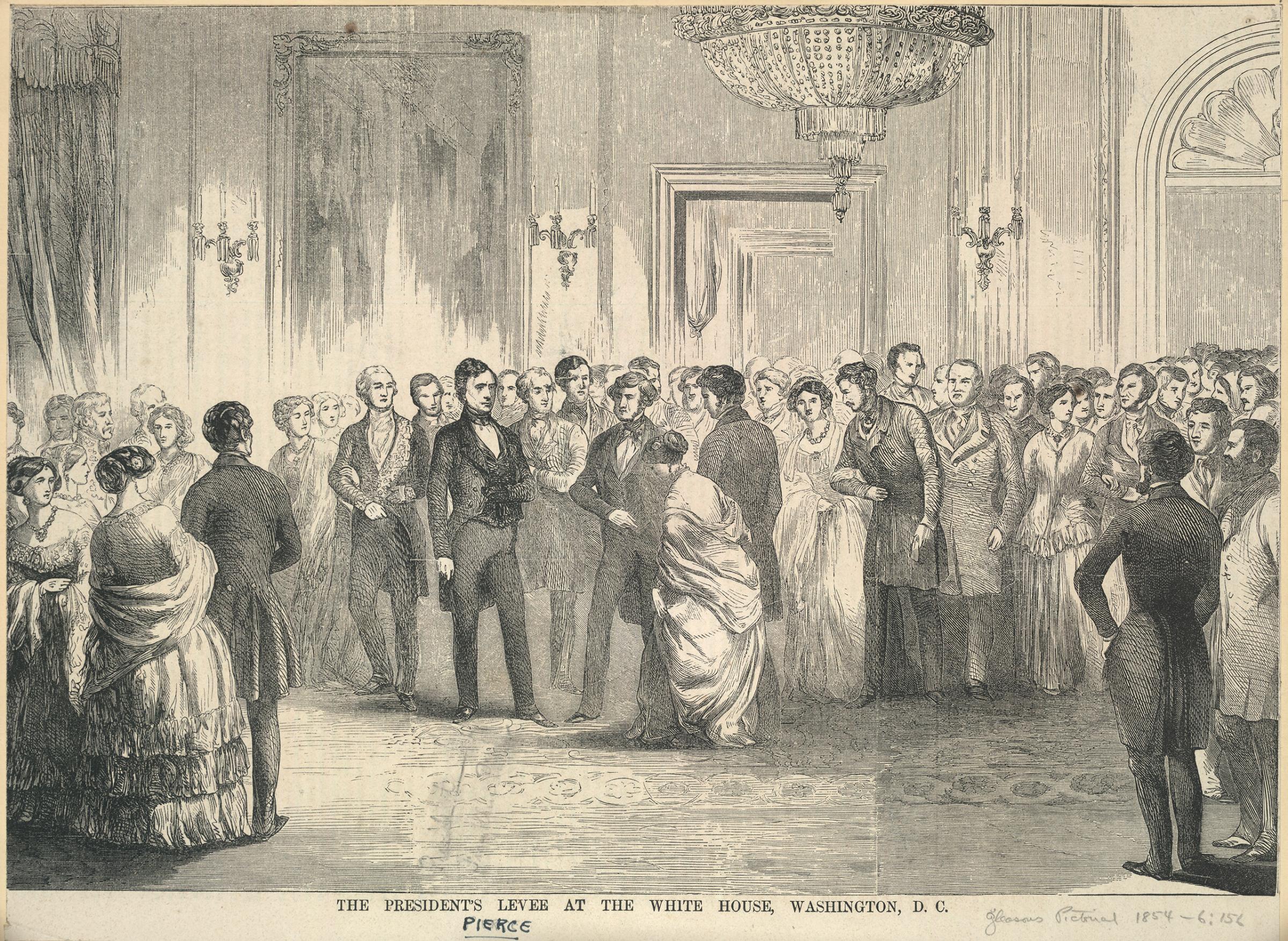
President: Franklin Pierce
Date: Mar. 4, 1853
What happened: He gave his speech entirely from memory, a first for an inauguration.
What he said: “With an experience thus suggestive and cheering, the policy of my Administration will not be controlled by any timid forebodings of evil from expansion. Indeed, it is not to be disguised that our attitude as a nation and our position on the globe render the acquisition of certain possessions not within our jurisdiction eminently important for our protection, if not in the future essential for the preservation of the rights of commerce and the peace of the world.”
1857
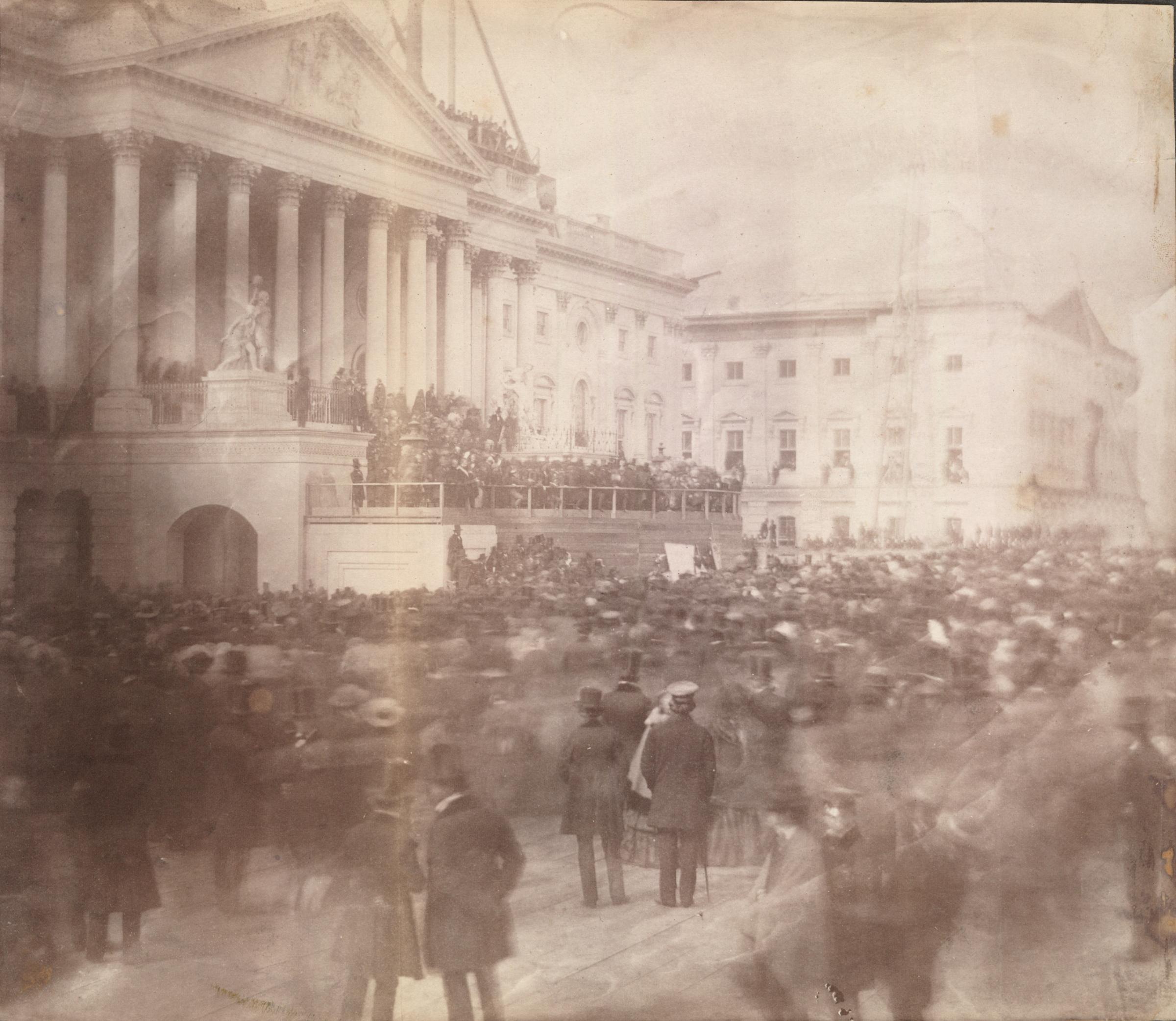
President: James Buchanan
Date: Mar. 4, 1857
What happened: James Buchanan’s 1857 inauguration was the first one that is known to have been photographed. (Read more about that picture here.)
What he said: “The whole Territorial question being thus settled upon the principle of popular sovereignty—a principle as ancient as free government itself—everything of a practical nature has been decided. No other question remains for adjustment, because all agree that under the Constitution slavery in the States is beyond the reach of any human power except that of the respective States themselves wherein it exists. May we not, then, hope that the long agitation on this subject is approaching its end, and that the geographical parties to which it has given birth, so much dreaded by the Father of his Country, will speedily become extinct?”
1861
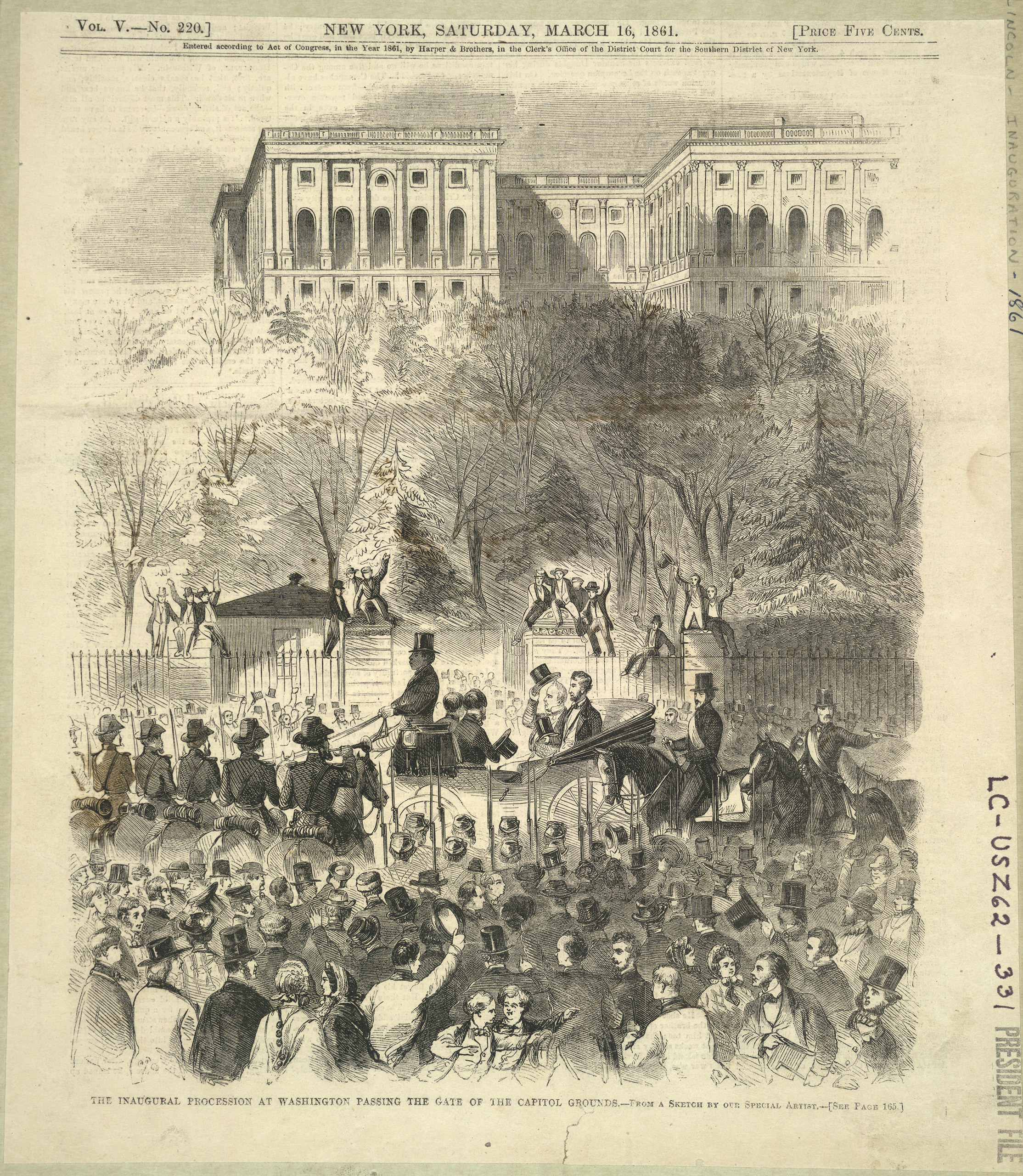
President: Abraham Lincoln
Date: Mar. 4, 1861
What happened: The inaugural parade featured a float bearing 34 young girls representing the 34 states.
What he said: “We are not enemies, but friends. We must not be enemies. Though passion may have strained it must not break our bonds of affection. The mystic chords of memory, stretching from every battlefield and patriot grave to every living heart and hearthstone all over this broad land, will yet swell the chorus of the Union, when again touched, as surely they will be, by the better angels of our nature.”
1865
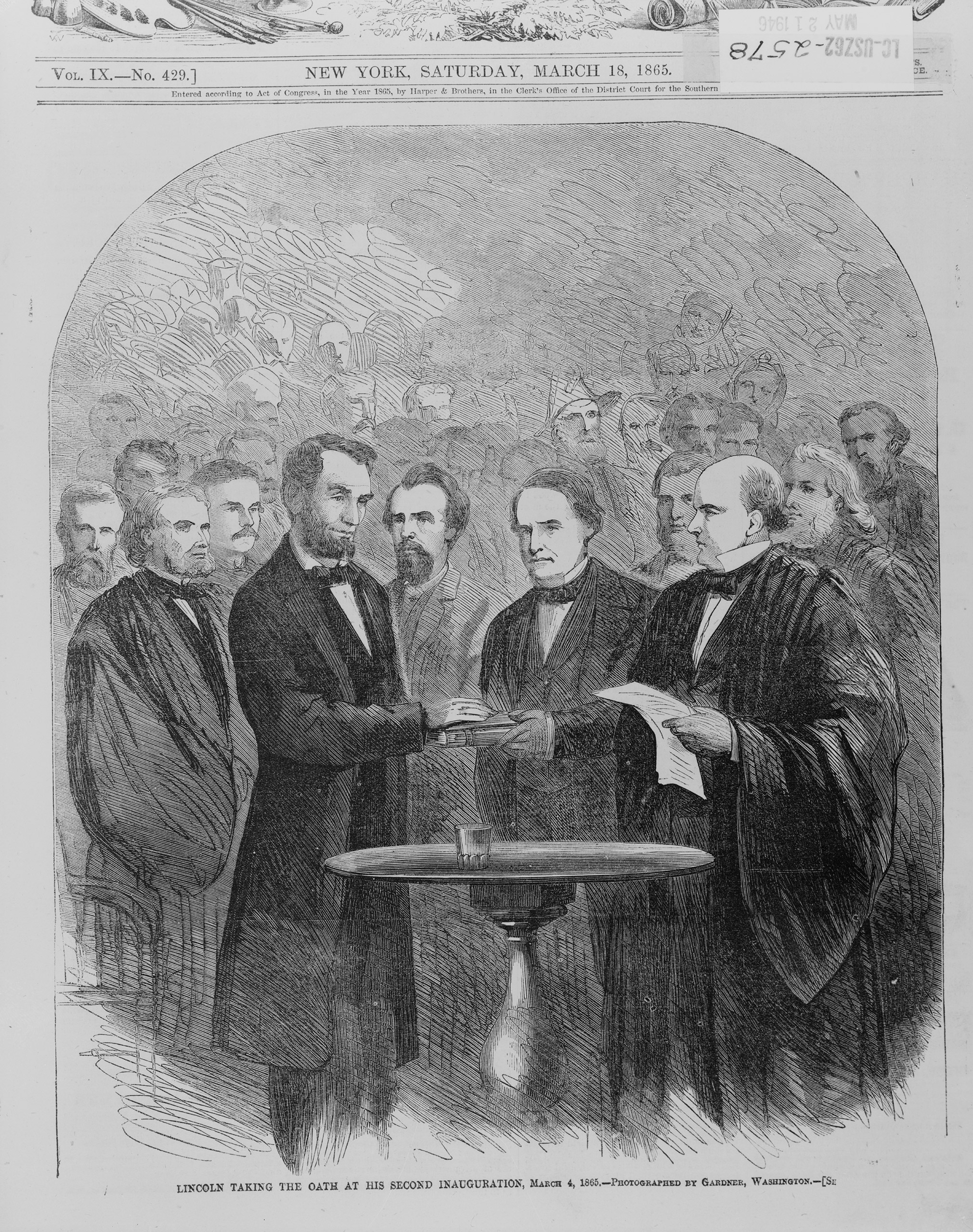
President: Abraham Lincoln
Date: Mar. 4, 1865
What happened: For the first time ever, African-Americans had a part in the inaugural parade.
What he said: “With malice toward none, with charity for all, with firmness in the right as God gives us to see the right, let us strive on to finish the work we are in, to bind up the nation’s wounds, to care for him who shall have borne the battle and for his widow and his orphan, to do all which may achieve and cherish a just and lasting peace among ourselves and with all nations.”
1869
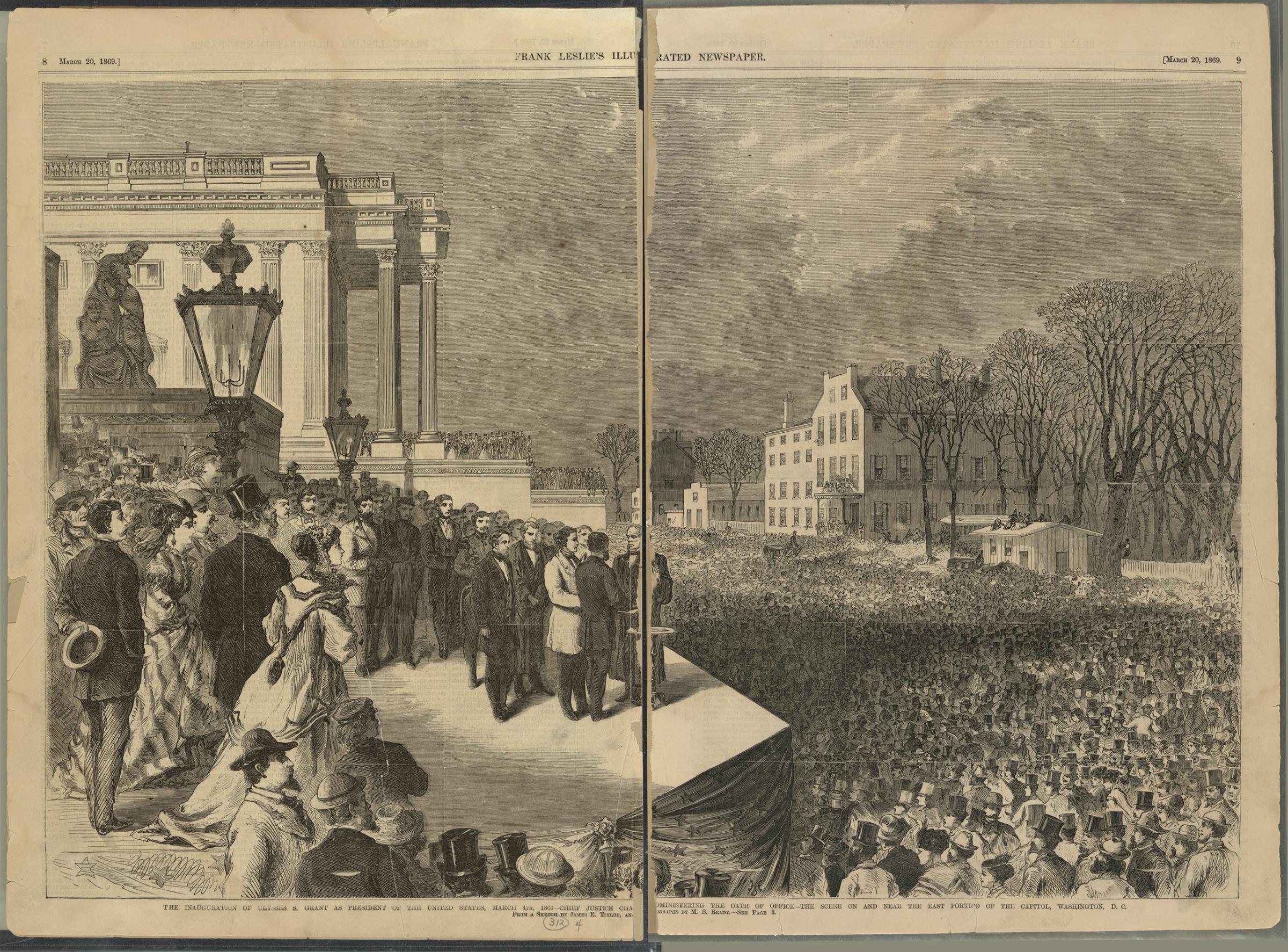
President: Ulysses S. Grant
Date: Mar. 4, 1869
What happened: Though by this time it was customary for the outgoing president and the incoming president to ride together to the ceremony, Grant refused to share a carriage with Johnson.
What he said: “The country having just emerged from a great rebellion, many questions will come before it for settlement in the next four years which preceding Administrations have never had to deal with. In meeting these it is desirable that they should be approached calmly, without prejudice, hate, or sectional pride, remembering that the greatest good to the greatest number is the object to be attained.”
1873
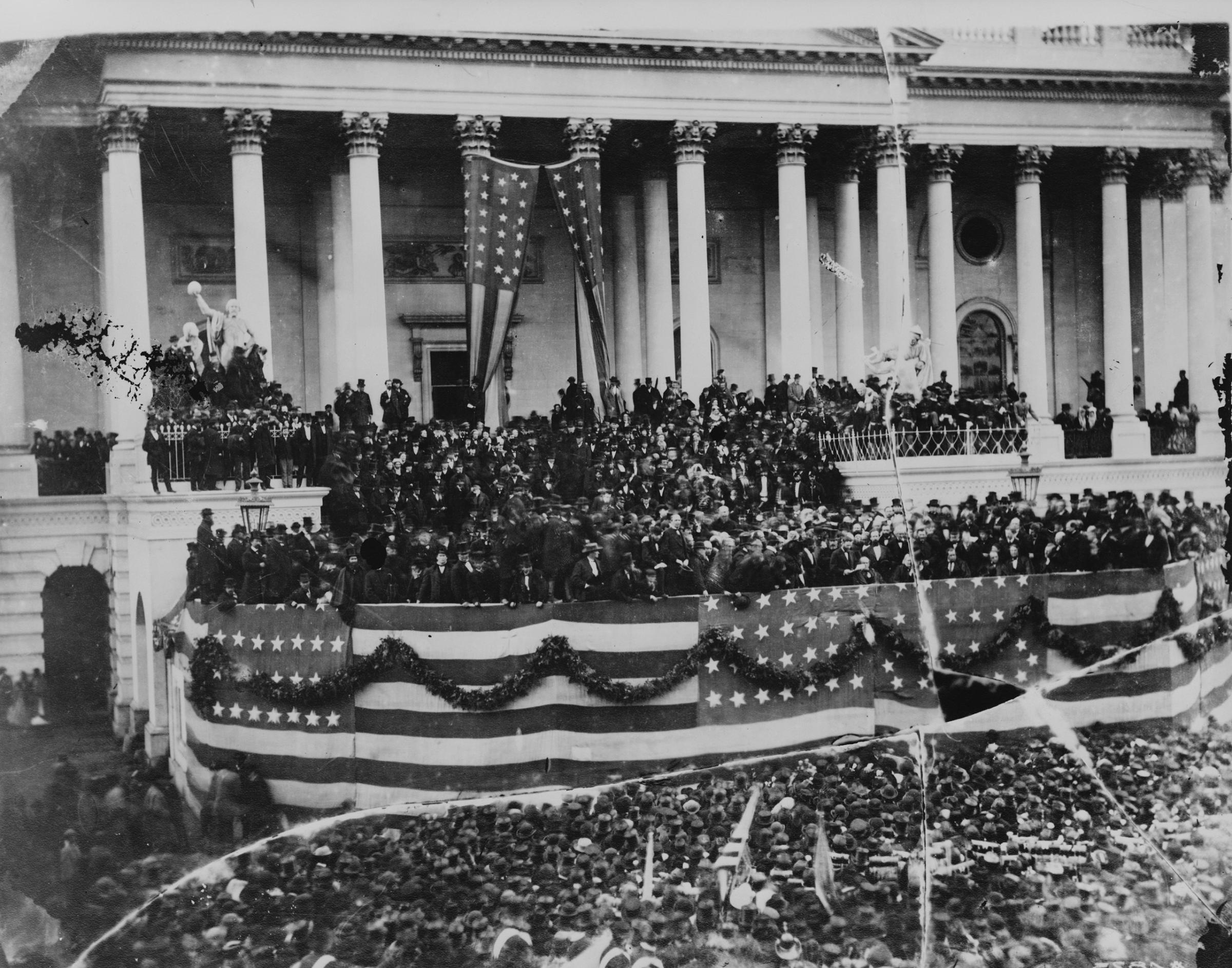
President: Ulysses S. Grant
Date: Mar. 4, 1873
What happened: It was so cold that the singing canaries brought in for the festivities ended up frozen.
What he said: “The effects of the late civil strife have been to free the slave and make him a citizen. Yet he is not possessed of the civil rights which citizenship should carry with it. This is wrong, and should be corrected. To this correction I stand committed, so far as Executive influence can avail.”
1877
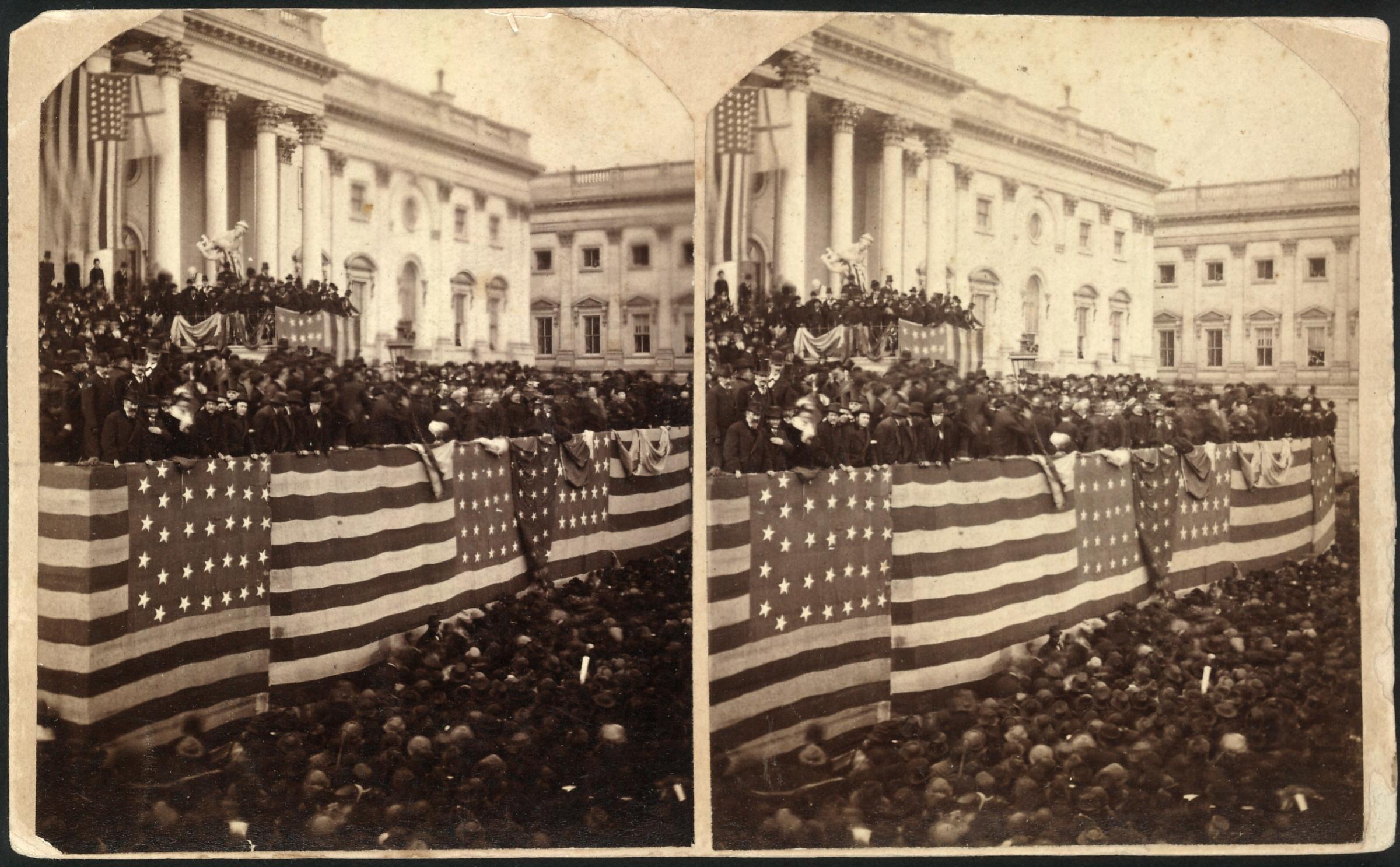
President: Rutherford B. Hayes
Date: Mar. 5, 1877
What happened: Hayes didn’t know he would be president until mere days before the Inauguration was scheduled.
What he said: “Upon one point there is entire unanimity in public sentiment—that conflicting claims to the Presidency must be amicably and peaceably adjusted, and that when so adjusted the general acquiescence of the nation ought surely to follow. It has been reserved for a government of the people, where the right of suffrage is universal, to give to the world the first example in history of a great nation, in the midst of the struggle of opposing parties for power, hushing its party tumults to yield the issue of the contest to adjustment according to the forms of law.”
1881
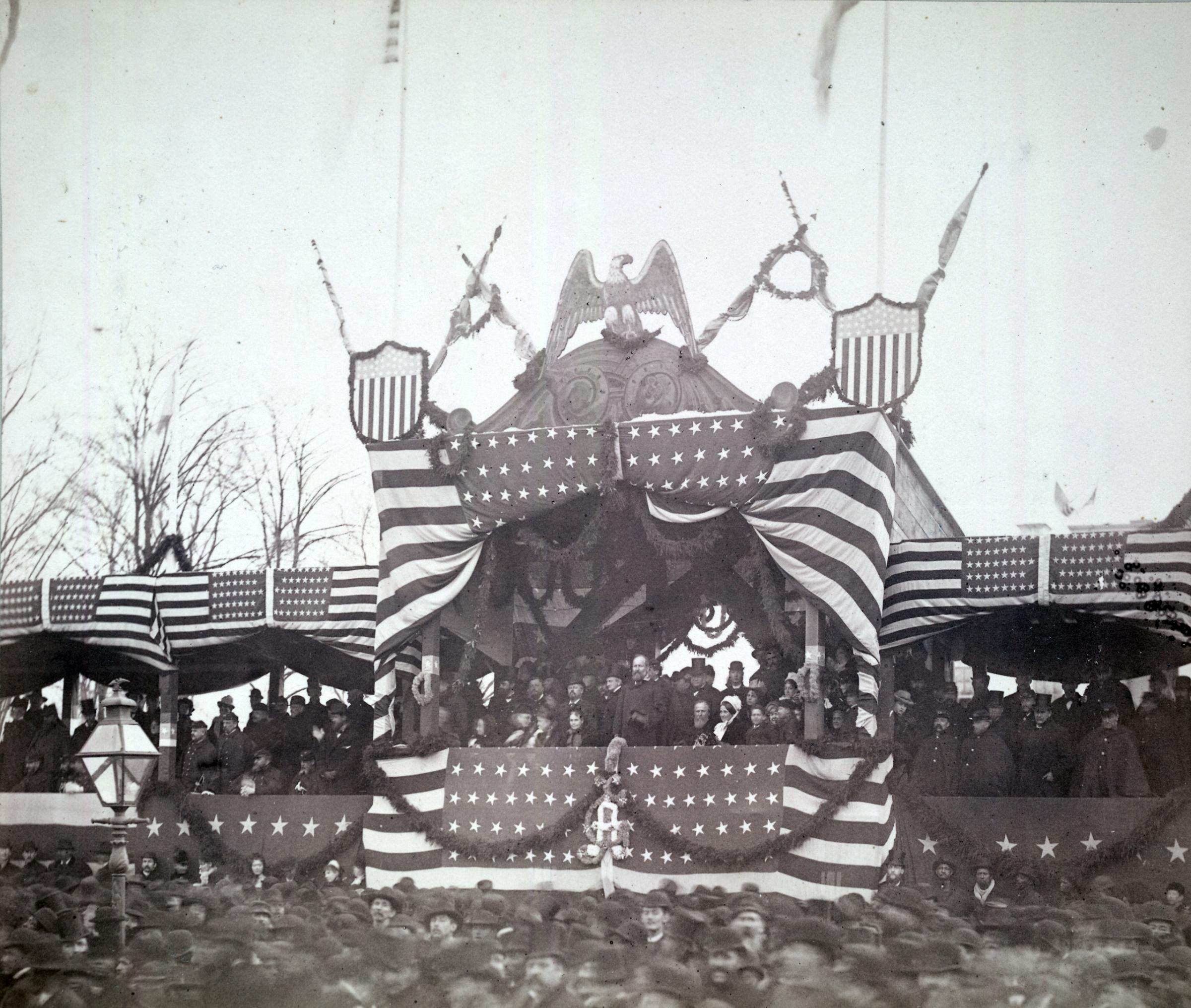
President: James A. Garfield
Date: Mar. 4, 1881
What happened: As a massive parade marked the occasion, a hearse got tangled in the traffic and ended up participating in the procession.
What he said: “The prosperity which now prevails is without parallel in our history. Fruitful seasons have done much to secure it, but they have not done all. The preservation of the public credit and the resumption of specie payments, so successfully attained by the Administration of my predecessors, have enabled our people to secure the blessings which the seasons brought.”
1885
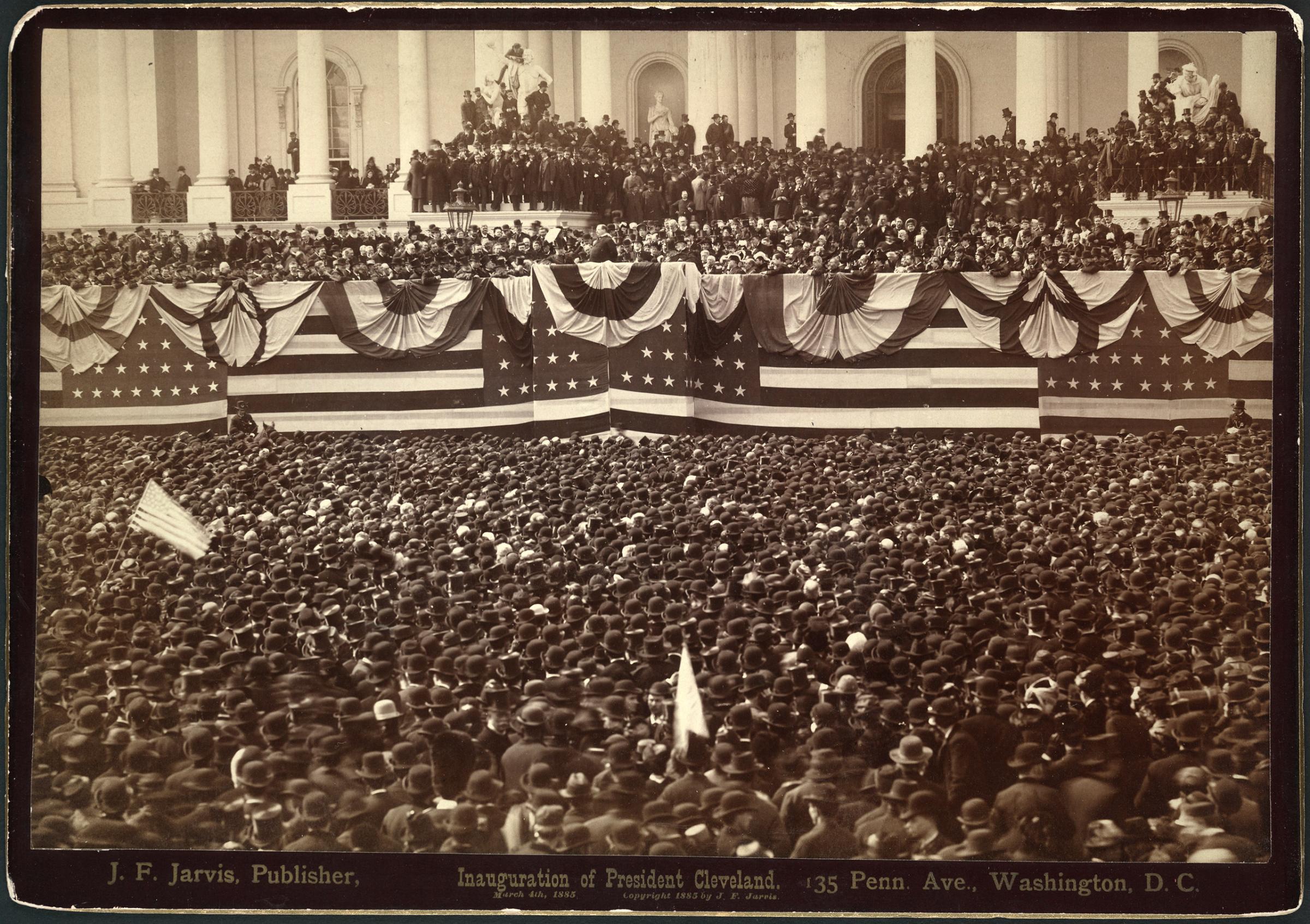
President: Grover Cleveland
Date: Mar. 4, 1885
What happened: The new First Lady had to borrow a raincoat from an usher to protect her from a snow storm.
What he said: “Amid the din of party strife the people’s choice was made, but its attendant circumstances have demonstrated anew the strength and safety of a government by the people. In each succeeding year it more clearly appears that our democratic principle needs no apology, and that in its fearless and faithful application is to be found the surest guaranty of good government.”
1889

President: Benjamin Harrison
Date: Mar. 4, 1889
What happened: A new tradition was established when the outgoing Clevelands invited the incoming Harrisons to the White House for lunch before the parade.
What he said: “We have happily maintained a policy of avoiding all interference with European affairs. We have been only interested spectators of their contentions in diplomacy and in war, ready to use our friendly offices to promote peace, but never obtruding our advice and never attempting unfairly to coin the distresses of other powers into commercial advantage to ourselves. We have a just right to expect that our European policy will be the American policy of European courts.”
1893
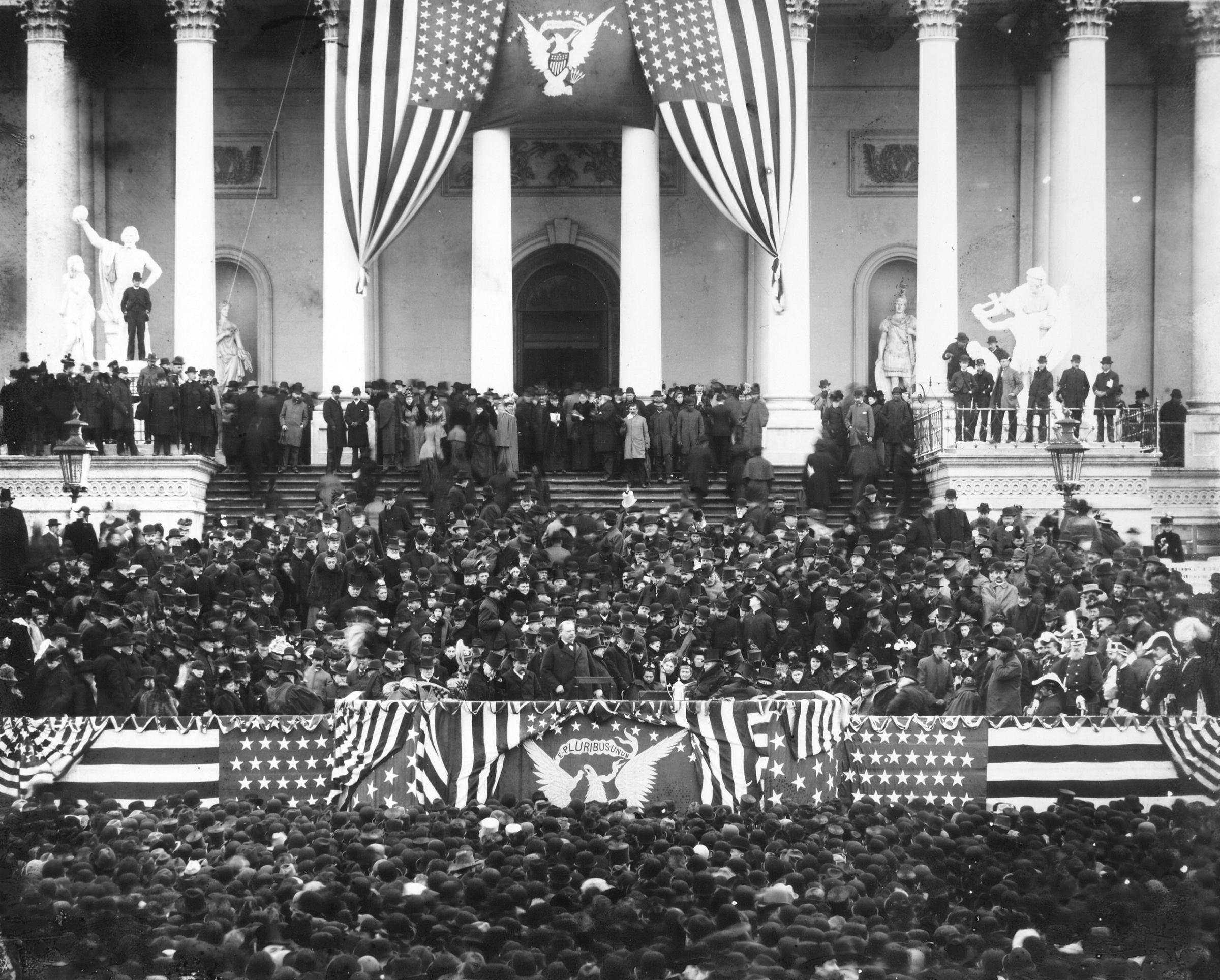
President: Grover Cleveland
Date: Mar. 4, 1893
What happened: A rooster that had participated in the inaugural parade got away from his keeper and apparently spent the night in the White House.
What he said: “The strong man who in the confidence of sturdy health courts the sternest activities of life and rejoices in the hardihood of constant labor may still have lurking near his vitals the unheeded disease that dooms him to sudden collapse. It can not be doubted that our stupendous achievements as a people and our country’s robust strength have given rise to heedlessness of those laws governing our national health which we can no more evade than human life can escape the laws of God and nature.”
1897
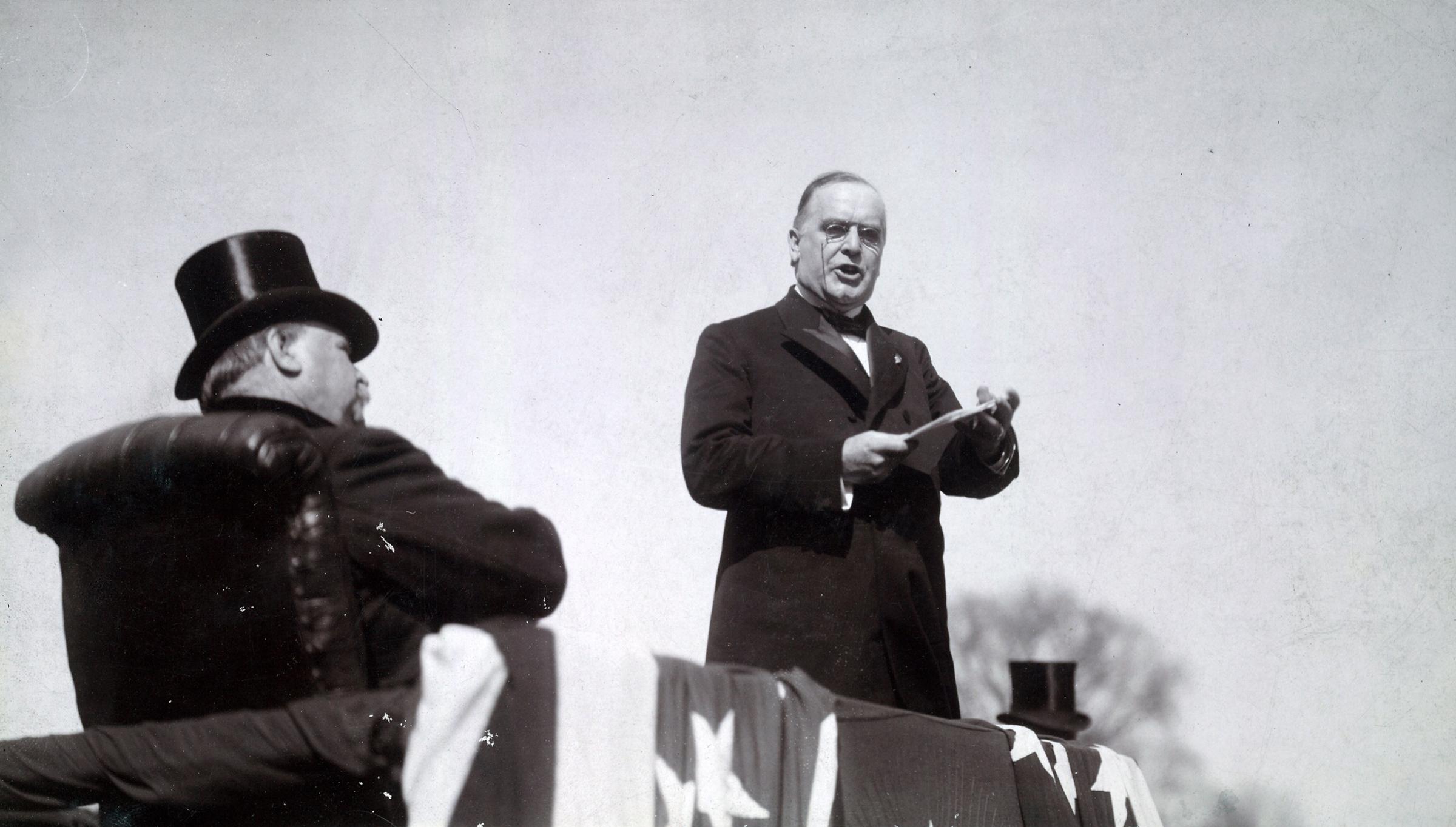
President: William McKinley
Date: Mar. 4, 1897
What happened: This Inauguration was the first to be filmed with motion-picture cameras.
What he said: “Economy is demanded in every branch of the Government at all times, but especially in periods, like the present, of depression in business and distress among the people. The severest economy must be observed in all public expenditures, and extravagance stopped wherever it is found, and prevented wherever in the future it may be developed. If the revenues are to remain as now, the only relief that can come must be from decreased expenditures. But the present must not become the permanent condition of the Government.”
1901
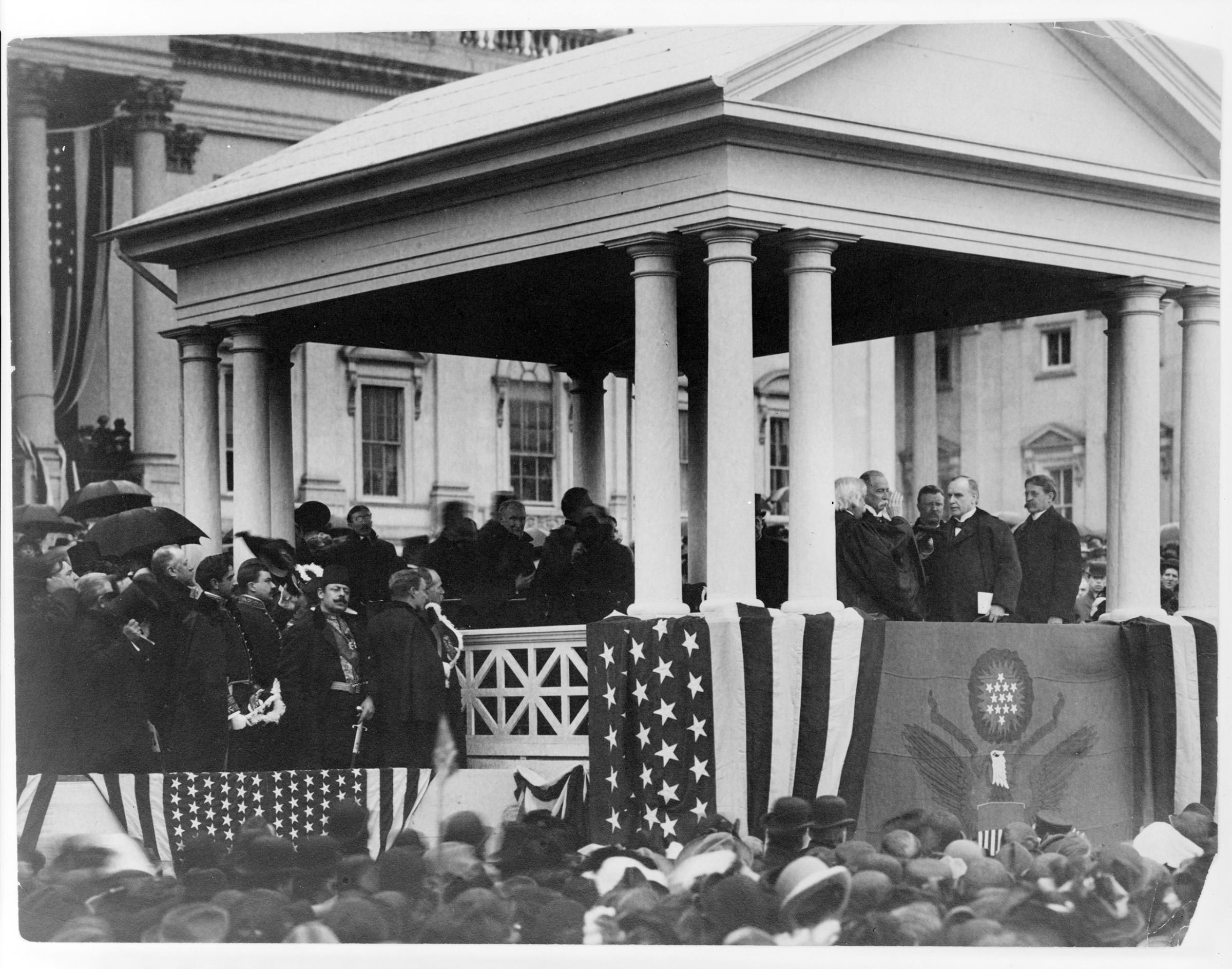
President: William McKinley
Date: Mar. 4, 1901
What happened: A “Committee on Public Comfort” met tourists at train stations to help them find places to stay in D.C.
What he said: “When we assembled here on the 4th of March, 1897, there was great anxiety with regard to our currency and credit. None exists now. Then our Treasury receipts were inadequate to meet the current obligations of the Government. Now they are sufficient for all public needs, and we have a surplus instead of a deficit.”
1905
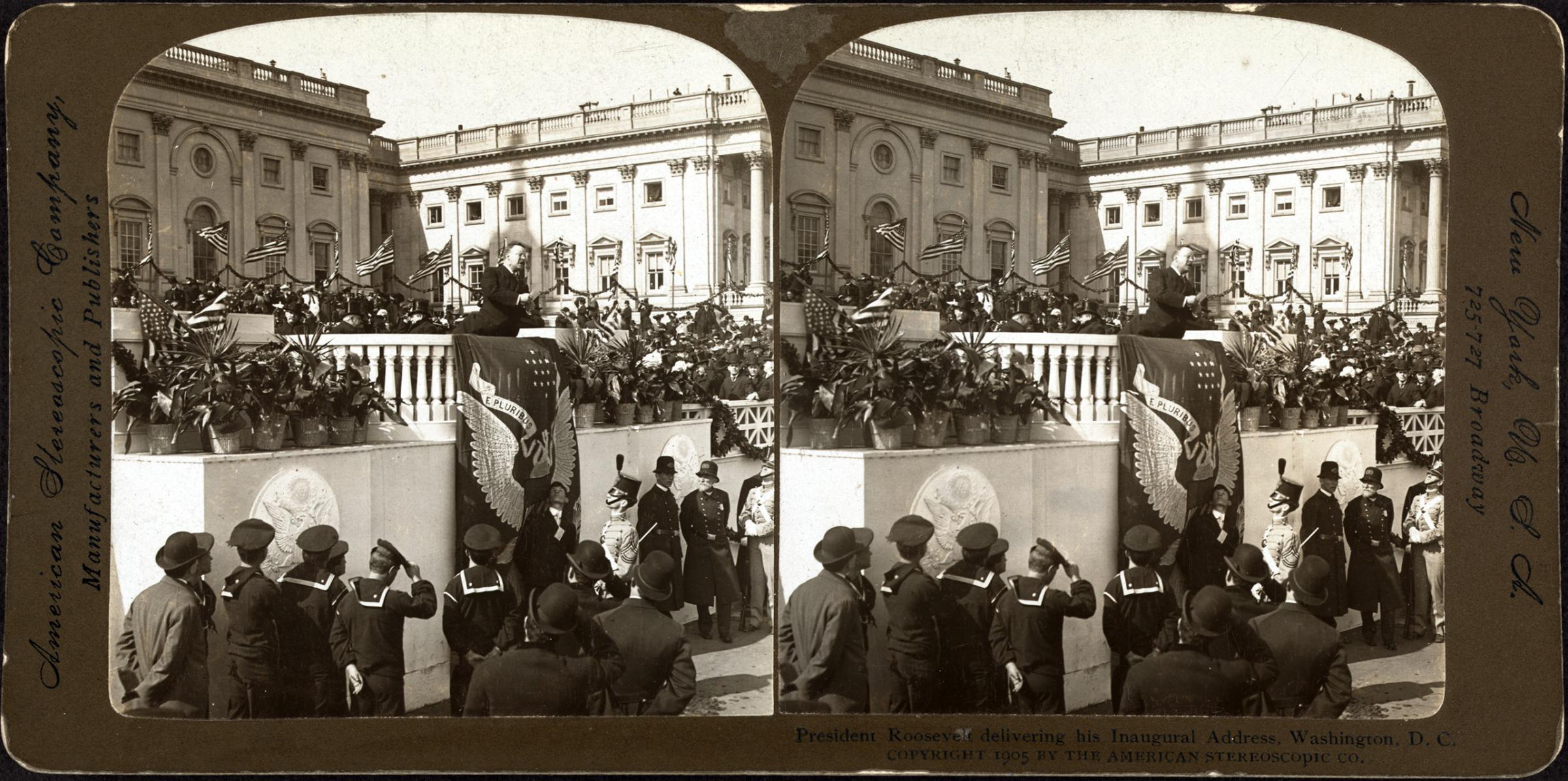
President: Theodore Roosevelt
Date: Mar. 4, 1905
What happened: Mrs. Roosevelt’s inaugural-ball dress was so heavy that the dance program had to be made shorter.
What he said: “Much has been given us, and much will rightfully be expected from us. We have duties to others and duties to ourselves; and we can shirk neither. We have become a great nation, forced by the fact of its greatness into relations with the other nations of the earth, and we must behave as beseems a people with such responsibilities. Toward all other nations, large and small, our attitude must be one of cordial and sincere friendship. We must show not only in our words, but in our deeds, that we are earnestly desirous of securing their good will by acting toward them in a spirit of just and generous recognition of all their rights. But justice and generosity in a nation, as in an individual, count most when shown not by the weak but by the strong.”
1909
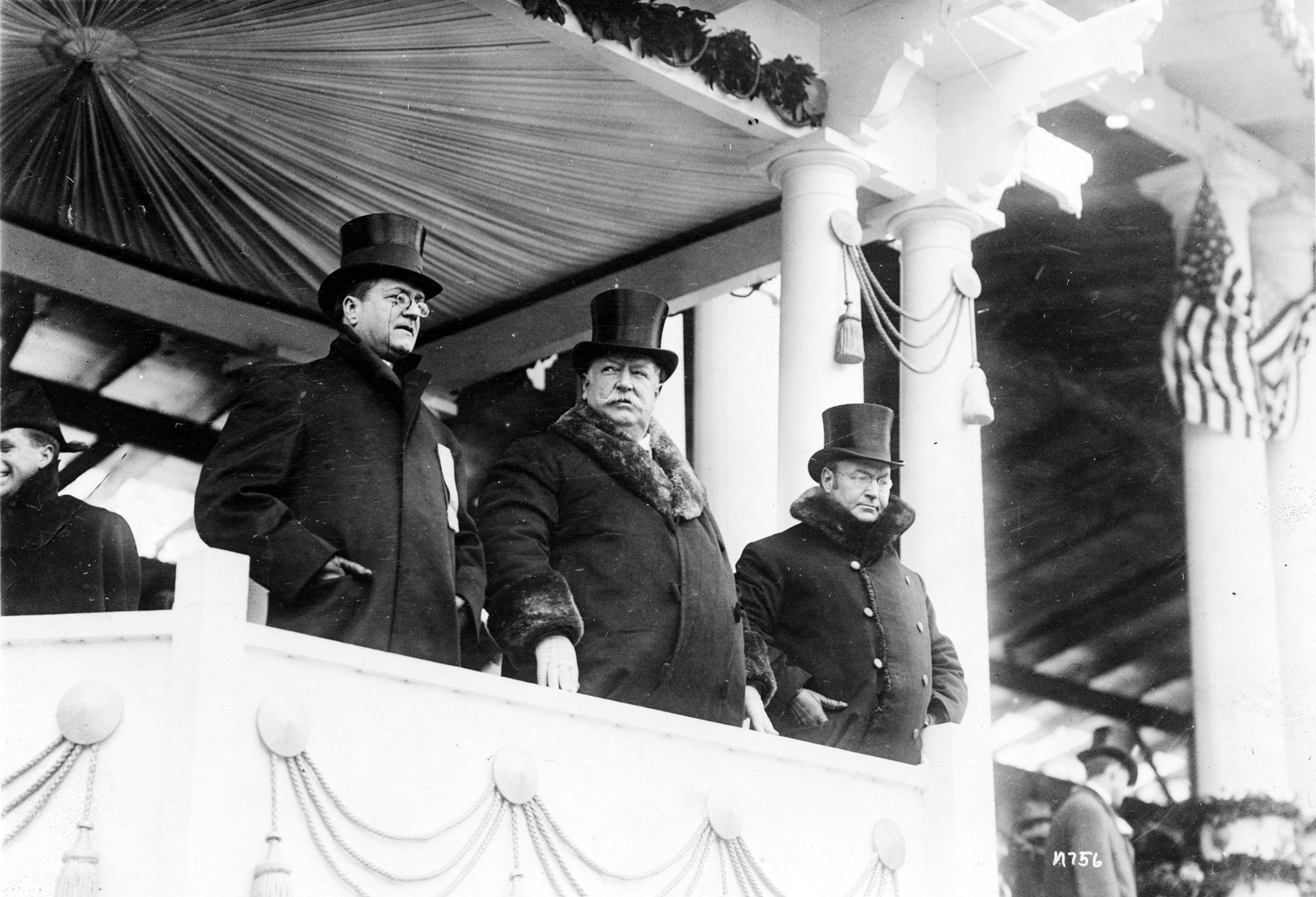
President: William H. Taft
Date: Mar. 4, 1909
What happened: A freak snowstorm forced the ceremony indoors, and Taft joked he knew it would be a “cold day in hell” when he was inaugurated.
What he said: “I have had the honor to be one of the advisers of my distinguished predecessor, and, as such, to hold up his hands in the reforms he has initiated. I should be untrue to myself, to my promises, and to the declarations of the party platform upon which I was elected to office, if I did not make the maintenance and enforcement of those reforms a most important feature of my administration. They were directed to the suppression of the lawlessness and abuses of power of the great combinations of capital invested in railroads and in industrial enterprises carrying on interstate commerce.”
1913
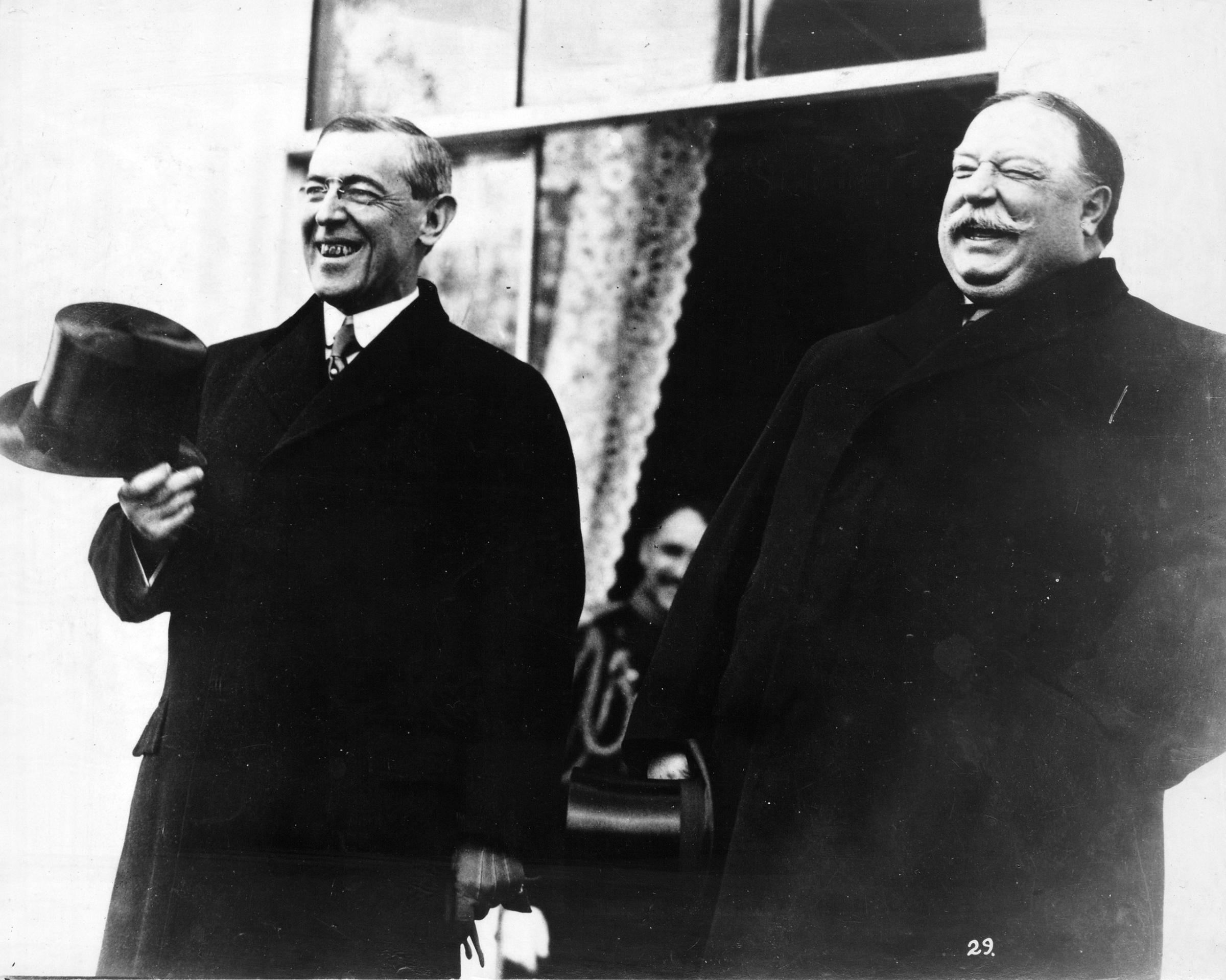
President: Woodrow Wilson
Date: Mar. 4, 1913
What happened: After six decades of parties, the Inaugural Balls were canceled, as Wilson decided they weren’t serious enough.
What he said: “This is not a day of triumph; it is a day of dedication. Here muster, not the forces of party, but the forces of humanity. Men’s hearts wait upon us; men’s lives hang in the balance; men’s hopes call upon us to say what we will do. Who shall live up to the great trust? Who dares fail to try?”
1917
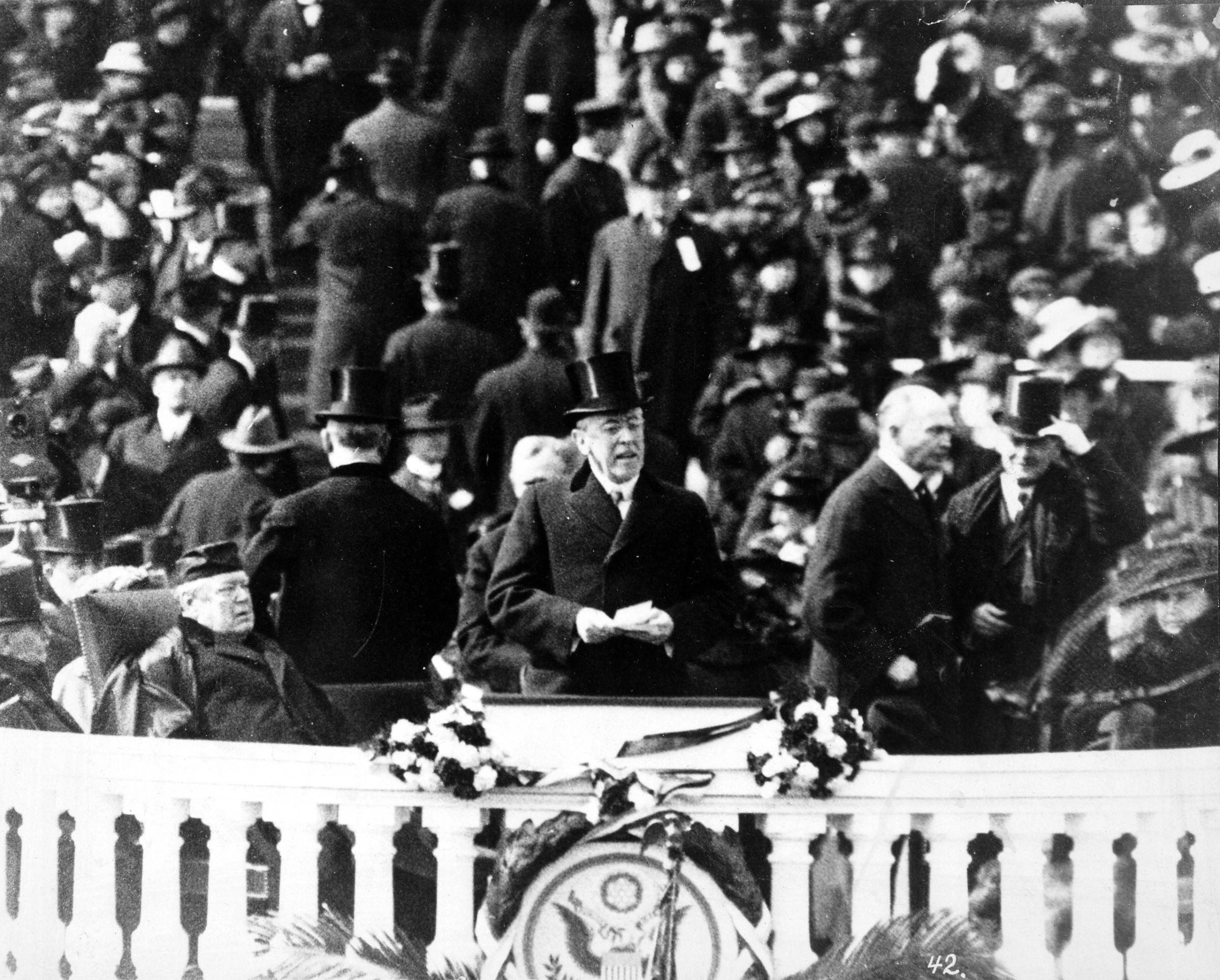
President: Woodrow Wilson
Date: Mar. 5, 1917
What happened: For the first time, the official Inaugural parade included women as participants.
What he said: “We stand firm in armed neutrality since it seems that in no other way we can demonstrate what it is we insist upon and cannot forget. We may even be drawn on, by circumstances, not by our own purpose or desire, to a more active assertion of our rights as we see them and a more immediate association with the great struggle itself. But nothing will alter our thought or our purpose. They are too clear to be obscured. They are too deeply rooted in the principles of our national life to be altered. We desire neither conquest nor advantage. We wish nothing that can be had only at the cost of another people. We always professed unselfish purpose and we covet the opportunity to prove our professions are sincere.”
1921
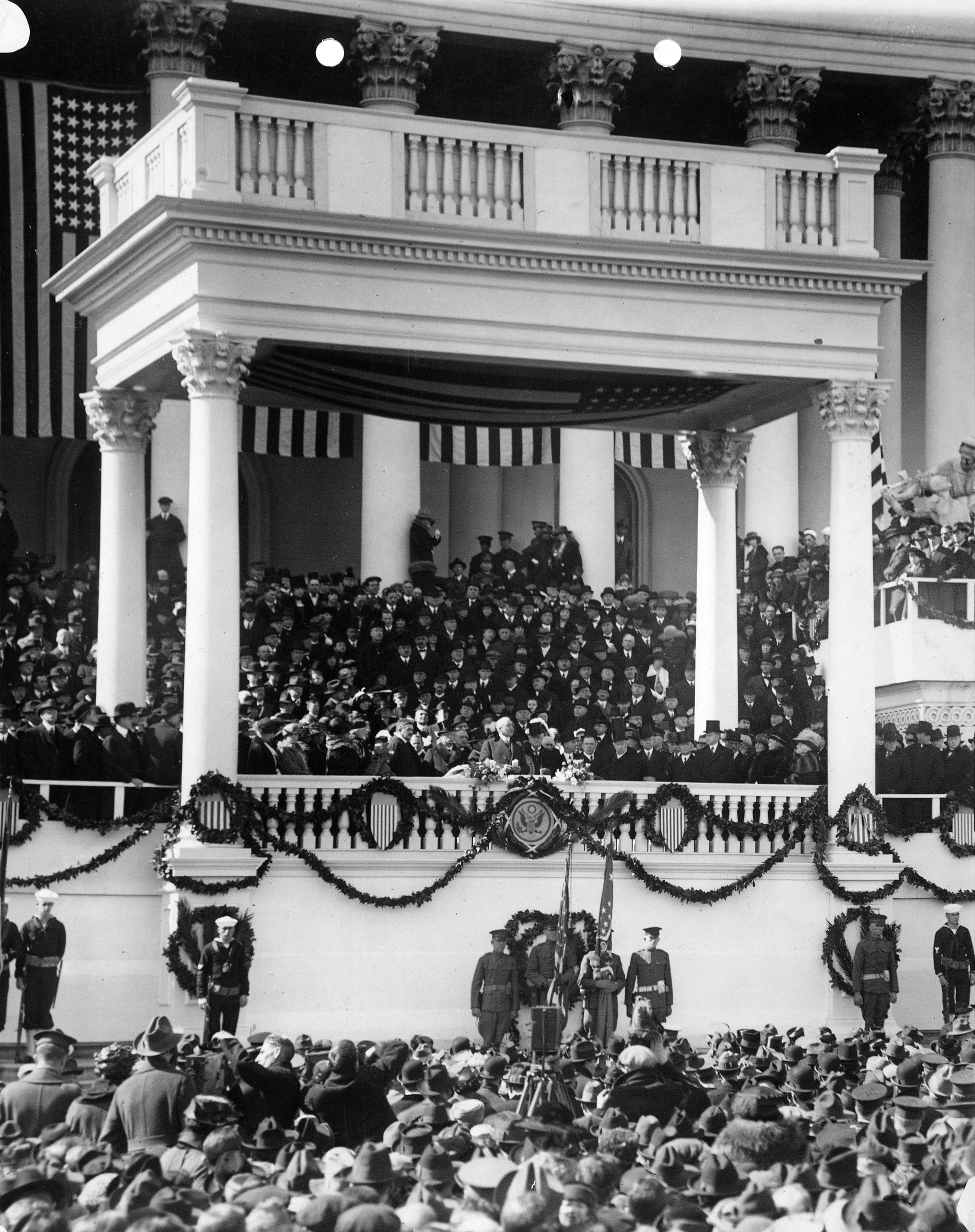
President: Warren G. Harding
Date: Mar. 4, 1921
What happened: Harding became the first to arrive at his Inaugural ceremony by car.
What he said: “When one surveys the world about him after the great storm, noting the marks of destruction and yet rejoicing in the ruggedness of the things which withstood it, if he is an American he breathes the clarified atmosphere with a strange mingling of regret and new hope. We have seen a world passion spend its fury, but we contemplate our Republic unshaken, and hold our civilization secure.”
1925
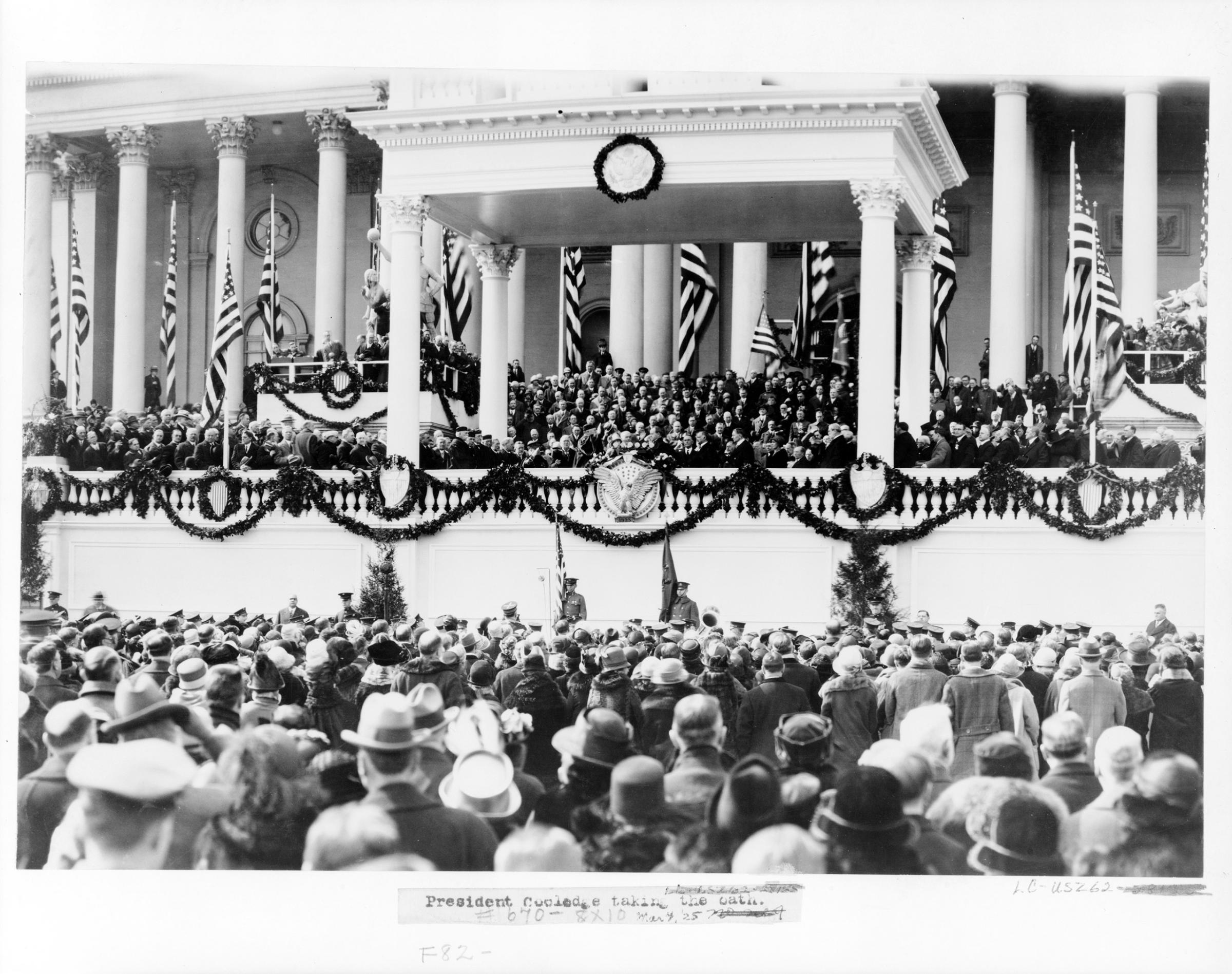
President: Calvin Coolidge
Date: Mar. 4, 1925
What happened: Coolidge’s Inauguration was the first to be broadcast on national radio.
What he said: “Our own country is leading the world in the general readjustment to the results of the great conflict. Many of its burdens will bear heavily upon us for years, and the secondary and indirect effects we must expect to experience for some time. But we are beginning to comprehend more definitely what course should be pursued, what remedies ought to be applied, what actions should be taken for our deliverance, and are clearly manifesting a determined will faithfully and conscientiously to adopt these methods of relief. Already we have sufficiently rearranged our domestic affairs so that confidence has returned, business has revived, and we appear to be entering an era of prosperity which is gradually reaching into every part of the Nation.”
1929
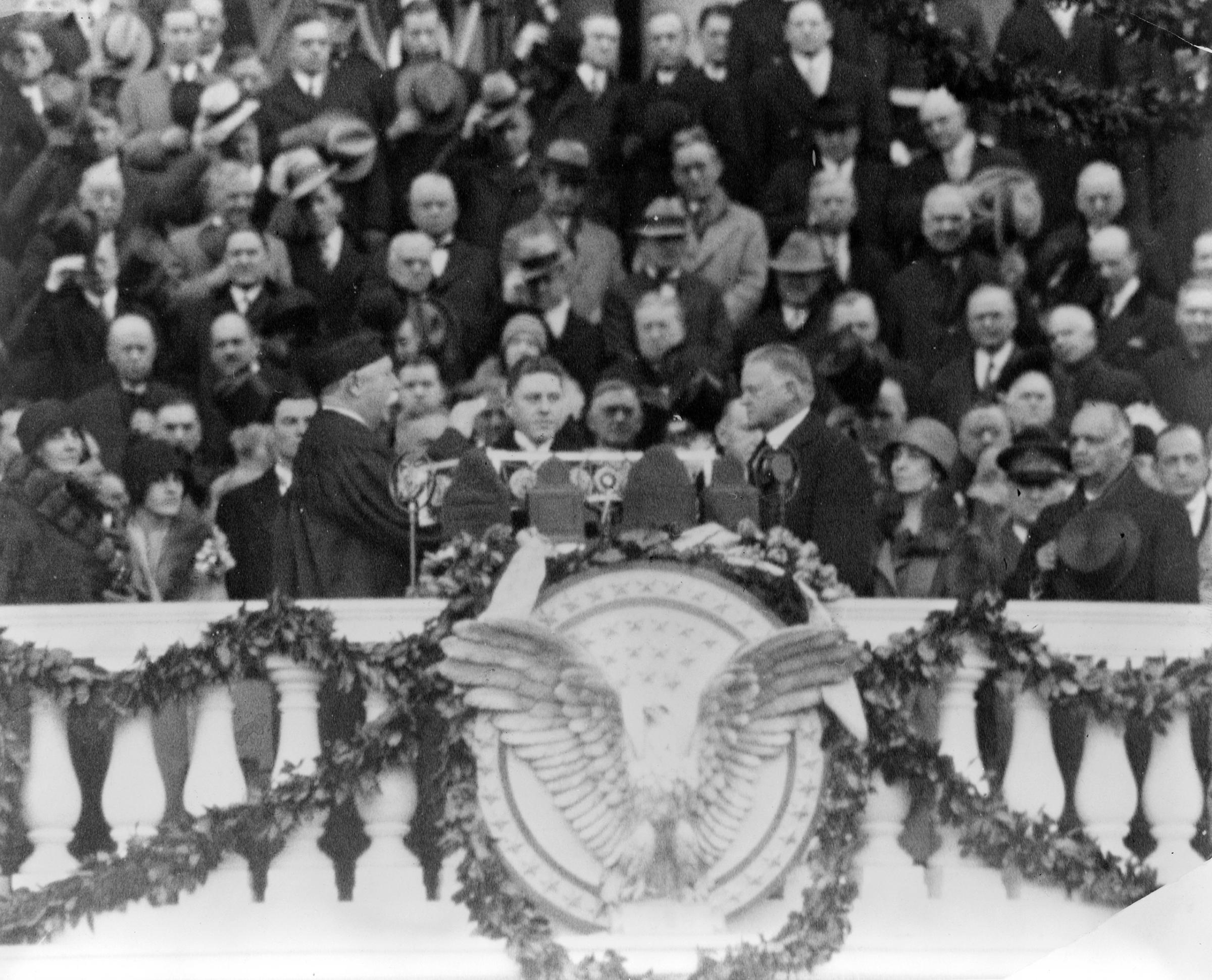
President: Herbert Hoover
Date: Mar. 4, 1929
What happened: A schoolgirl thought she caught a mistake in the Oath of Office, and wrote to the Chief Justice about it—and was proved was right.
What he said: “Of the undoubted abuses which have grown up under the 18th amendment, part are due to the causes I have just mentioned; but part are due to the failure of some States to accept their share of responsibility for concurrent enforcement and to the failure of many State and local officials to accept the obligation under their oath of office zealously to enforce the laws. With the failures from these many causes has come a dangerous expansion in the criminal elements who have found enlarged opportunities in dealing in illegal liquor.”
1933
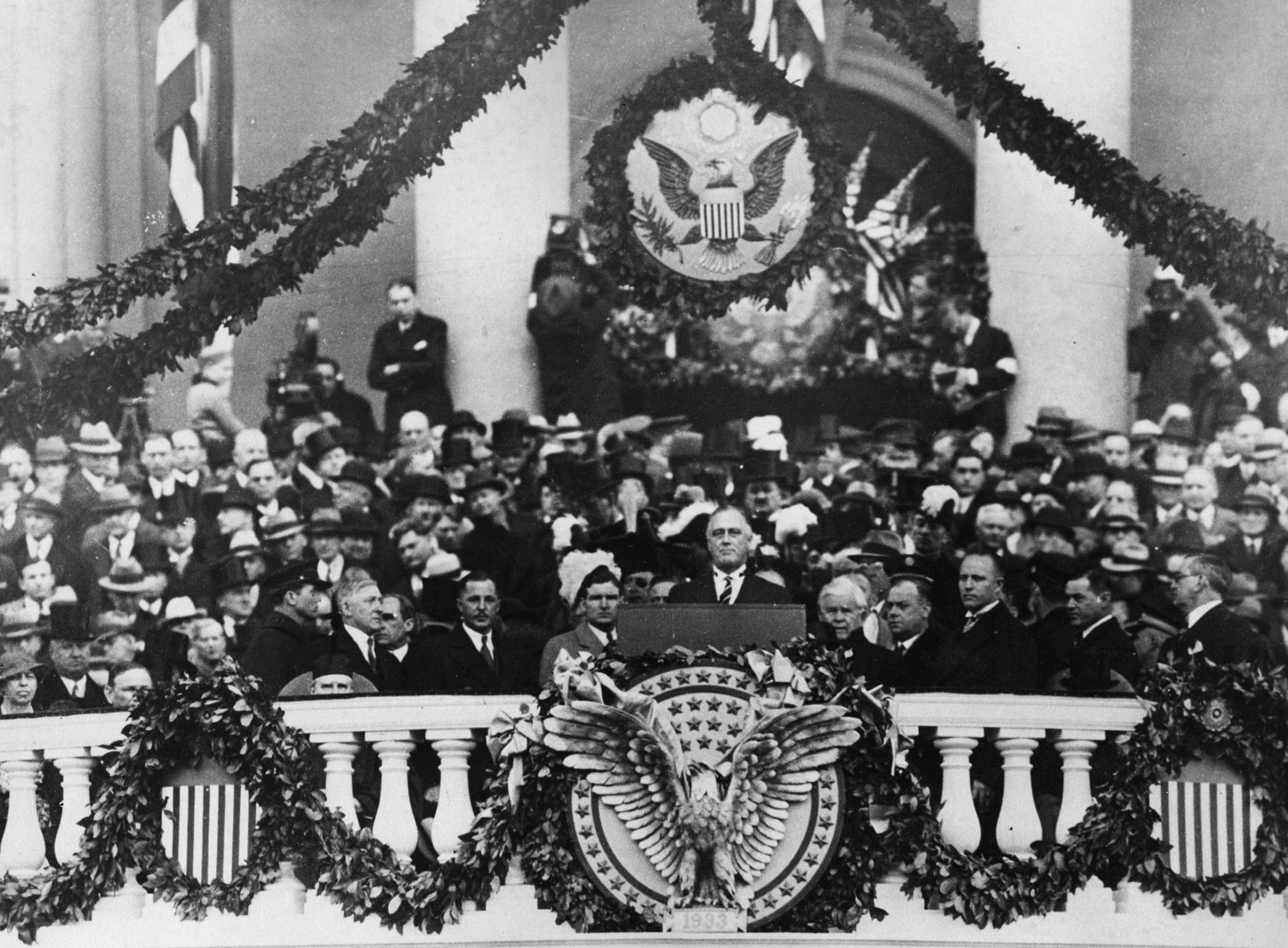
President: Franklin D. Roosevelt
Date: Mar. 4, 1933
What happened: As at George Washington’s first inauguration, the intended Bible was forgotten. One was borrowed.
What he said: “So, first of all, let me assert my firm belief that the only thing we have to fear is fear itself—nameless, unreasoning, unjustified terror which paralyzes needed efforts to convert retreat into advance.”
1937
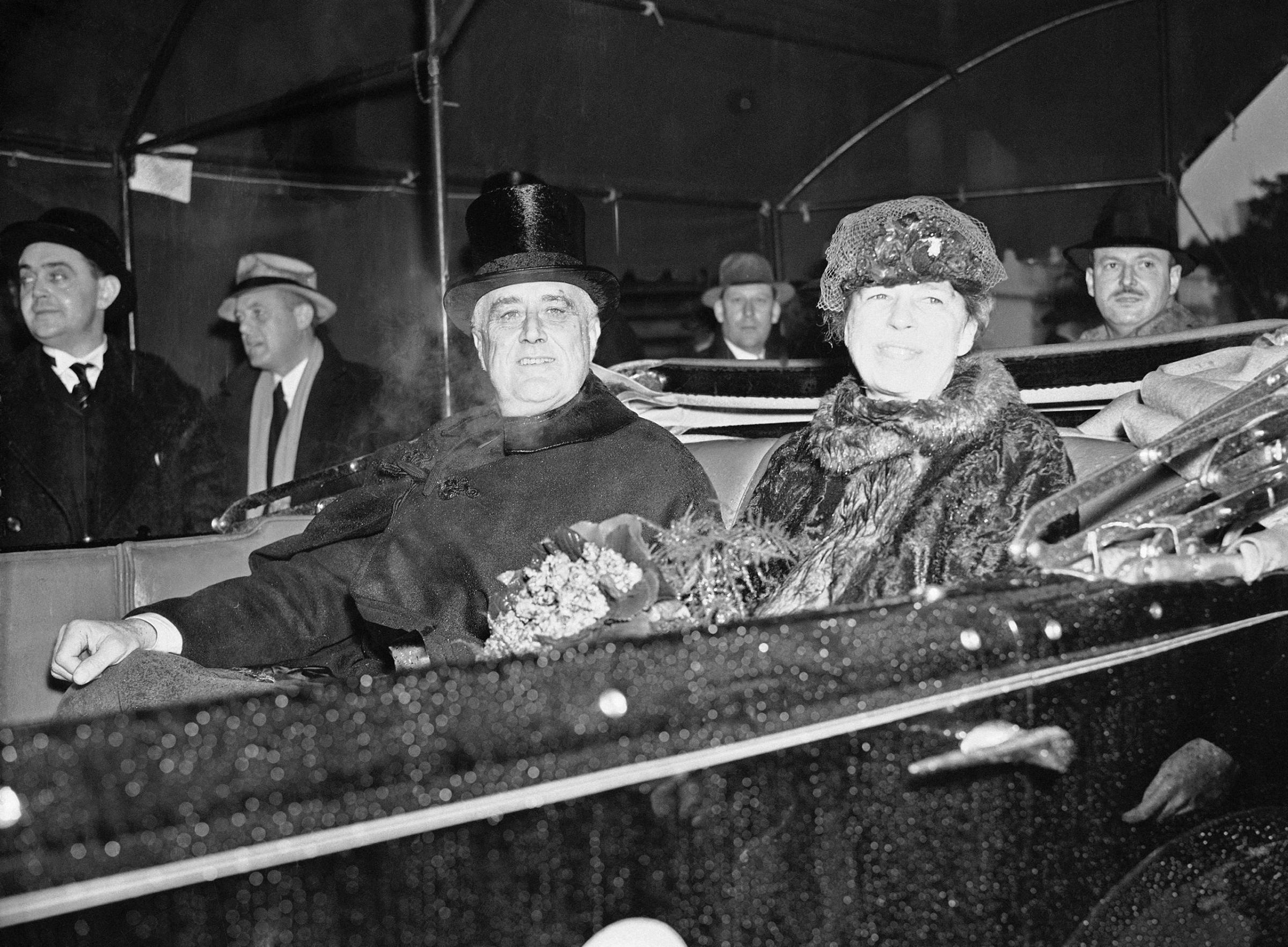
President: Franklin D. Roosevelt
Date: Jan. 20, 1937
What happened: For the first time, following the passage of the 20th Amendment, the Inauguration was held in January, not March.
What he said: “Today we reconsecrate our country to long-cherished ideals in a suddenly changed civilization. In every land there are always at work forces that drive men apart and forces that draw men together. In our personal ambitions we are individualists. But in our seeking for economic and political progress as a nation, we all go up, or else we all go down, as one people.”
1941
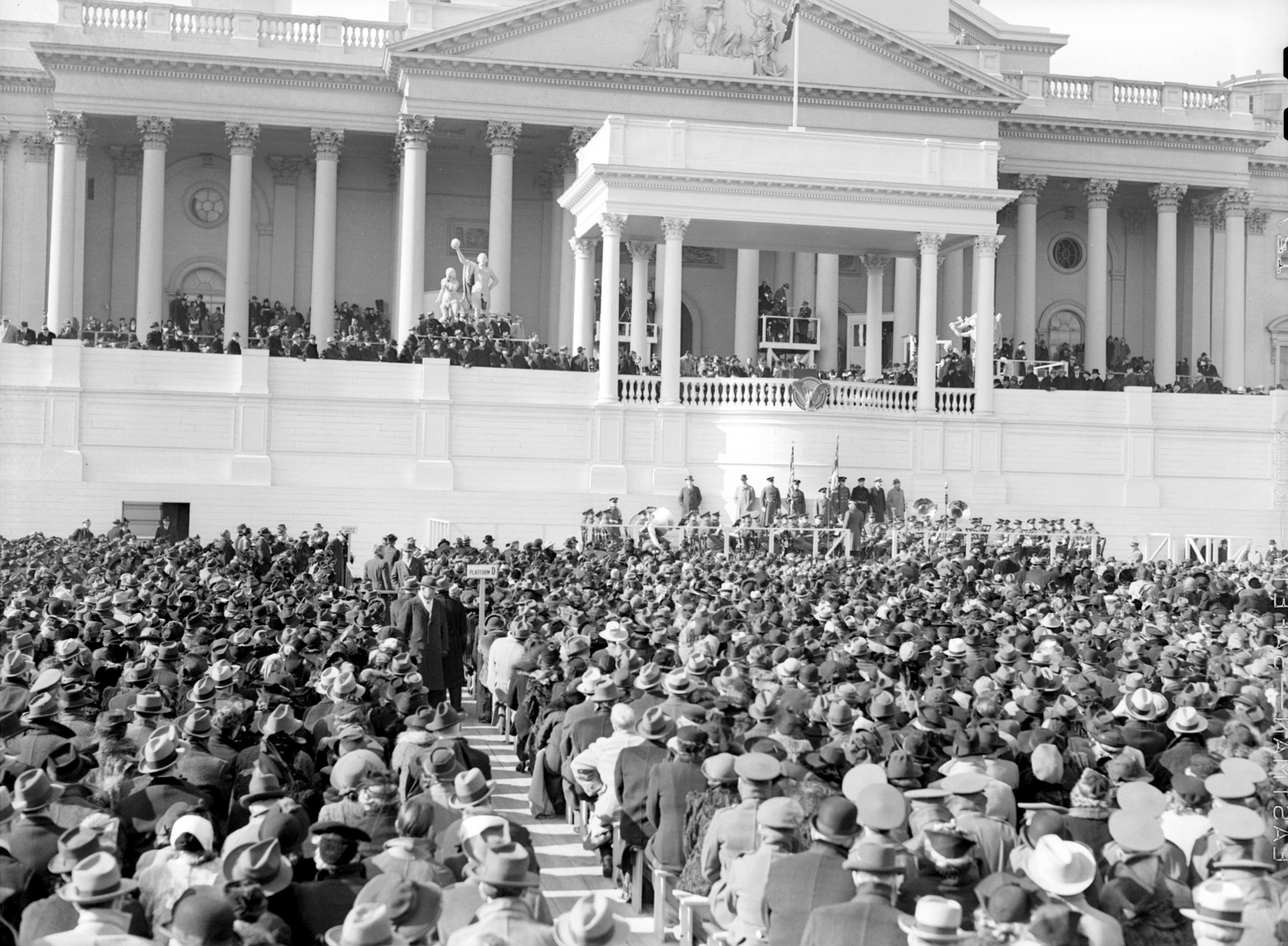
President: Franklin D. Roosevelt
Date: Jan. 20, 1941
What happened: Many observers noted that, back in 1937, FDR had said that his “great ambition on Jan. 20, 1941, is to turn over this desk and chair in the White House to my successor, whoever he may be.”
What he said: “To us there has come a time, in the midst of swift happenings, to pause for a moment and take stock—to recall what our place in history has been, and to rediscover what we are and what we may be. If we do not, we risk the real peril of isolation, the real peril of inaction.”
1945
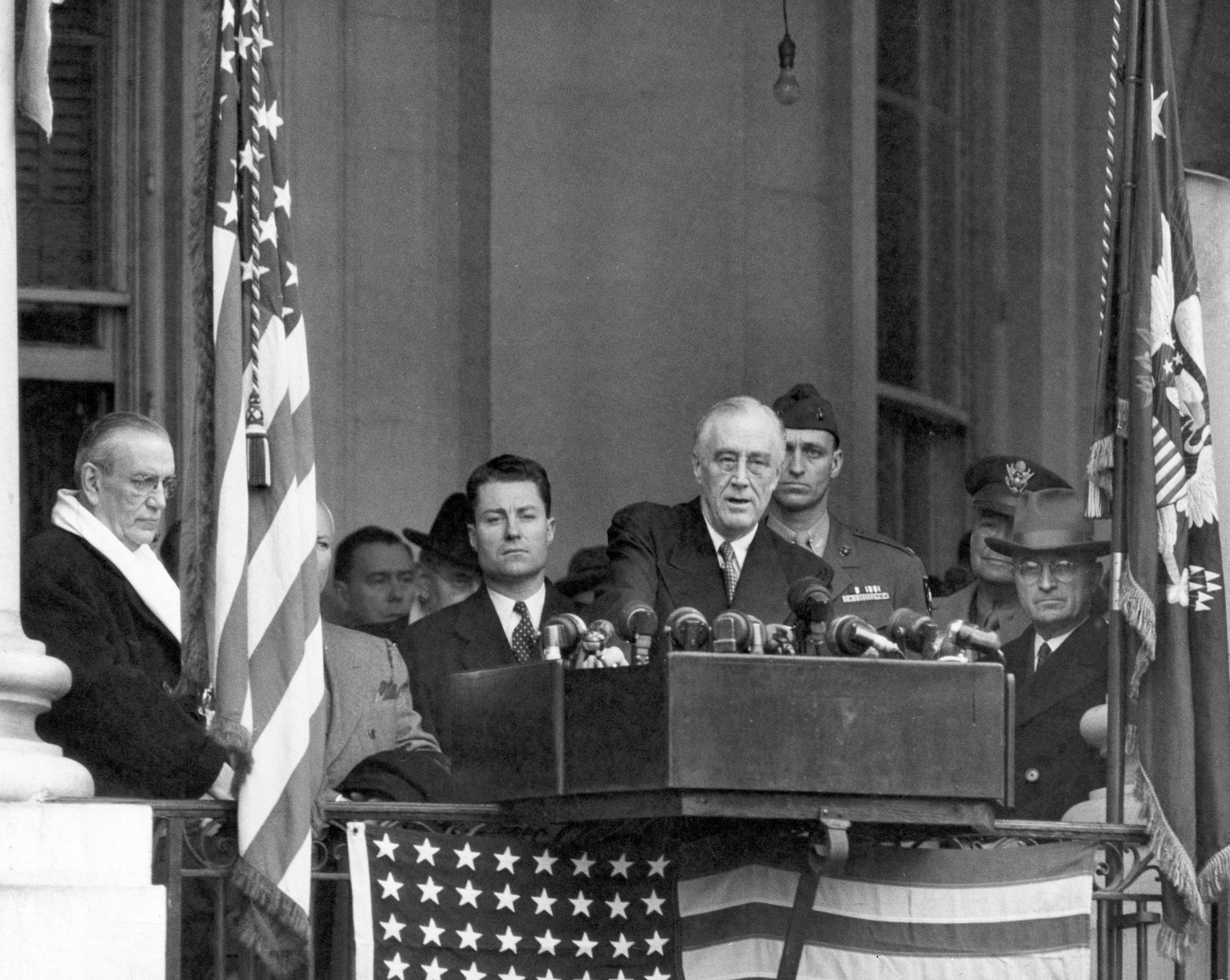
President: Franklin D. Roosevelt
Date: Jan. 20, 1945
What happened: Considering the ongoing war and the President’s failing health, the Inauguration was a relatively small-scale affair. TIME observed that only two top hats were visible (FDR wore a business suit rather than formal wear) and that “those on the portico could see what a supreme effort it takes to hoist himself up.”
What he said: “We shall strive for perfection. We shall not achieve it immediately-but we still shall strive. We may make mistakes—but they must never be mistakes which result from faintness of ‘heart or abandonment of moral principle.”
1949
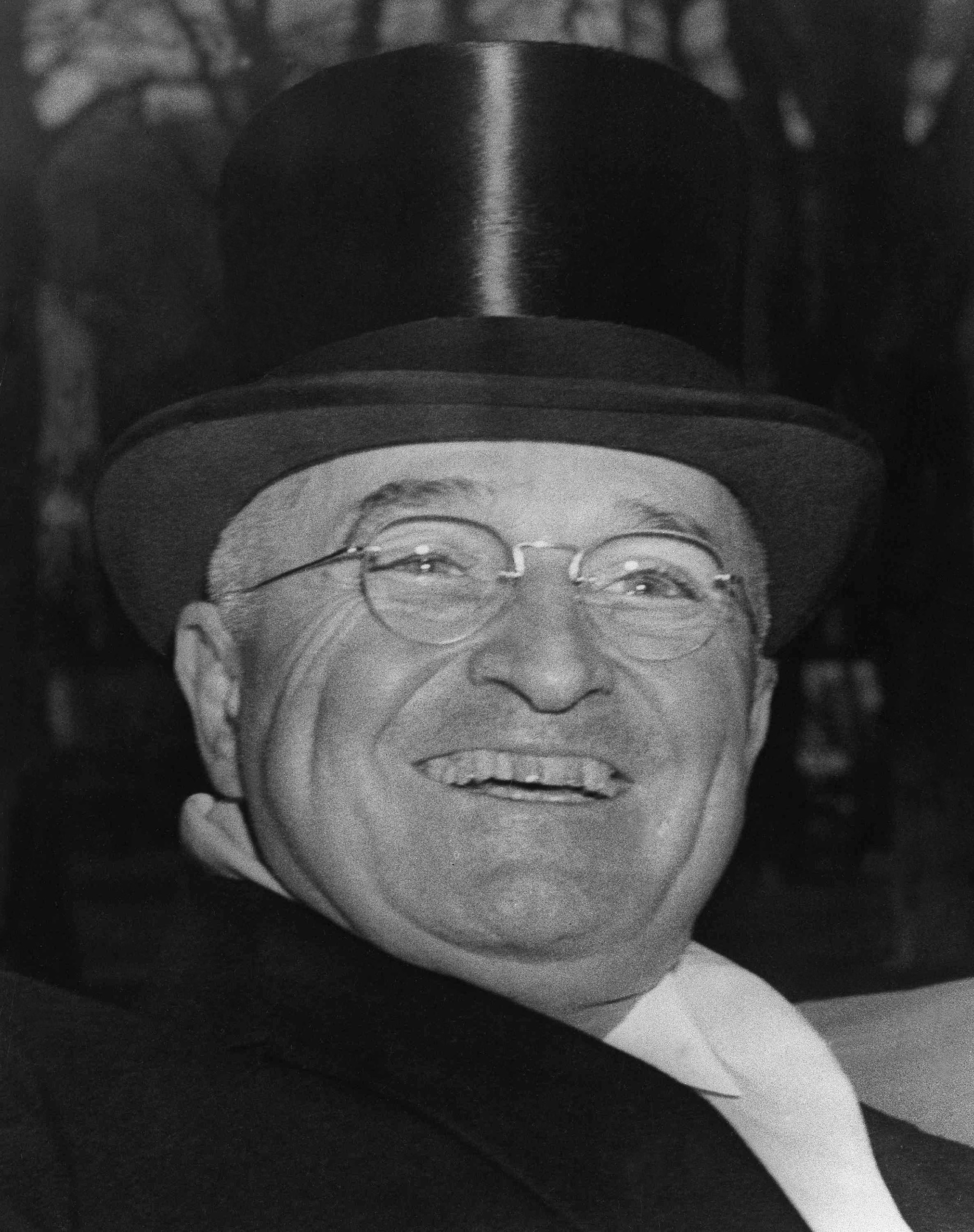
President: Harry Truman
Date: Jan. 20, 1949
What happened: Harry Truman’s 1949 inauguration was the first to be fully integrated, with all events and hotels open to minorities.
What he said: “In the pursuit of these aims, the United States and other like-minded nations find themselves directly opposed by a regime with contrary aims and a totally different concept of life. That regime adheres to a false philosophy which purports to offer freedom, security, and greater opportunity to mankind. Misled by that philosophy, many peoples have sacrificed their liberties only to learn to their sorrow that deceit and mockery, poverty and tyranny, are their reward. That false philosophy is communism.”
1953
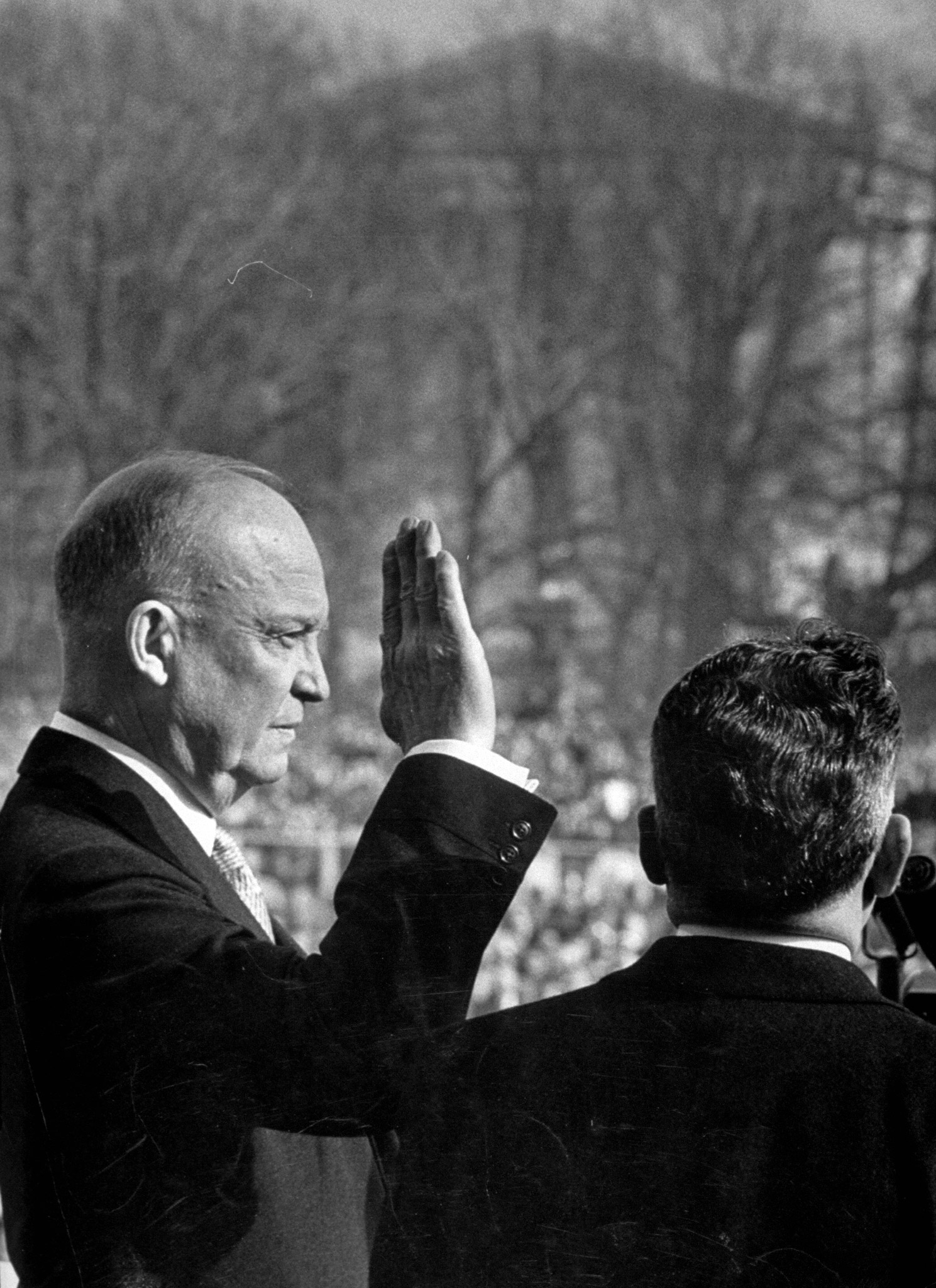
President: Dwight D. Eisenhower
Date: Jan. 20, 1953
What happened: Eisenhower made news by asking men to wear homburg hats rather than silk top hats.
What he said: “For our own country, it has been a time of recurring trial. We have grown in power and in responsibility. We have passed through the anxieties of depression and of war to a summit unmatched in man’s history. Seeking to secure peace in the world, we have had to fight through the forests of the Argonne to the shores of Iwo Jima, and to the cold mountains of Korea. In the swift rush of great events, we find ourselves groping to know the full sense and meaning of these times in which we live.”
1957
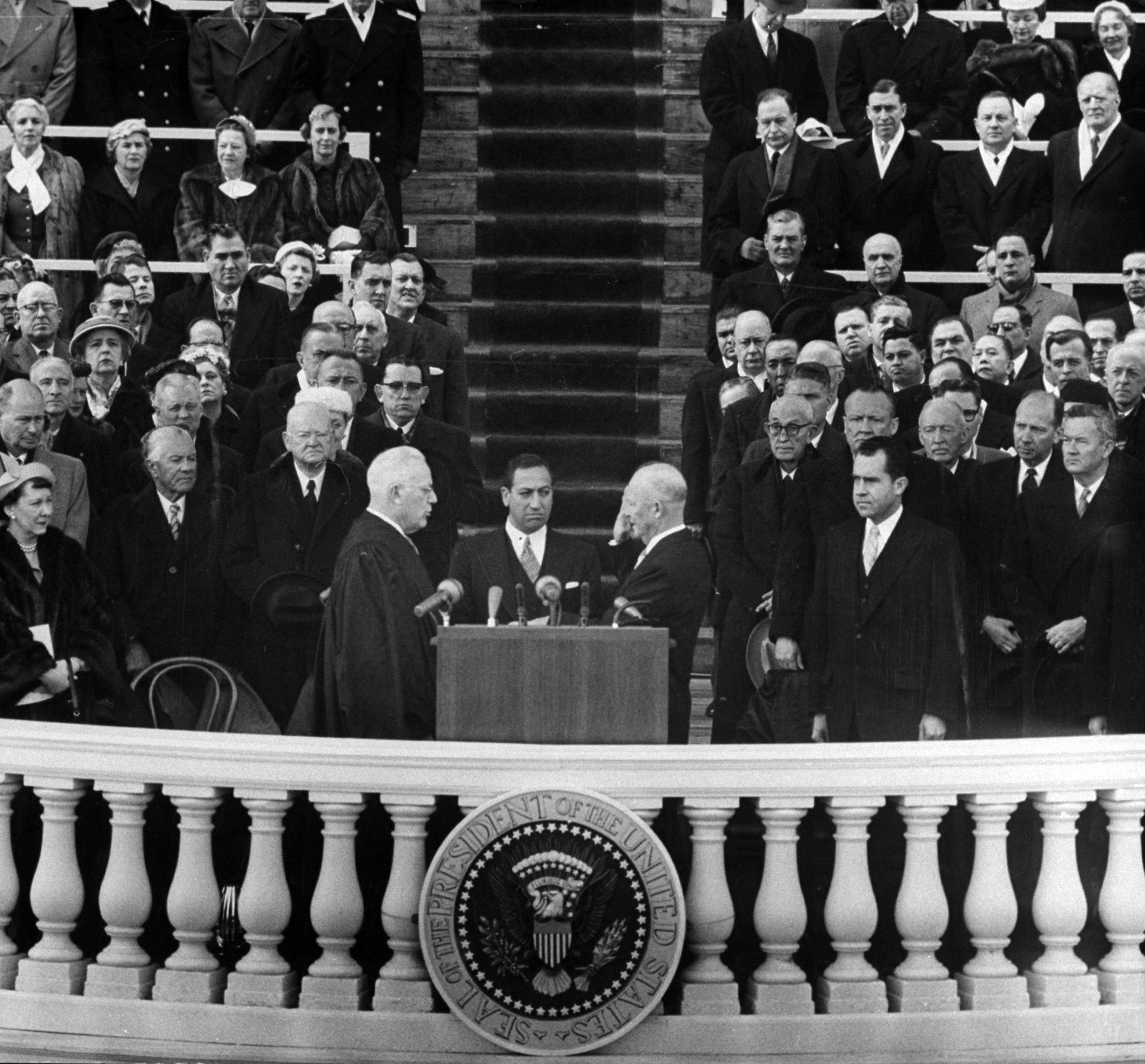
President: Dwight D. Eisenhower
Date: Jan. 21, 1957, following a private swearing-in the day before (which was a Sunday).
What happened: Parade highlights included two circus elephants.
What he said: “And so the prayer of our people carries far beyond our own frontiers, to the wide world of our duty and our destiny. May the light of freedom, coming to all darkened lands, flame brightly—until at last the darkness is no more. May the turbulence of our age yield to a true time of peace, when men and nations shall share a life that honors the dignity of each, the brotherhood of all.”
1961

President: John F. Kennedy
Date: Jan. 20, 1961
What happened: Robert Frost became the first poet to read as part of an Inaugural program.
What he said: “And so, my fellow Americans: ask not what your country can do for you—ask what you can do for your country.”
1965
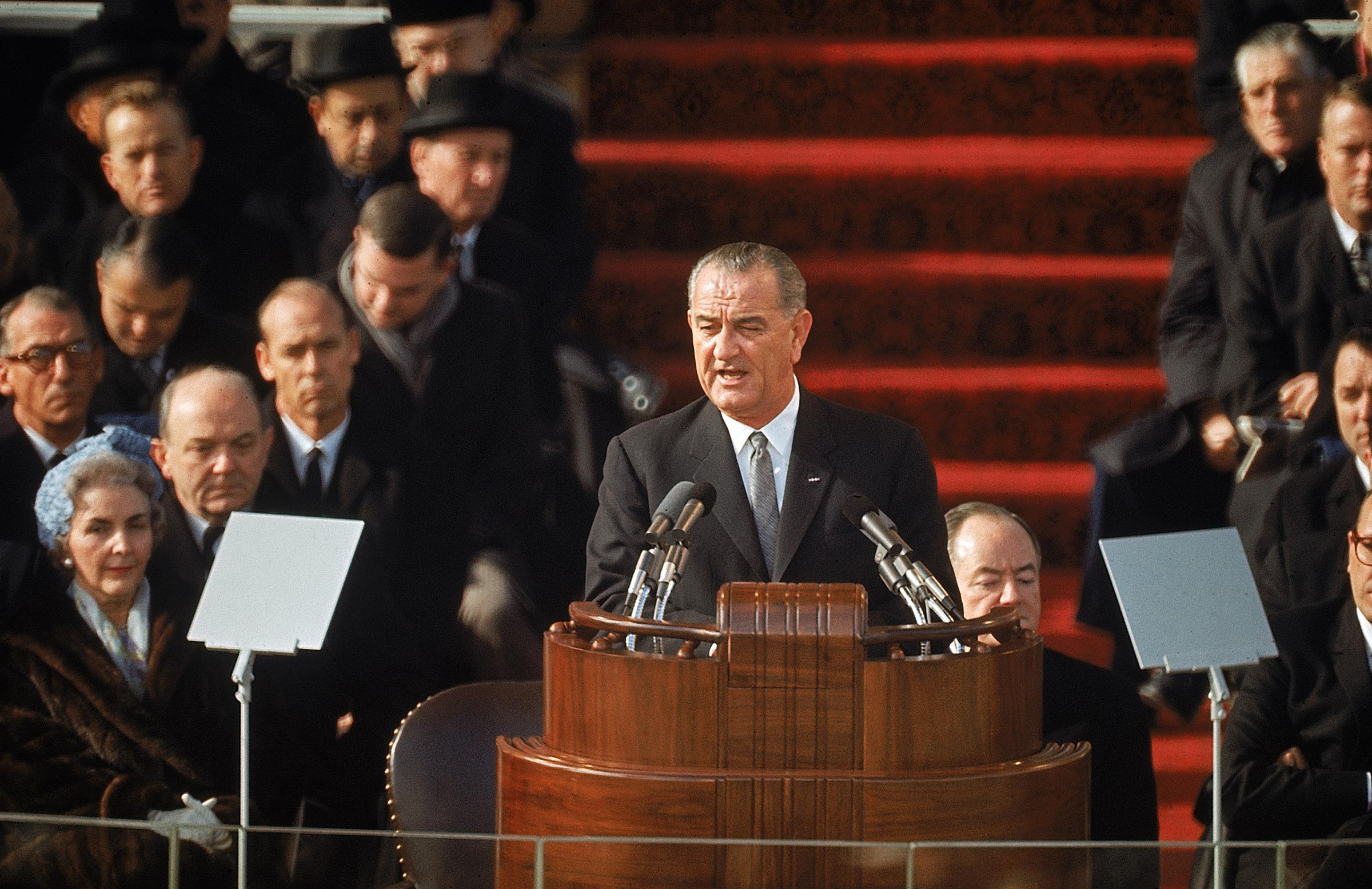
President: Lyndon B. Johnson
Date: Jan. 20, 1965
What happened: For the first time, the limousine used by the President was bulletproof.
What he said: “I do not believe that the Great Society is the ordered, changeless, and sterile battalion of the ants. It is the excitement of becoming—always becoming, trying, probing, falling, resting, and trying again—but always trying and always gaining”
1969
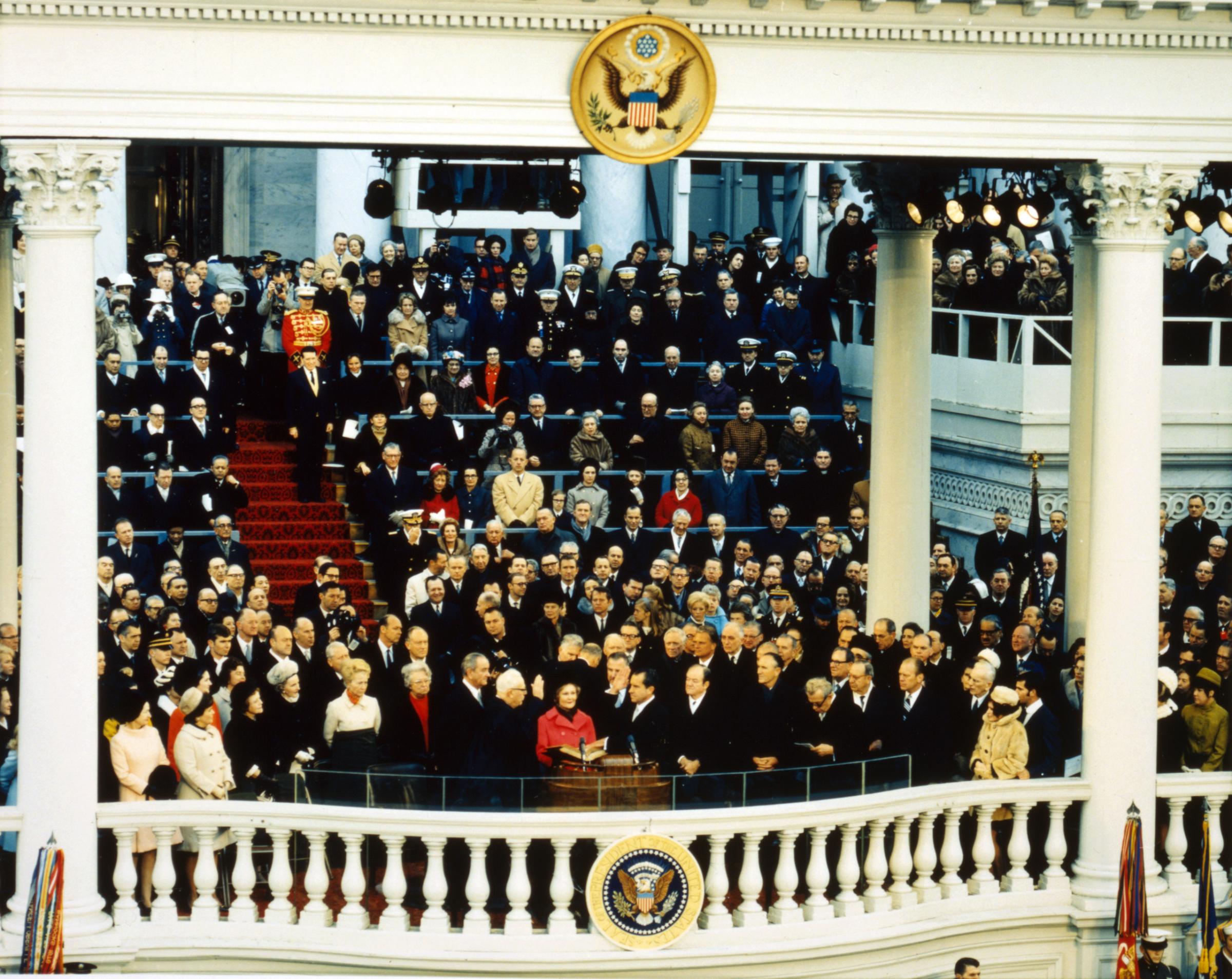
President: Richard Nixon
Date: Jan. 20, 1969
What happened: “It was the first time in memory that anyone had tried to disrupt an inaugural parade,” TIME noted after an estimated 1,000 protesters showed up.
What he said: “We have endured a long night of the American spirit. But as our eyes catch the dimness of the first rays of dawn, let us not curse the remaining dark. Let us gather the light.”
1973
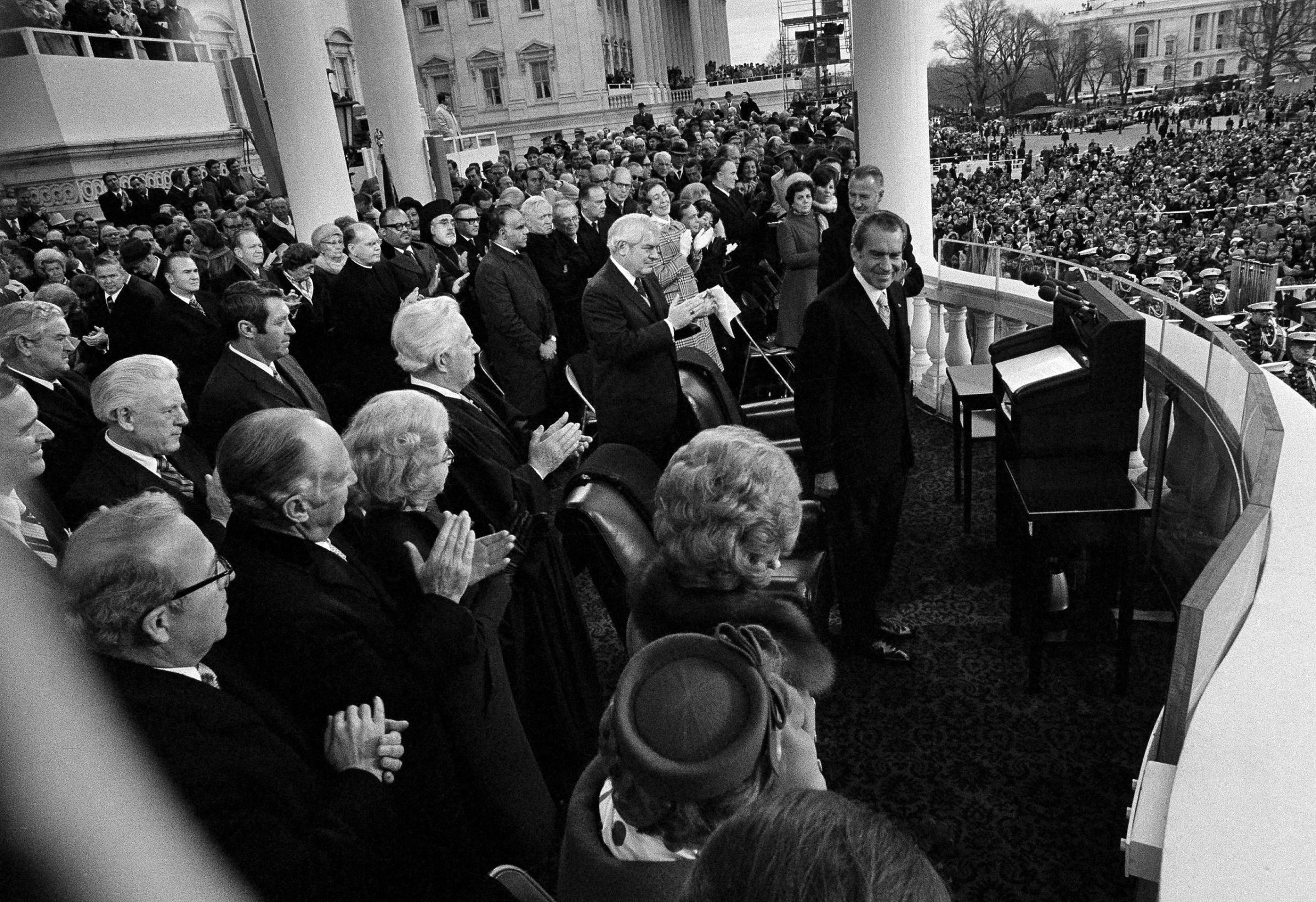
President: Richard Nixon
Date: Jan. 20, 1973
What happened: Dozens of Congressmen (reports differ on the exact number) boycotted the ceremonies due to the war in Vietnam.
What he said: “At every turn we have been beset by those who find everything wrong with America and little that is right. But I am confident that this will not be the judgment of history on these remarkable times in which we are privileged to live.”
1977
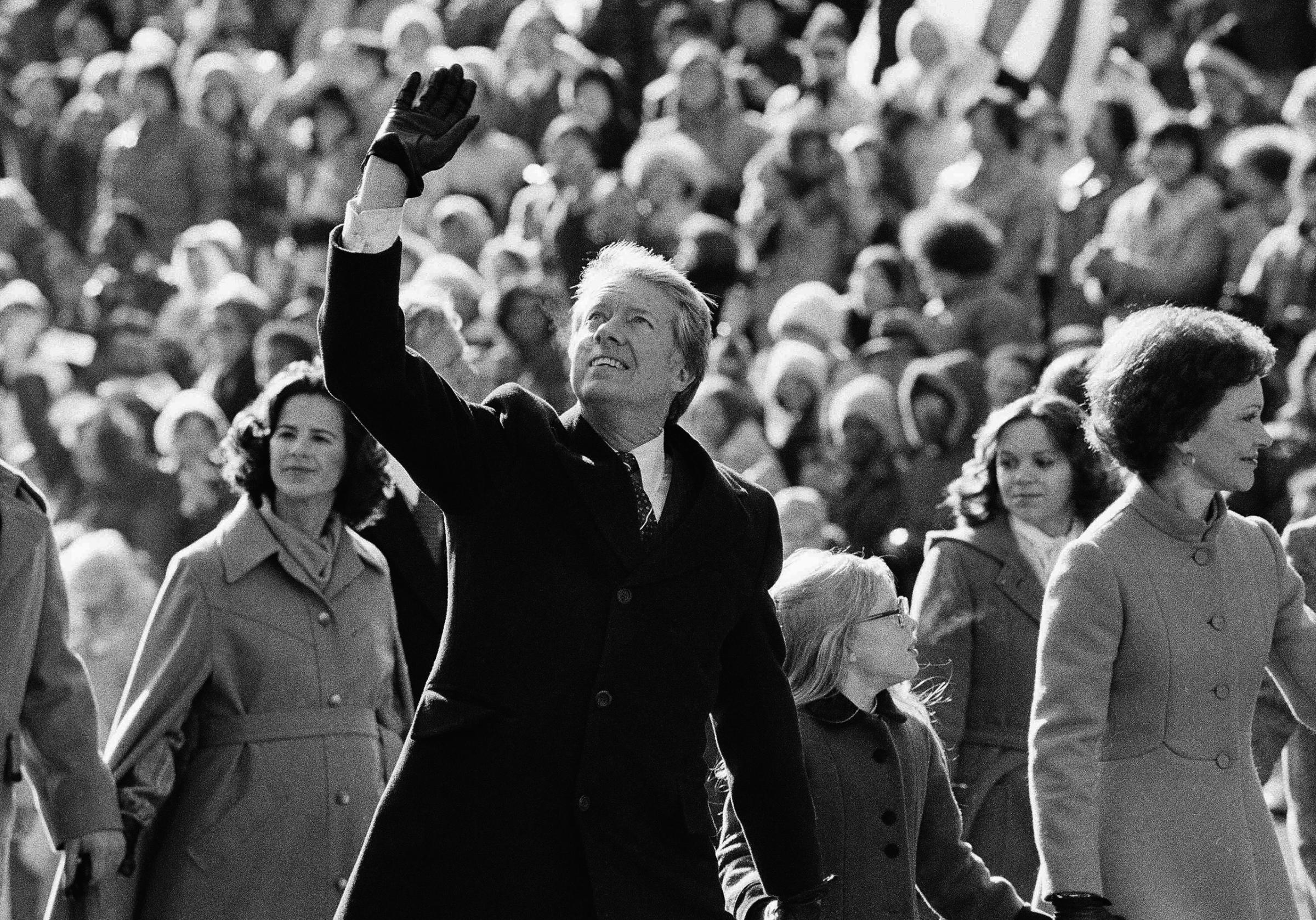
President: Jimmy Carter
Date: Jan. 20, 1977
What happened: In a symbolic move, Jimmy Carter and his family broke from tradition and walked from the Capitol to the White House rather than riding in a car.
What he said: “Let our recent mistakes bring a resurgent commitment to the basic principles of our Nation, for we know that if we despise our own government, we have no future. We recall in special times when we have stood briefly, but magnificently, united. In those times no prize was beyond our grasp.”
1981
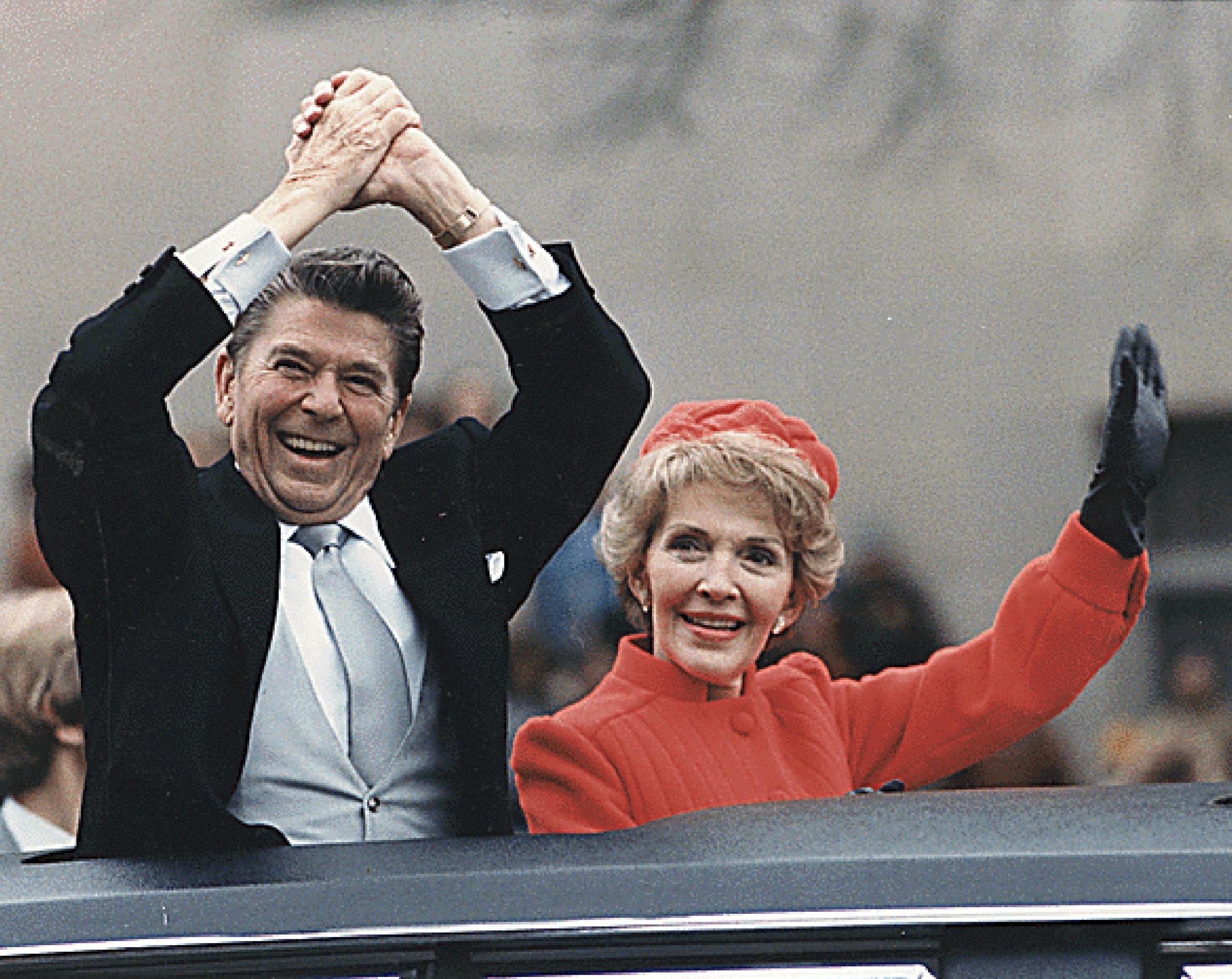
President: Ronald Reagan
Date: Jan. 20, 1981
What happened: Inauguration Day was dubbed “America’s Incredible Day” by TIME after it saw not only the beginning of a new presidency but also the end of the Iran hostage crisis.
What he said: “In this present crisis, government is not the solution to our problem; government is the problem.”
1985
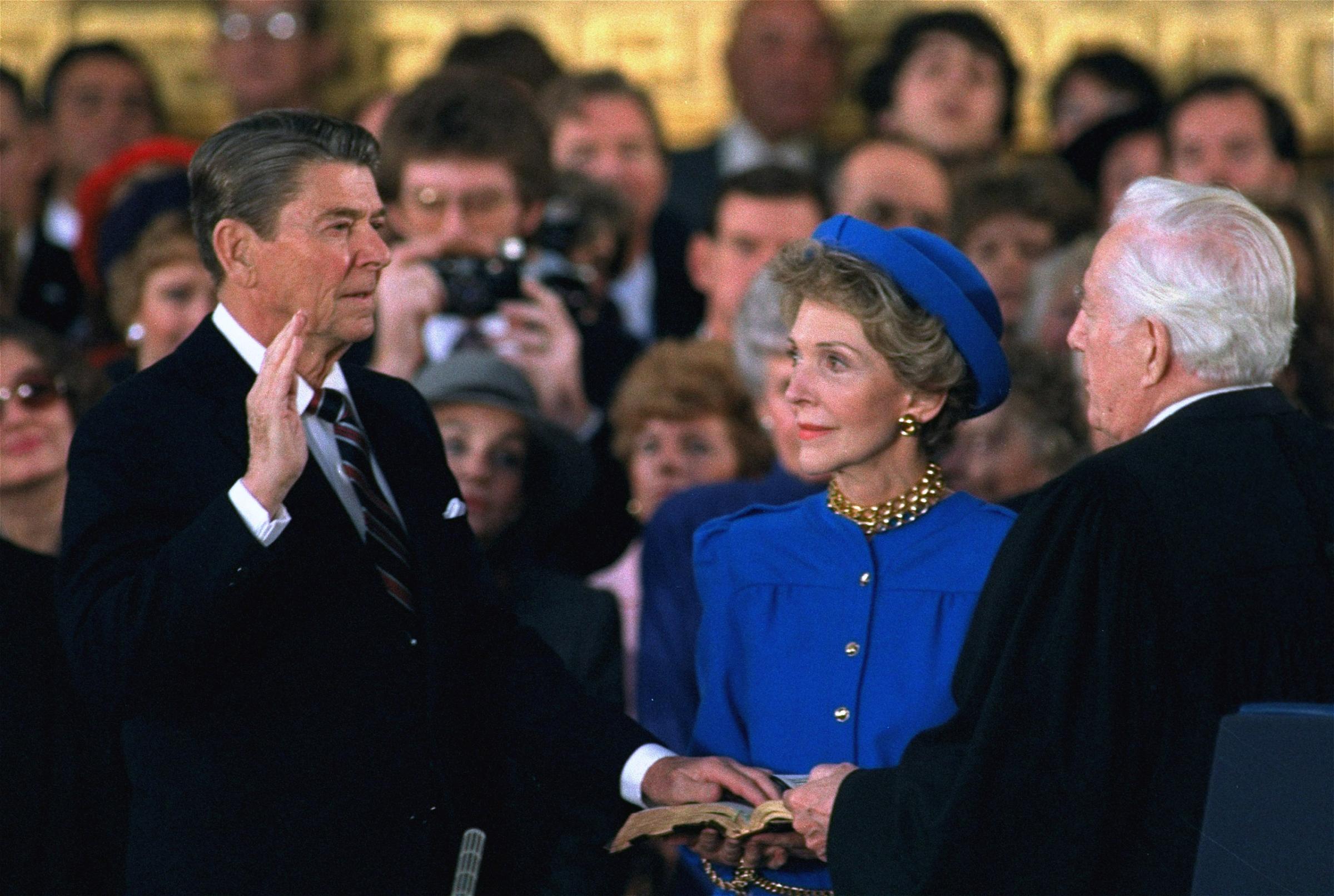
President: Ronald Reagan
Date: Jan. 20, 1985
What happened: This year saw the coldest Inauguration Day on record, with wind chill driving the feel of the day down as low as 20° below zero at points.
What he said: “So, we go forward today, a nation still mighty in its youth and powerful in its purpose. With our alliances strengthened, with our economy leading the world to a new age of economic expansion, we look to a future rich in possibilities. And all of this is because we worked and acted together, not as members of political parties but as Americans.”
1989
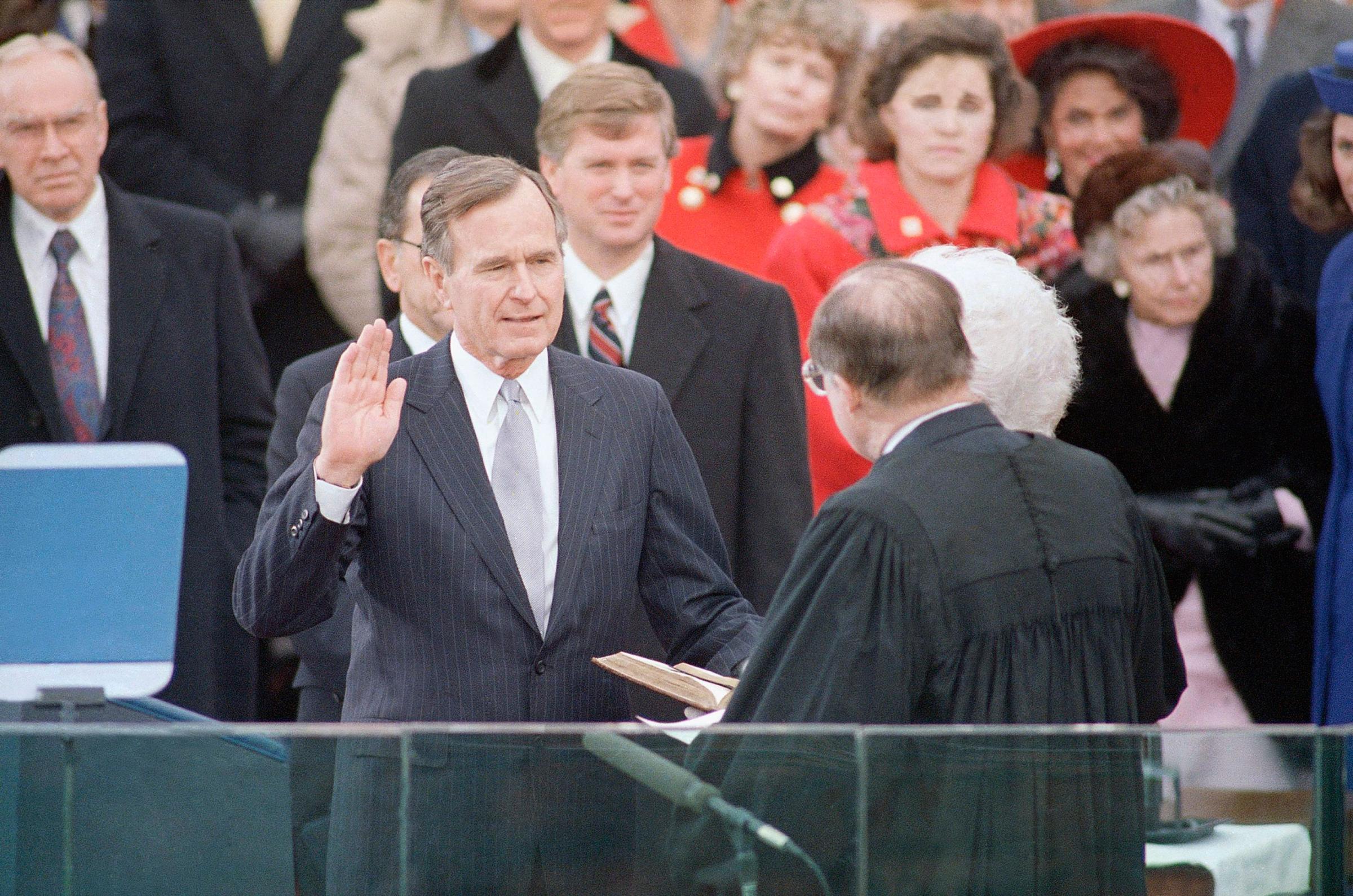
President: George H.W. Bush
Date: Jan. 20, 1989
What happened: To match the theme of his speech (see below), Bush was celebrated with fireworks—precisely 100 shells, each with 10 flares.
What he said: “I have spoken of a Thousand Points of Light, of all the community organizations that are spread like stars throughout the Nation, doing good. We will work hand in hand, encouraging, sometimes leading, sometimes being led, rewarding.”
1993
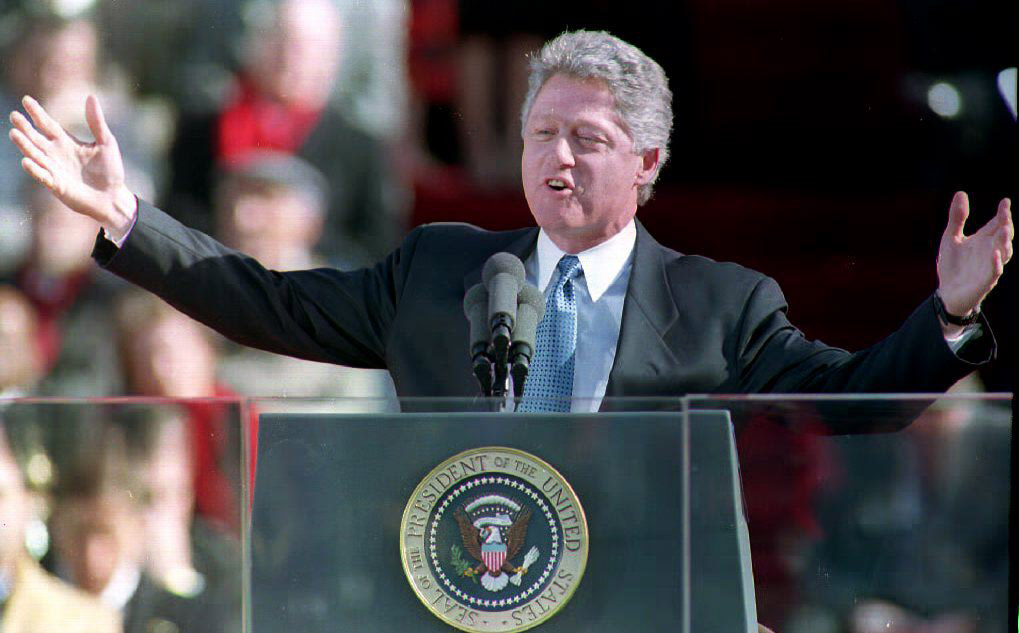
President: Bill Clinton
Date: Jan. 20, 1993
What happened: A celeb-heavy program included appearances by Michael Jackson, Barbra Streisand and Kermit the Frog.
What he said: “Our democracy must be not only the envy of the world but the engine of our own renewal. There is nothing wrong with America that cannot be cured by what is right with America.”
1997
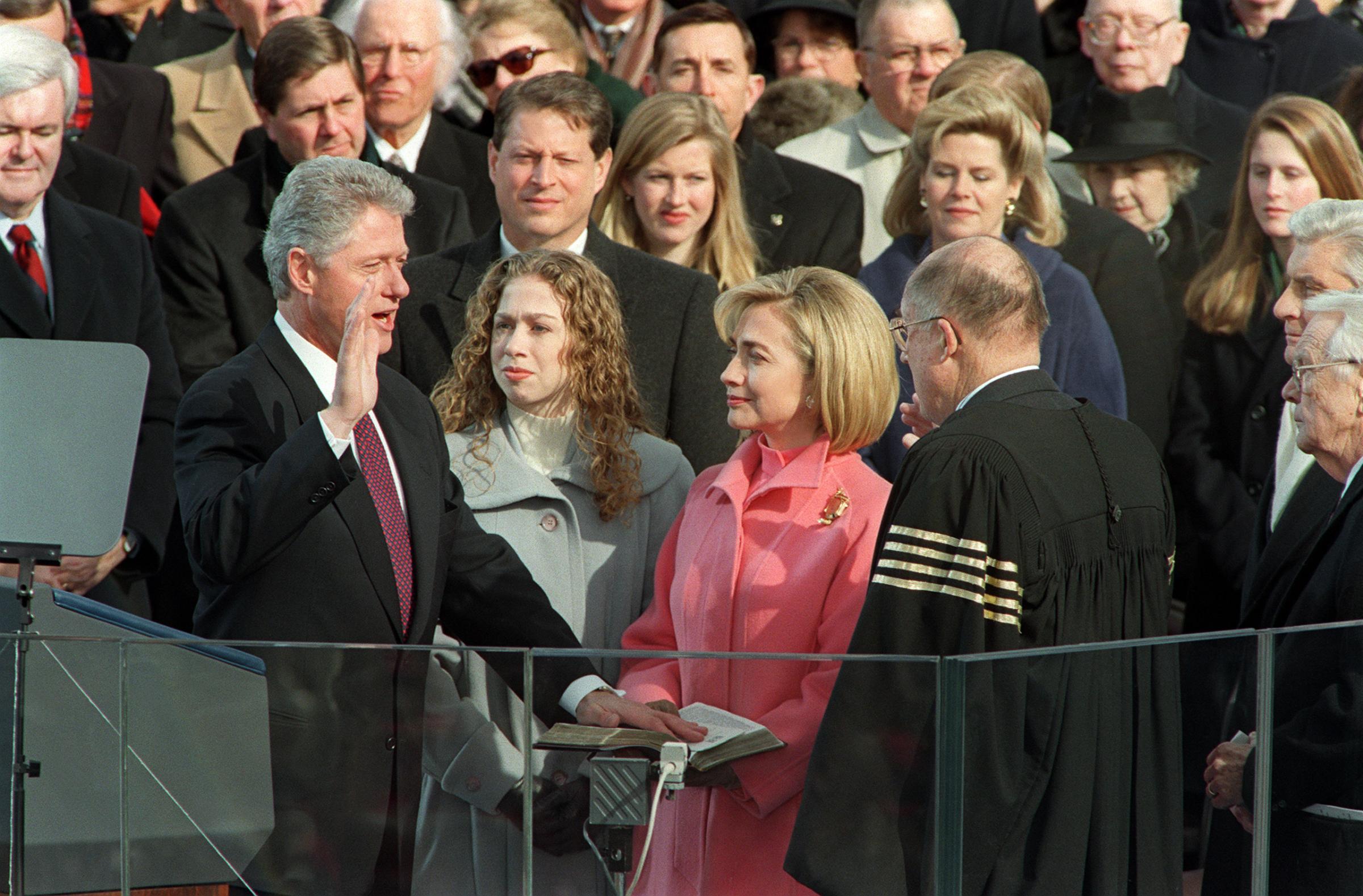
President: Bill Clinton
Date: Jan. 20, 1997
What happened: For the first time, the Inauguration was broadcast live online.
What he said: “Let us shape the hope of this day into the noblest chapter in our history. Yes, let us build our bridge, a bridge wide enough and strong enough for every American to cross over to a blessed land of new promise.”
2001
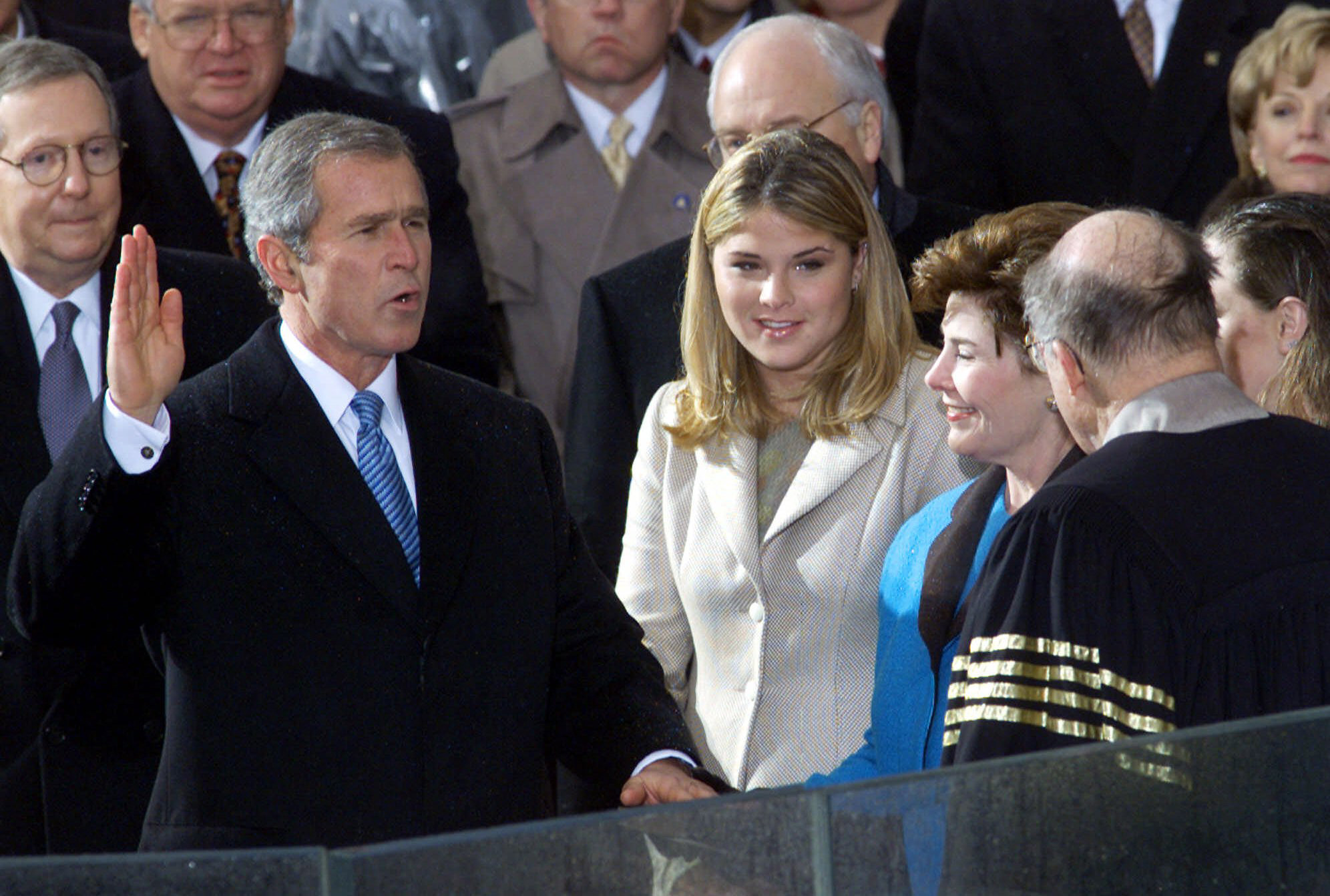
President: George W. Bush
Date: Jan. 20, 2001
What happened: A whopping 35,000 roses were used in the festivities.
What he said: “Today we affirm a new commitment to live out our Nation’s promise through civility, courage, compassion, and character. America at its best matches a commitment to principle with a concern for civility. A civil society demands from each of us good will and respect, fair dealing and forgiveness.”
2005
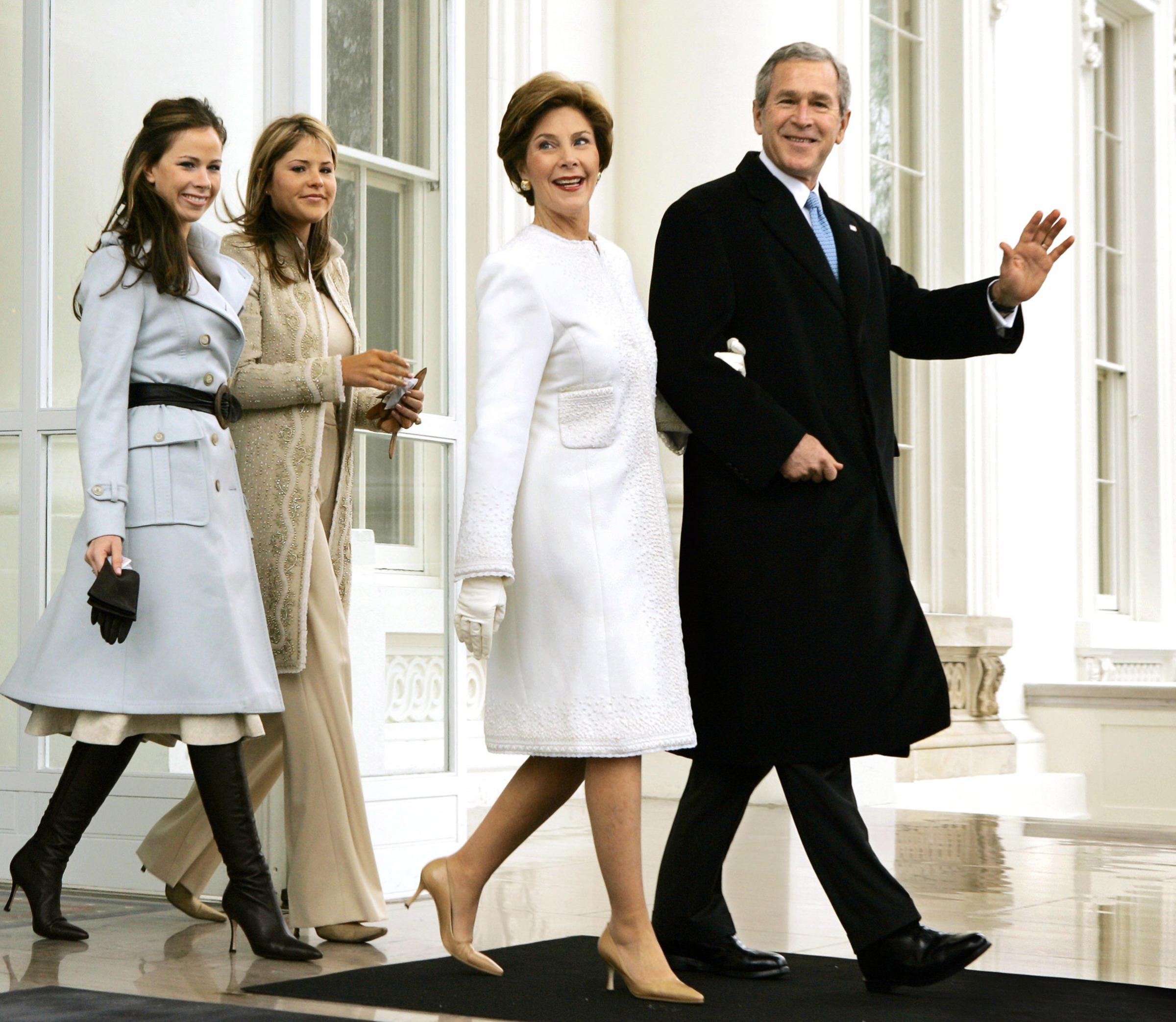
President: George W. Bush
Date: Jan. 20, 2005
What happened: One Inaugural party, the Texas State Society’s Black Tie & Boots Ball, featured live armadillos.
What he said: “For a half a century, America defended our own freedom by standing watch on distant borders. After the shipwreck of communism came years of relative quiet, years of repose, years of sabbatical, and then there came a day of fire. We have seen our vulnerability, and we have seen its deepest source.”
2009
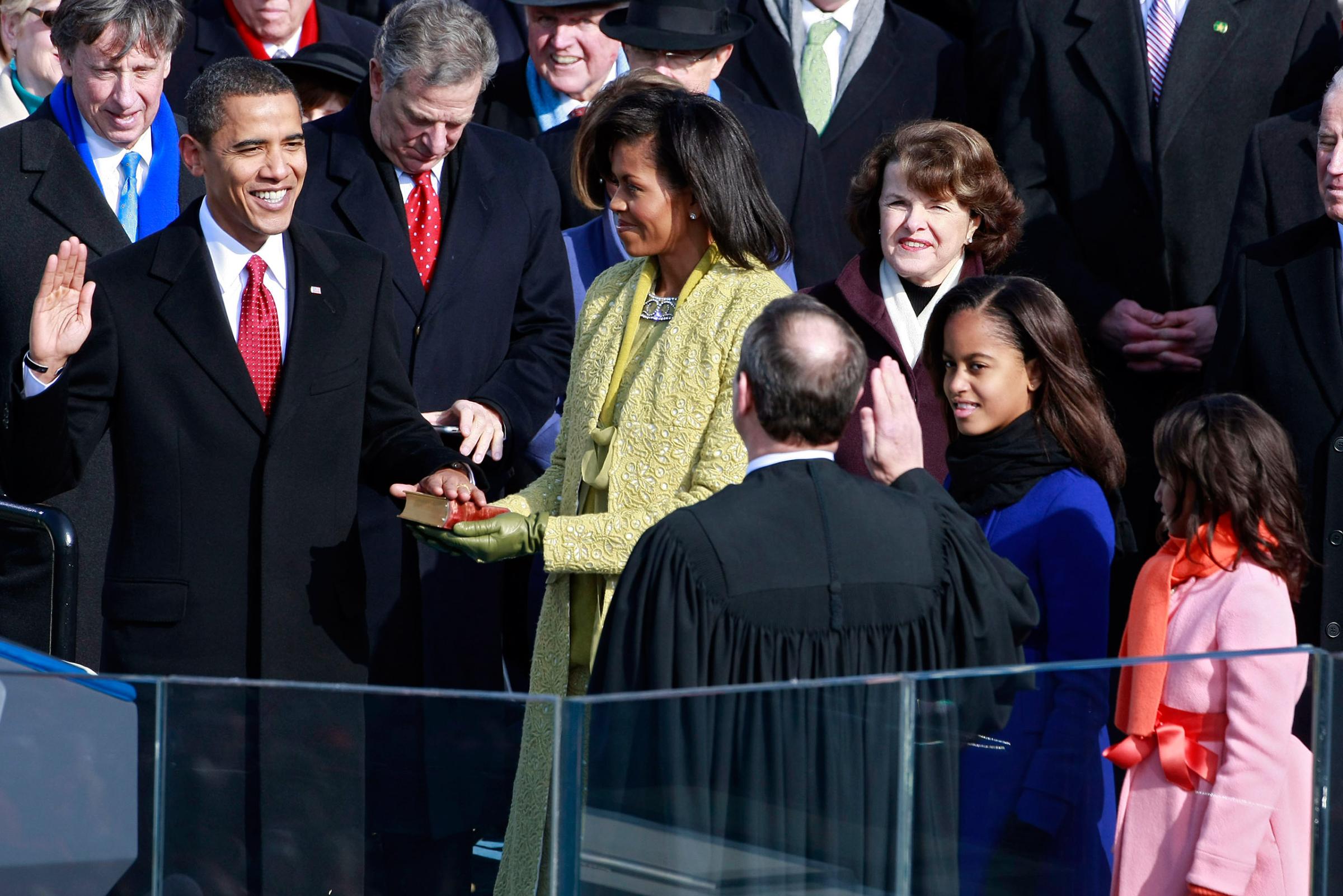
President: Barack Obama
Date: Jan. 20, 2009
What happened: After Chief Justice John Roberts flubbed the oath of office, he and the President redid it the next day.
What he said: “For we know that our patchwork heritage is a strength, not a weakness. We are a nation of Christians and Muslims, Jews and Hindus and nonbelievers. We are shaped by every language and culture, drawn from every end of this Earth. And because we have tasted the bitter swill of civil war and segregation and emerged from that dark chapter stronger and more united, we cannot help but believe that the old hatreds shall someday pass, that the lines of tribe shall soon dissolve; that as the world grows smaller, our common humanity shall reveal itself, and that America must play its role in ushering in a new era of peace.”
2013
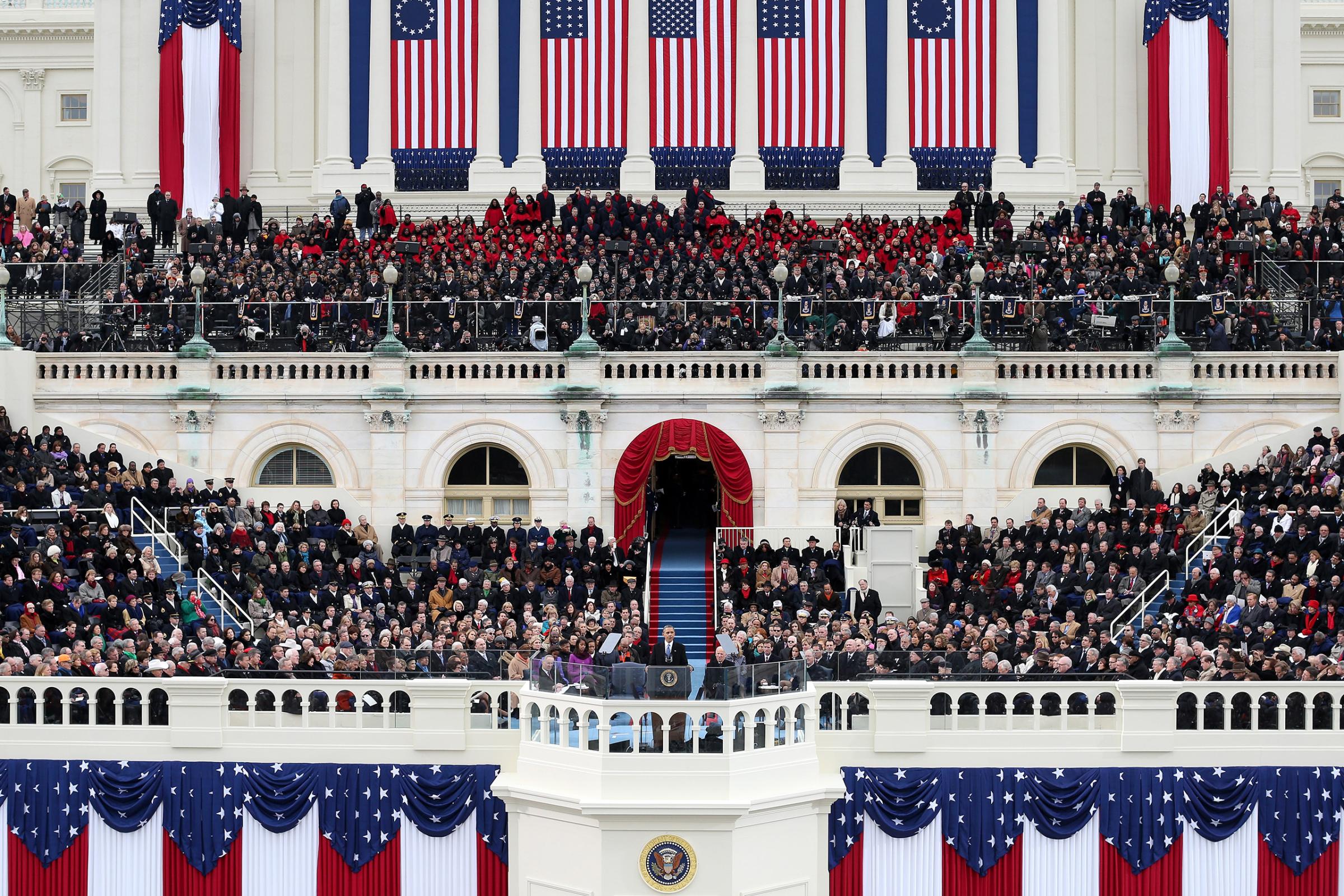
President: Barack Obama
Date: Jan. 21, 2013
What happened: On his way out of the 2013 ceremony, Obama turned around to look at the crowd, saying “I’m not going to see this again”—creating a viral Inaugural moment.
What he said: “Let us, each of us, now embrace with solemn duty and awesome joy what is our lasting birthright. With common effort and common purpose, with passion and dedication, let us answer the call of history and carry into an uncertain future that precious light of freedom.”
2017
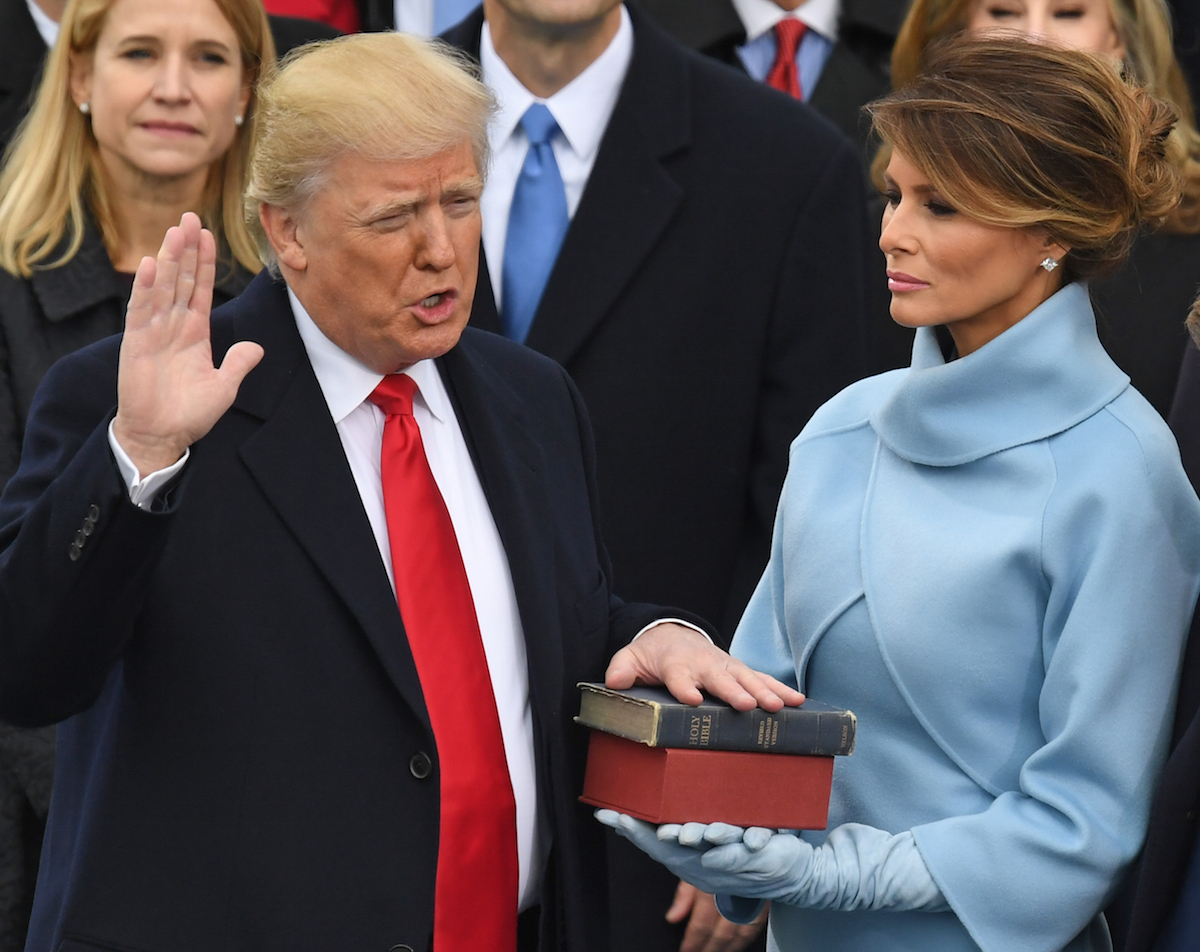
President: Donald Trump
Date: Jan. 20, 2017
What happened: In many places throughout D.C., Inauguration events were met with protest; Trump’s first actions in office included signing a proclamation calling for a National Day of Patriotism.
What he said: “We assembled here today are issuing a new decree to be heard in every city, in every foreign capital, and in every hall of power. From this day forward, a new vision will govern our land. From this day forward, it’s going to be only America first, America first.”
2021
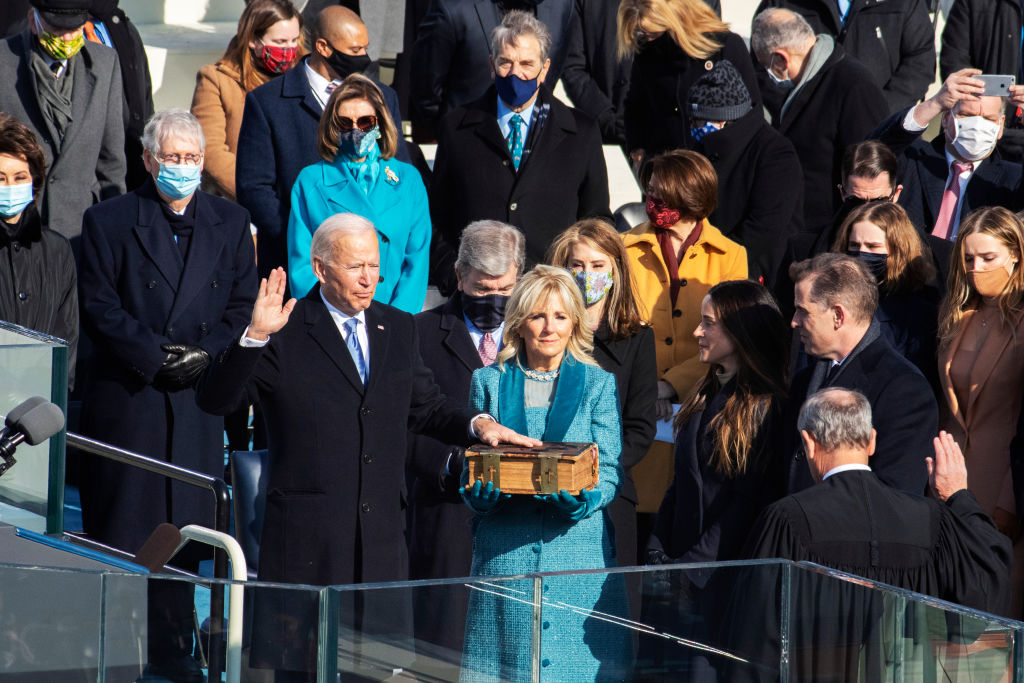
President: Joseph R. Biden, Jr.
Date: Jan. 20, 2021
What happened: The nation’s capital was on high alert after a violent insurrection on Capitol Hill on Jan. 6 and attendance was limited due to the COVID-19 pandemic, but the swearing-in of Biden and Kamala Harris as President and Vice President was peaceful. The first National Youth Poet Laureate Amanda Gorman, 22, moved the country by summing up Americans’ resilience in verse: “We’ve seen a force that would shatter our nation rather than share it / Would destroy our country if it meant delaying democracy. / And this effort very nearly succeeded. / But while democracy can be periodically delayed, / It can never be permanently defeated.”
What he said: “For all those who supported our campaign, I’m humbled by the faith you placed in us. To all those who did not support us, let me say this: Hear me out as we move forward. Take a measure of me and my heart. If you still disagree, so be it. That’s democracy. That’s America. The right to dissent peaceably within the guardrails of our republic is perhaps our nation’s greatest strength. Yet hear me clearly, disagreement must not lead to disunion.”
More Must-Reads from TIME
- Donald Trump Is TIME's 2024 Person of the Year
- Why We Chose Trump as Person of the Year
- Is Intermittent Fasting Good or Bad for You?
- The 100 Must-Read Books of 2024
- The 20 Best Christmas TV Episodes
- Column: If Optimism Feels Ridiculous Now, Try Hope
- The Future of Climate Action Is Trade Policy
- Merle Bombardieri Is Helping People Make the Baby Decision
Write to Lily Rothman at lily.rothman@time.com